Hisense U7Q is one of the most interesting Mini-LED TVs in its price segment, clearly demonstrating that Hisense is starting to make a mark in the market not only through the price-to-performance ratio but also through increasingly refined picture quality. Let's start with what truly impresses: the contrast and black levels are at a level that was recently unattainable in this price range. Combined with smooth tonal transitions, solid brightness, and a fast 144Hz panel, the U7Q becomes a TV that excels in both movies and gaming. Gamers will find almost everything they can expect here – support for variable refresh rate (VRR), automatic game mode (ALLM), very low input lag, and even 240Hz in Full HD. All of this makes the U7Q suitable for both next-gen consoles and PCs. However, there are some downsides. When it comes to HDR content, one might want to say: “untapped potential” – you may ask why? The TV, due to its algorithms, dims small bright elements or excessively boosts them, which can spoil the viewing experience. There is also a lack of support for HGiG, the feature that would better match the console with the TV regarding HDR. In summary, briefly – the Hisense U7Q is a very versatile and complete TV that has its imperfections but makes up for them in many key aspects. For gamers, occasional movie watchers, or anyone looking for good equipment for everyday use – it’s one of the most cost-effective options in 2025. You just need to know what compromises you’re willing to make – and then it’s hard to be disappointed.
- Matching (Score)
- Our verdict
- TV appearance
- Where to buy
- Contrast and black detail
- HDR effect quality
- Factory color reproduction
- Color reproduction after calibration
- Smoothness of tonal transitions
- Image scaling and smoothness of tonal transitions
- Blur and motion smoothness
- Console compatibility and gaming features
- Input lag
- Compatibility with PC
- Viewing angles
- TV efficiency during daytime
- Details about the matrix
- TV features
- Apps
- Playing files from USB
- Sound
Hisense U7Q vs Samsung Q7F
Direct compare
U7Q / U78Q
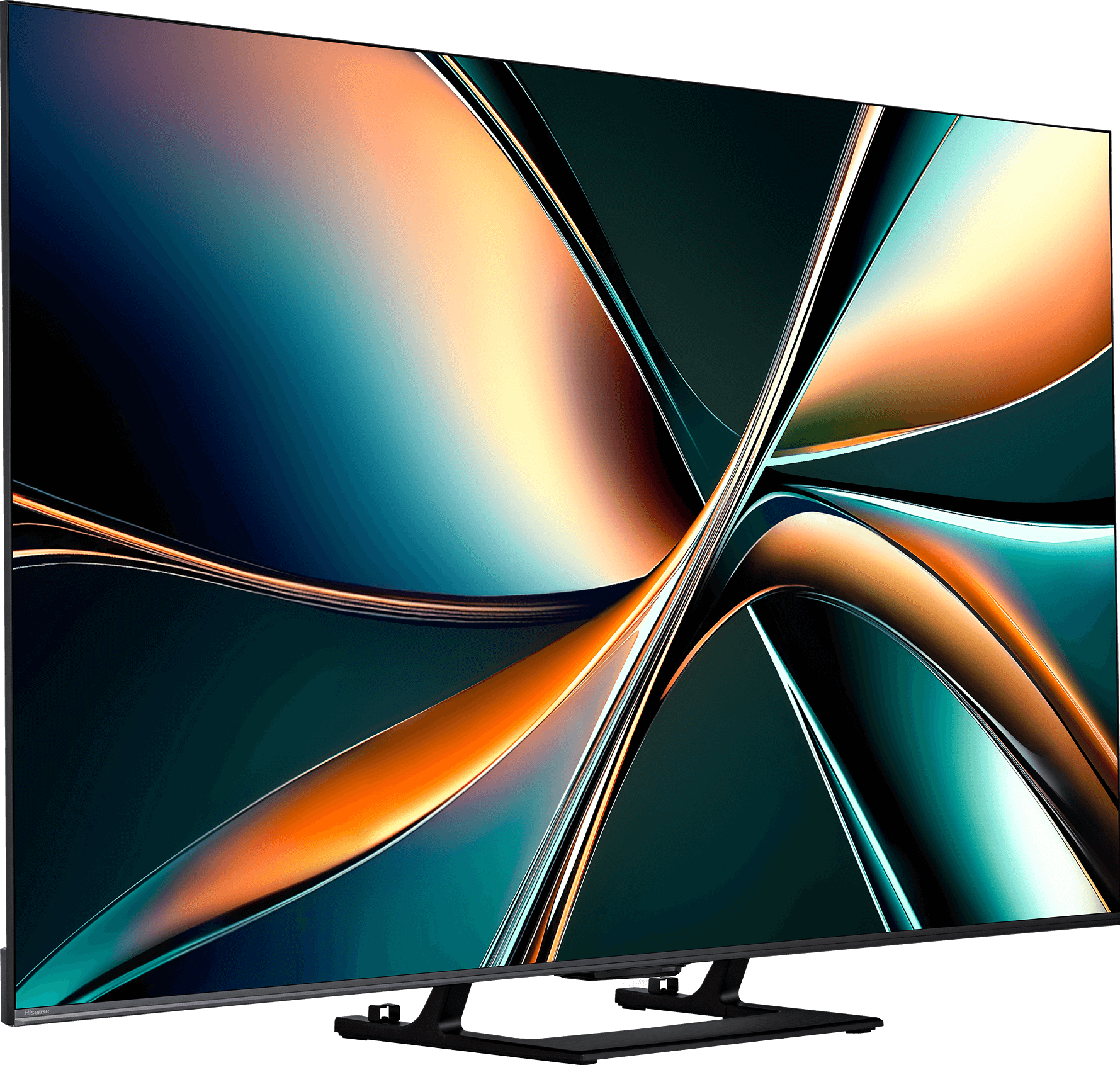
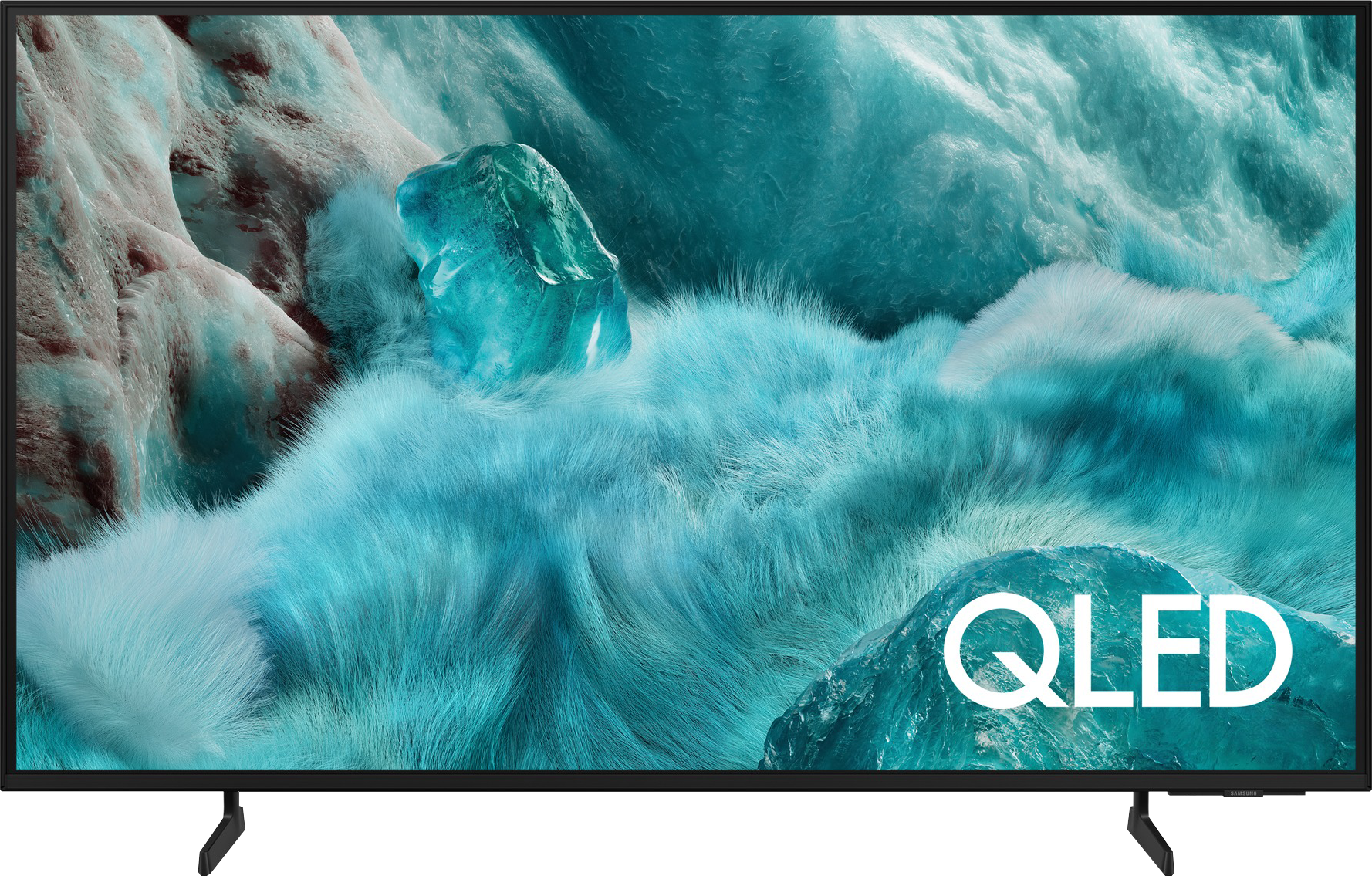
Panel type: LCD VA
Resolution: 3840x2160
System: VIDAA
Model year: 2025
Complete the survey to find out the result

Panel type: LCD VA
Resolution: 3840x2160
System: Tizen
Model year: 2025
Complete the survey to find out the result

Overall rating
7.2
5.7
Movies and series in UHD quality
6.7
5.7
Classic TV, YouTube
6.8
5.6
Sports broadcasts (TV and apps)
6.5
5.3
Gaming on console
8.0
6.3
TV as a computer monitor
8.6
6.0
Watching in bright light
6.2
3.9
Utility functions
8.9
6.6
Apps
7.7
8.7
Sound quality
7.2
5.8
Complete the survey to find out what fits your preferences
Advantages
Great contrast and deep black
Very good fluidity of tonal transitions (close to reference level)
High brightness
Supports 4K 144 Hz and even 240 Hz in Full HD
VRR, ALLM, G-SYNC – a full package for gamers
Low input lag
Pleasant sound with light bass
Many classic TV features built into the VIDAA system
Solid native contrast (VA Panel)
Vivid colours thanks to the QLED filter
Low input lag (around 10MS)
Robust and smooth Tizen operating system
Compact sleek design with Type C charging
Disadvantages
No support for HGiG (makes setting HDR on consoles difficult)
Brightness management issues
Poor viewing angles – typical for VA panels
Closed VIDAA system – missing some apps
Very low brightness (only 250 nits in HDR)
Lack of many gaming features including VRR and HGiG – the manufacturer promised something, but in the end, those features are simply not there
Lack of many classic "TV" features like USB recording or PIP
No Dolby Vision
Average digital image processing quality
Our verdict
Samsung Q7F is the cheapest model from the manufacturer in the QLED line, and it must be said that a few advantages can easily be pointed out here. After calibration, the colours look really good, and the additional QLED filter ensures that the hues are more saturated than in typical budget LCD televisions. Additionally, there’s a VA panel that offers quite decent native contrast. It’s certainly not on the level of top-tier models, but in everyday viewing, it does the job. However, the biggest plus is the Tizen system, Samsung’s flagship offering. It runs smoothly, is comprehensive, provides access to a plethora of applications and add-ons, and allows for easy integration of the television into the SmartThings ecosystem to control other devices in the home. And essentially, that’s where the list of positives ends, as the longer you use the Q7F, the more apparent it becomes that this is a product that is quite unfinished. It’s not just about the panel itself with its low brightness and mediocre image quality in HDR films, but also about the lack of features that usually worked flawlessly in Samsung devices. The manufacturer claims the presence of VRR and HGiG, but in practice, they are of no use, making it difficult to recommend the television even to casual gamers. For regular TV viewing, it doesn’t perform the best either because the digital image processing is at best average, and the feature for improving tonal transitions, which usually works well for Samsung, is practically ineffective here. The Q7F is a piece of equipment that can only be recommended to those looking for a television with two slogans on the box: “QLED” and “good Smart TV”. The rest get a rather bland product that lacks a lot to even compete with other more budget-friendly offerings. It’s a shame because usually, the term "QLED" in Samsung meant something more than just an ordinary television.
TV appearance
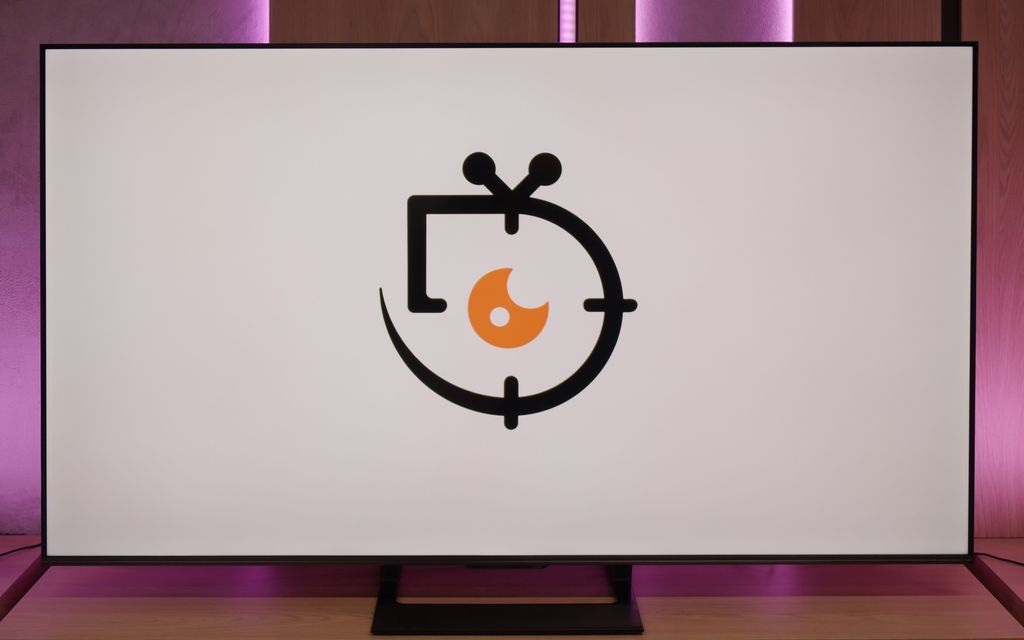
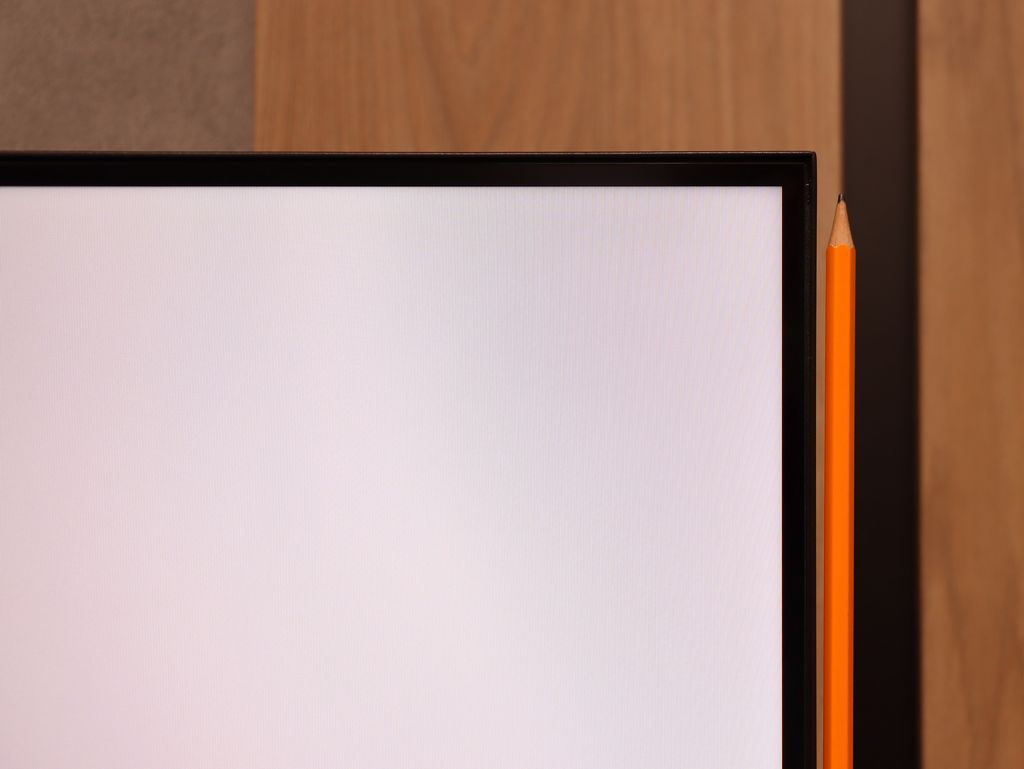
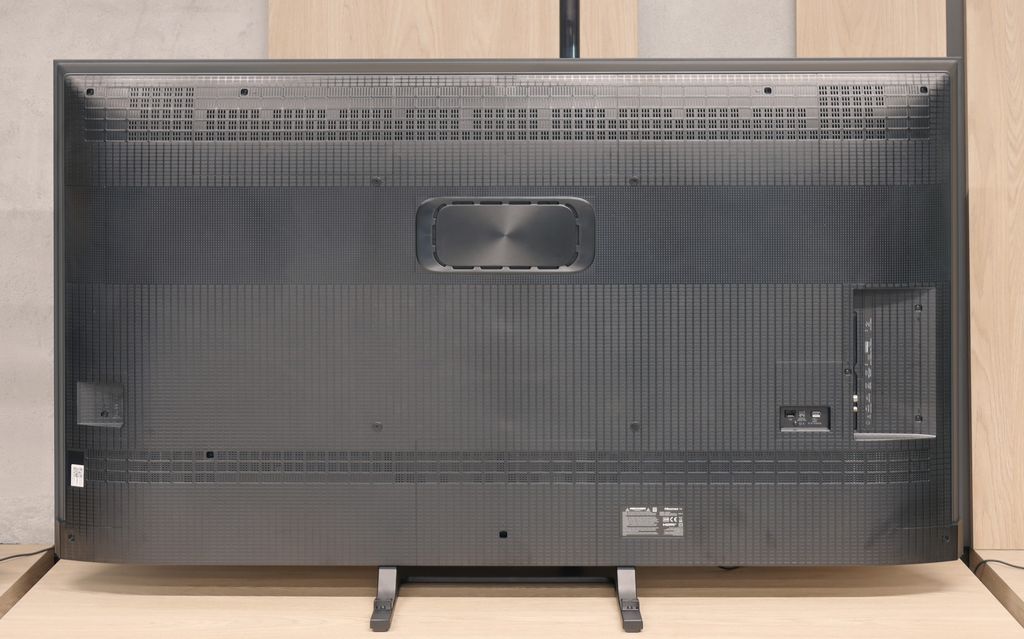
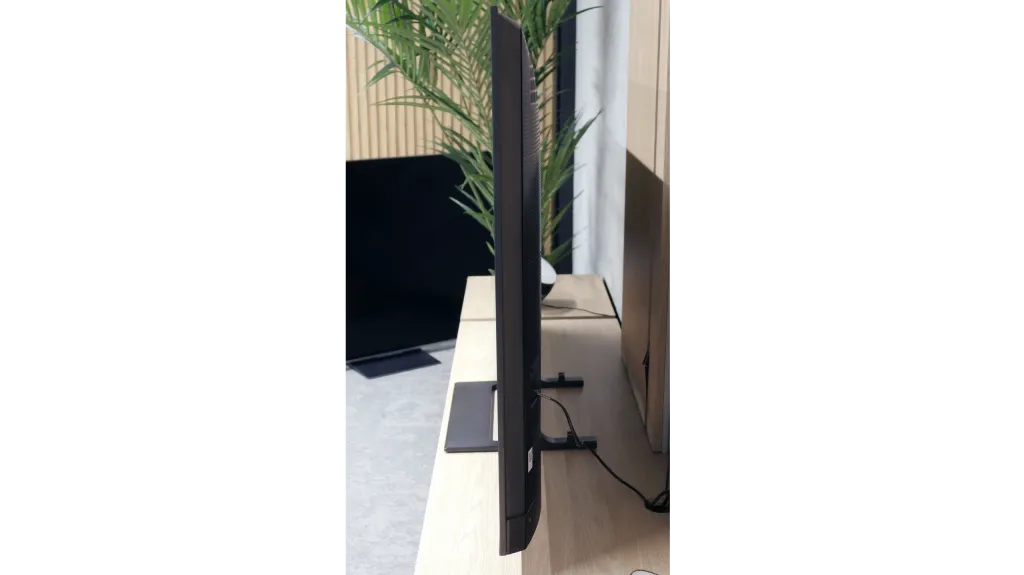
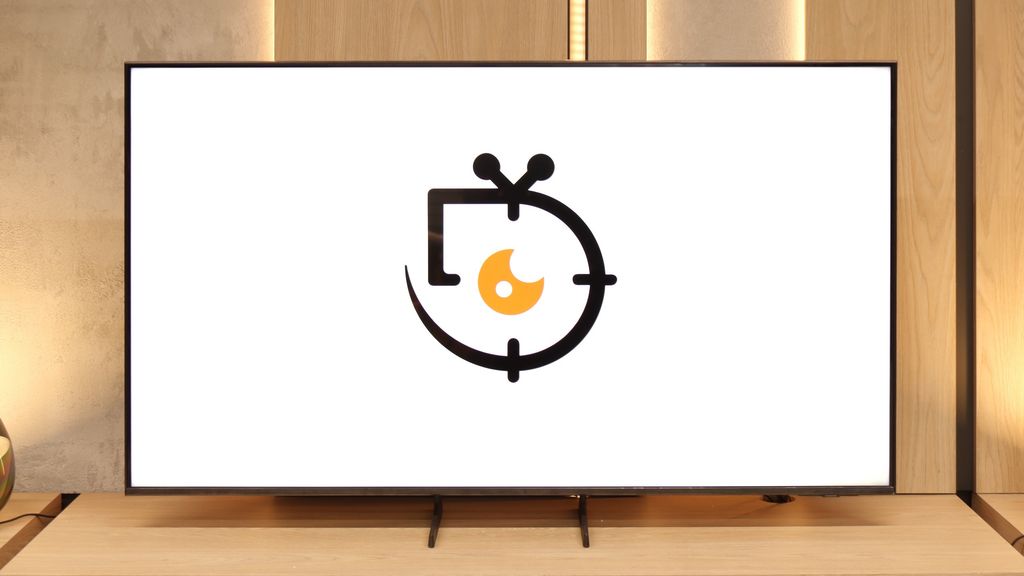
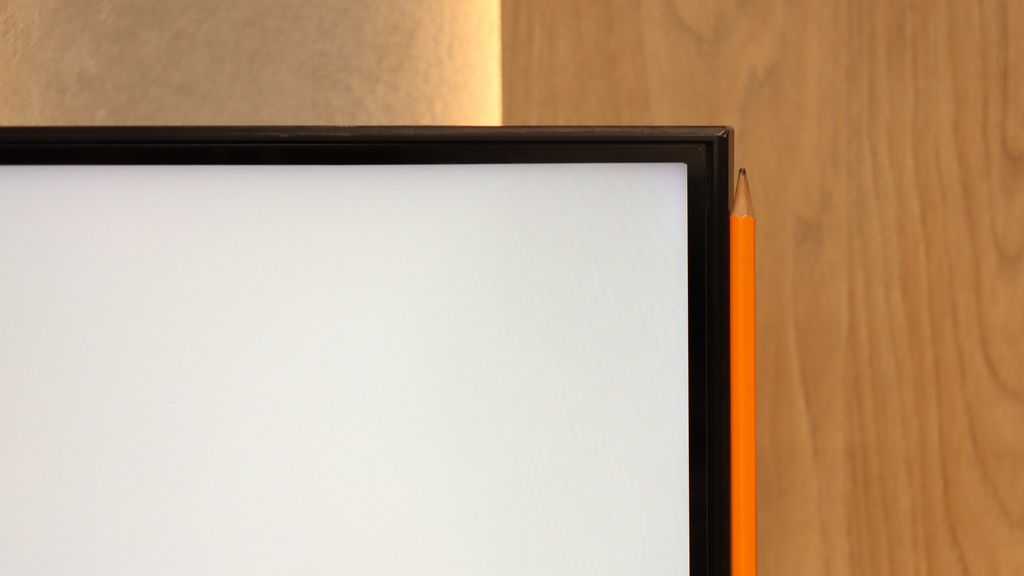
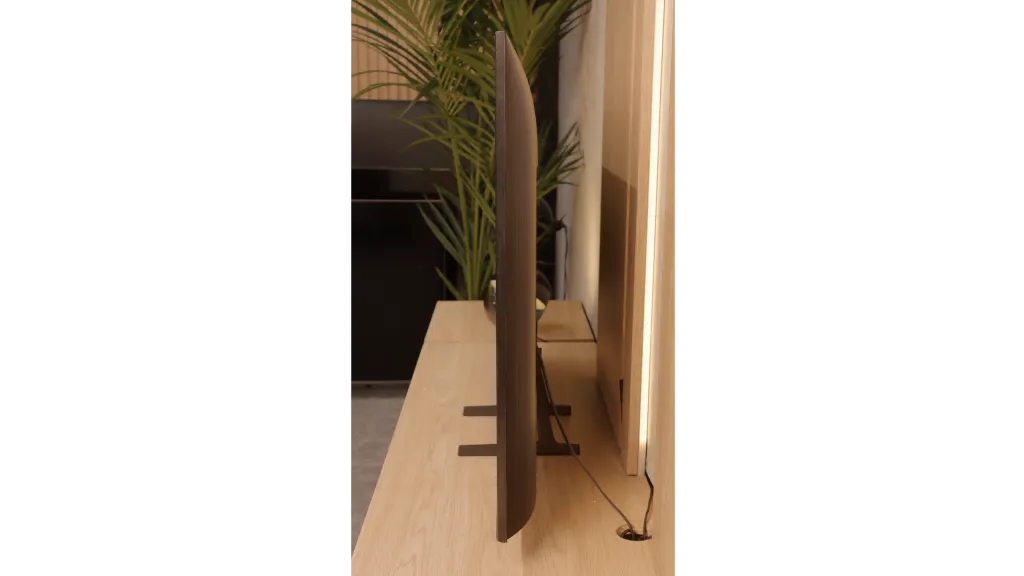
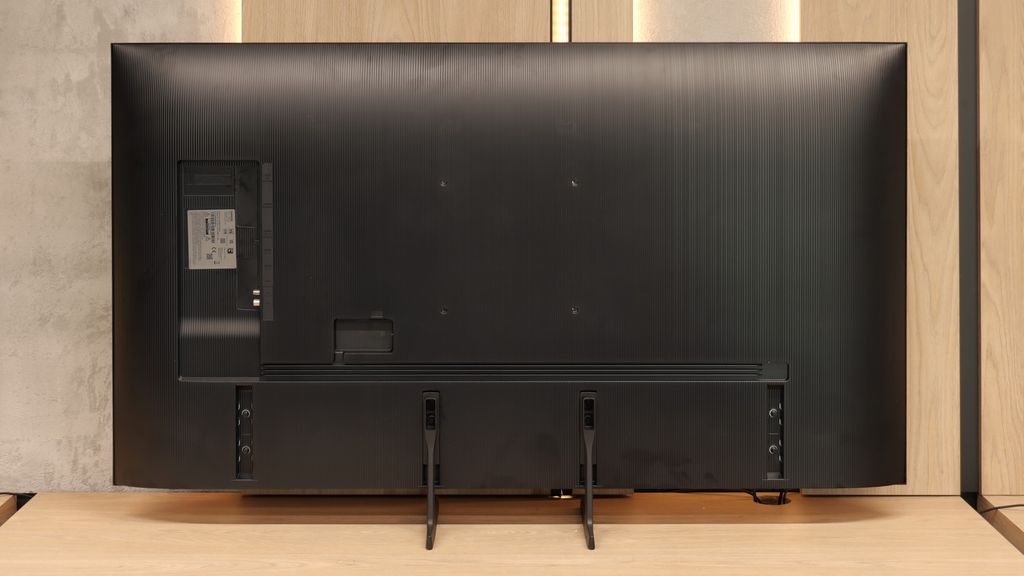
Contrast and black detail
7.5/10
4.7/10
Local dimming function: Yes, number of zones: 220 (10 x 22)
Local dimming function: No
Contrast:
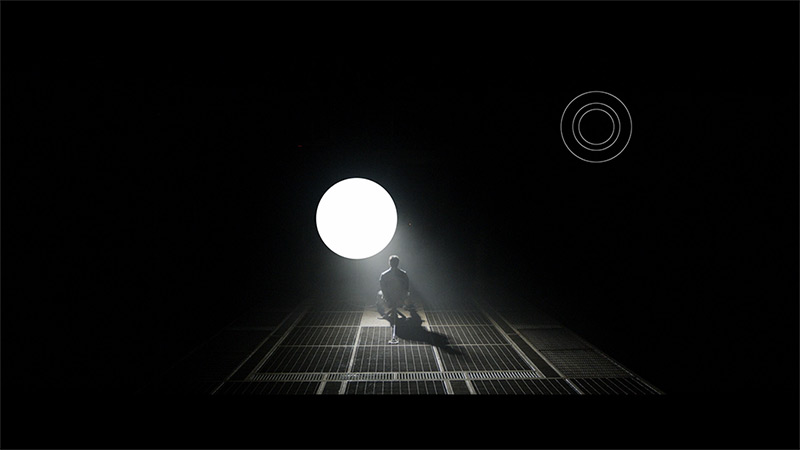
Result
278,000:1
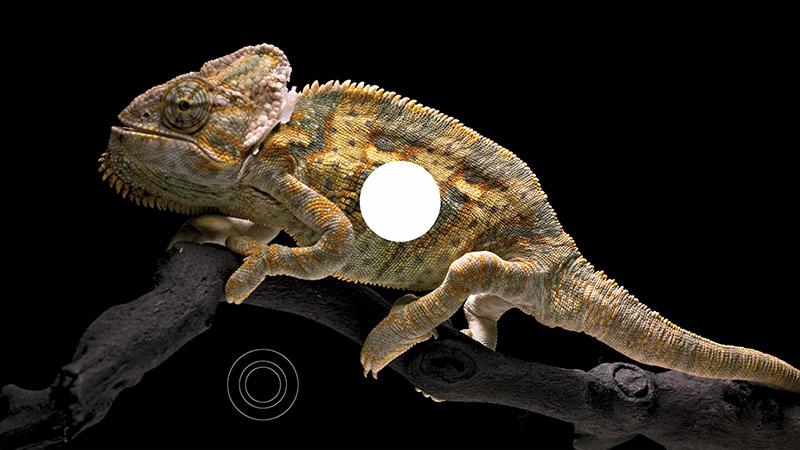
Result
28,800:1
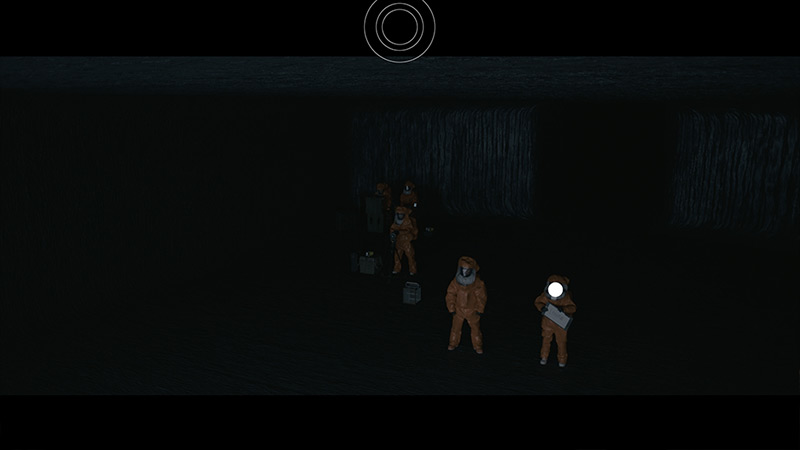
Result
11,100:1

Result
10,800:1
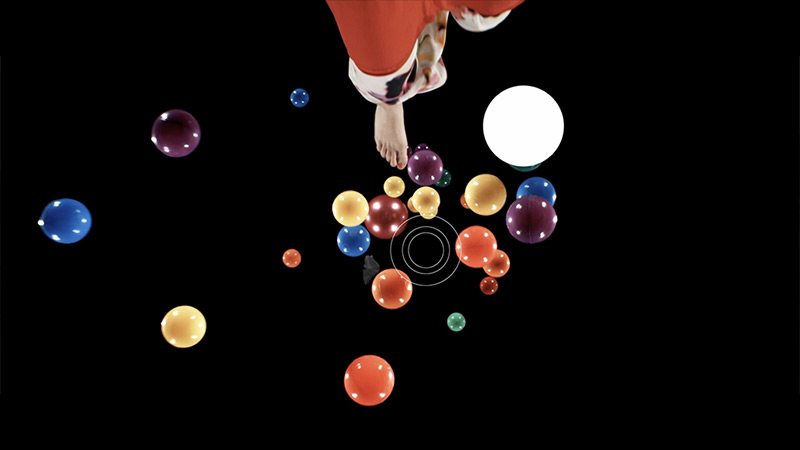
Result
6,250:1

Result
2,850:1

Result
2,750:1

Result
3,300:1

Result
3,050:1

Result
2,750:1
Halo effect and black detail visibility:
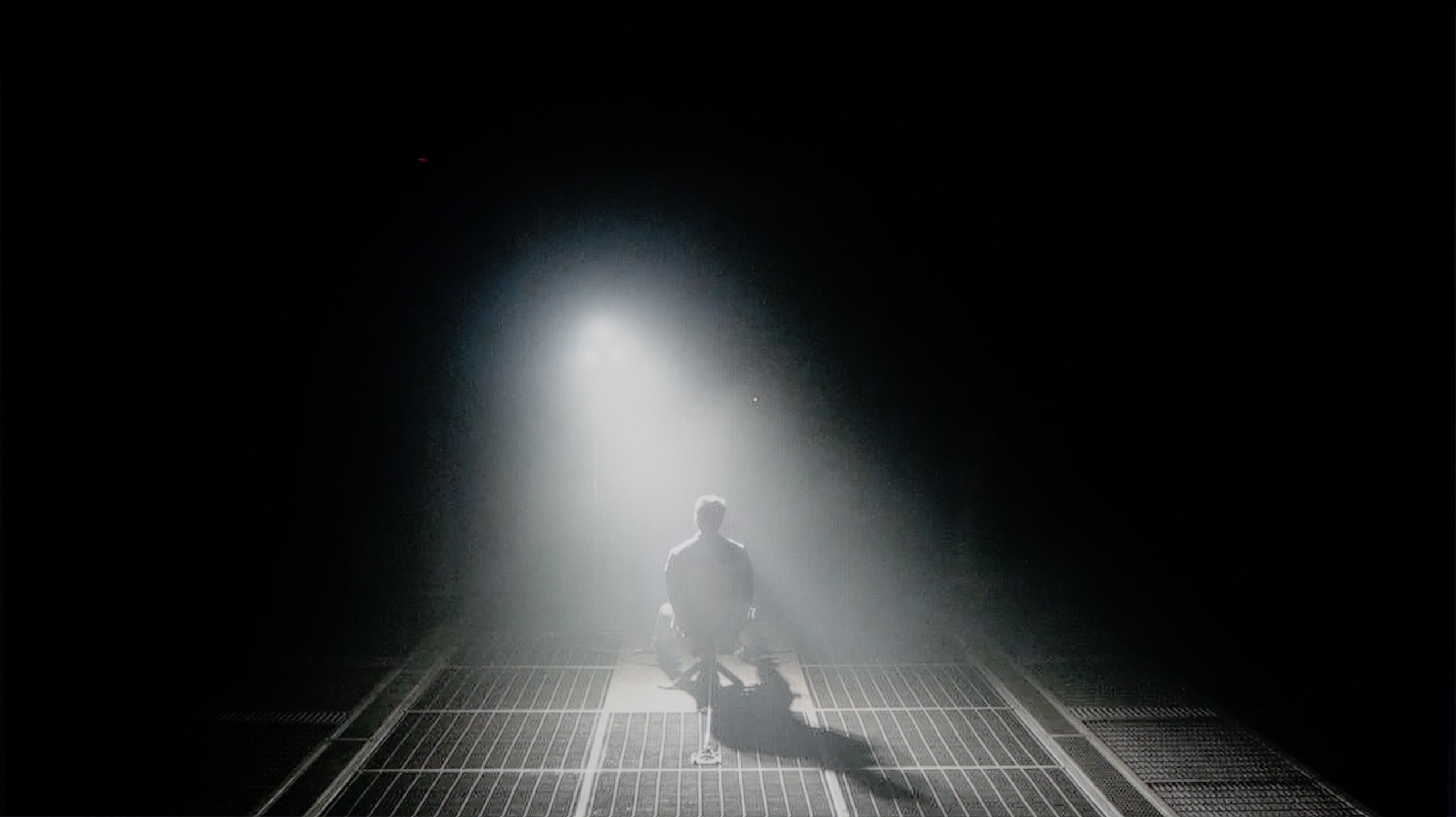
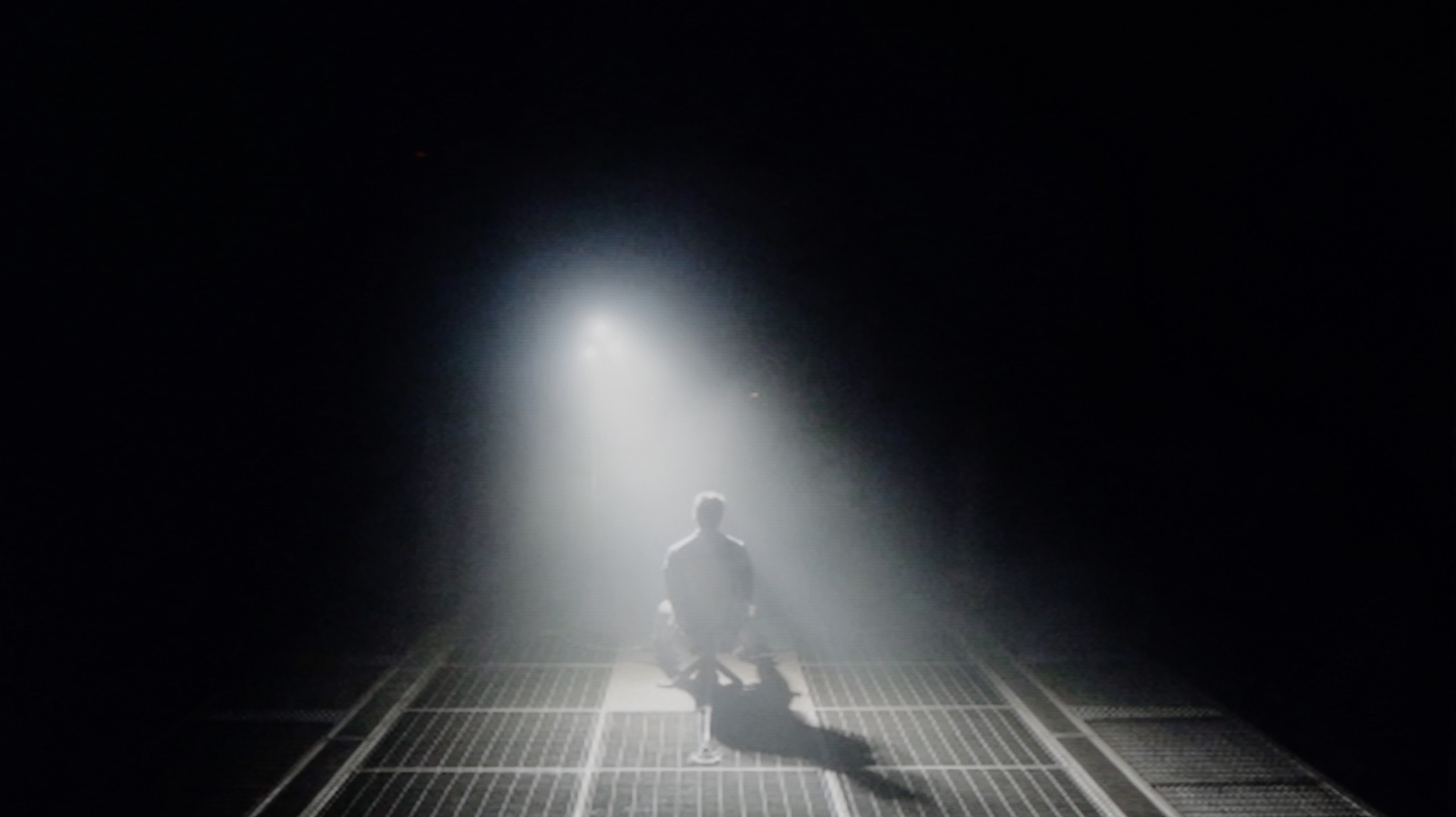
U7Q is a Mini-LED backlit TV – just like the PRO version. What’s the difference? The version without the suffix simply has fewer dimming zones. In our 65-inch model with a VA panel, we counted 220 of them. And while that doesn’t impress as much as in the U7Q PRO, it still looks very good on paper for this price range. Alright, but how does it perform in practice? Surprisingly well. The contrast in the U7Q can reach up to 300,000:1, which provides a really solid black effect. In many scenes, it’s hard to find fault – the image has depth, and the highlights are well separated. Of course, Mini-LED is not OLED – so there are some limitations. In very challenging scenes with many dark details, the TV sometimes either ‘eats’ them, leaving a nice black, or slightly brightens the background, which can create a halo effect. That’s normal in this technology and should be taken into account. Despite these minor drawbacks – the contrast in the U7Q is really good.
The Samsung Q7F in the 55-inch size we tested has a VA panel, which immediately translates to decent native contrast. Values around 3000:1 may not be record-breaking, as we know that VA panels are currently being produced with more than double the contrast, but it still performs much better than IPS or ADS panels, where black quickly turns into shades of grey or navy blue. Unfortunately, we won't find typical local dimming zones here, but the manufacturer has added something like global dimming – that is, dimming the whole screen relative to the content. The effect? In most scenes, black looks quite solid, although during nighttime viewing, we will still see that it resembles a dark navy or grey more than true pitch black. Overall, it's alright, but without any fireworks – it's not spectacular, but there's also no drama.
HDR effect quality
4.6/10
3.7/10
Luminance measurements in HDR:

Result
521 nit
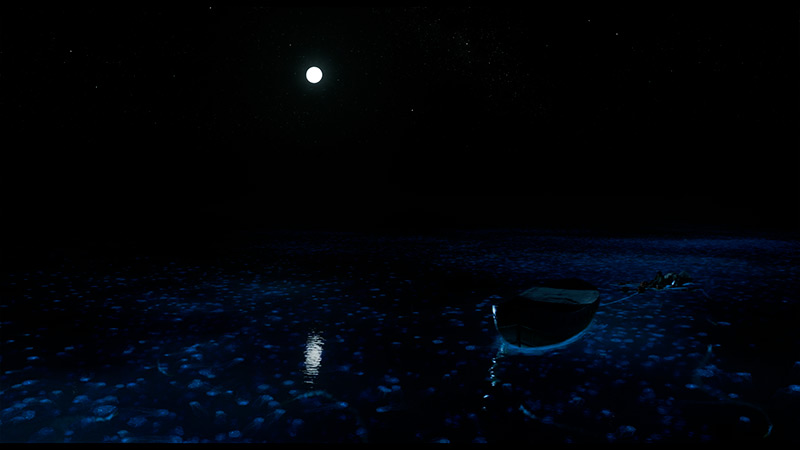
Result
160 nit
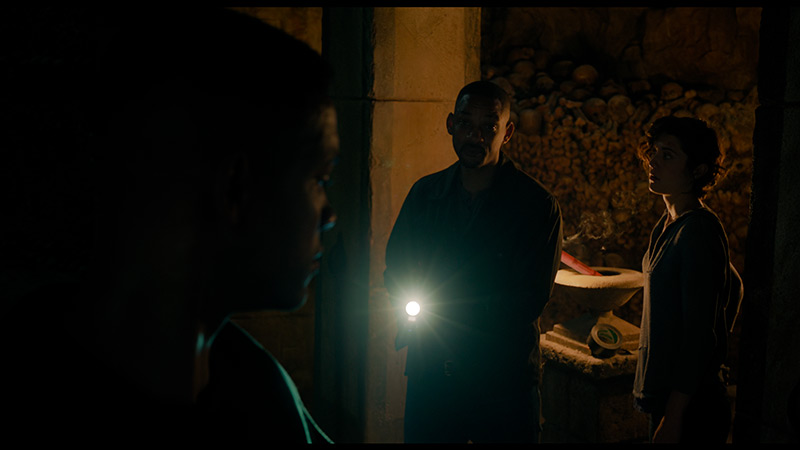
Result
351 nit

Result
98 nit

Result
674 nit

Result
215 nit

Result
225 nit

Result
267 nit

Result
113 nit

Result
250 nit
Scene from the movie “Pan” (about 2800 nits)


Scene from the movie “Billy Lynn” (about 1100 nits)


Static HDR10


Dynamic: Dolby Vision
Dynamic: HDR10+


HDR luminance chart:
Samsung Q7F
HDR luminance
Hisense U7Q
HDR luminance
Since the algorithms responsible for blacks are performing quite well, we expected a similarly good outcome when it comes to brightness and overall HDR quality. Unfortunately, we have to disappoint you a bit here.
The U7Q is quite a bright television – under the best conditions, it can reach around 800 nits, which indeed impresses in some scenes, especially in scenes like those from the movie The Meg. Bright segments can shine, and the HDR effect is noticeable. The problem arises when very small, bright elements appear on a dark background – for example, in Sicario 2 or in the second scene from Life of Pi. At such moments, the dimming algorithms operate too aggressively. Yes, the blacks look great at that point, but the brightest spots can almost completely disappear, causing the HDR effect to vanish and details to be barely visible. That’s just the charm of this technology in this price segment.
As a consolation, it is worth mentioning that the U7Q is marketed as a QLED (in practice, a PFS layer is used, which operates very similarly), and it can indeed display a wide colour gamut – a DCI-P3 coverage of around 94% is a very good result for this class.
Unfortunately, the Samsung Q7F is not one of the bright televisions, which directly impacts the quality of HDR films. The peak brightness of the panel is only around 250 nits, which is definitely insufficient for claiming a true cinematic experience. In practice, the HDR content does not differ significantly from classic SDR, making it difficult to talk about any "wow effect" that usually accompanies us when watching such films. During testing of film scenes, the image simply looked dark, and the brightness almost always hovered around the aforementioned 250 nits. The worst performance came from shots with small, intensely glowing elements – the global dimming technique used reacted very aggressively in those cases, dimming the entire screen to maintain the black effect. However, it is worth noting the presence of a QLED coating that broadens the colour spectrum. For a budget QLED model, the Q7F performs quite decently here: the DCI-P3 colour gamut coverage is around 93%, and BT.2020 reaches 70%. This means that despite the low brightness, the colours can still look quite vivid and attractive.
Factory color reproduction
6.3/10
5/10
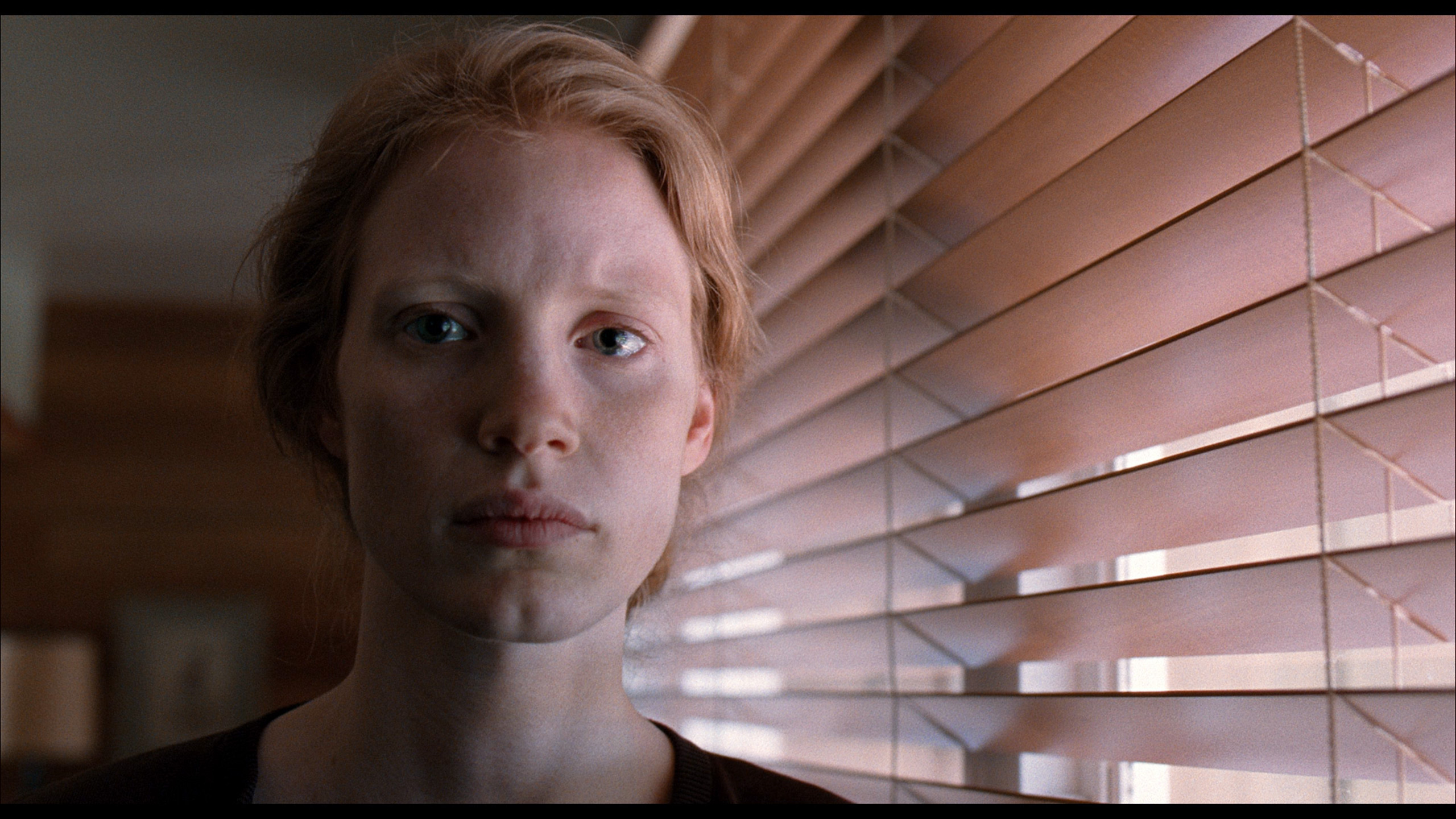
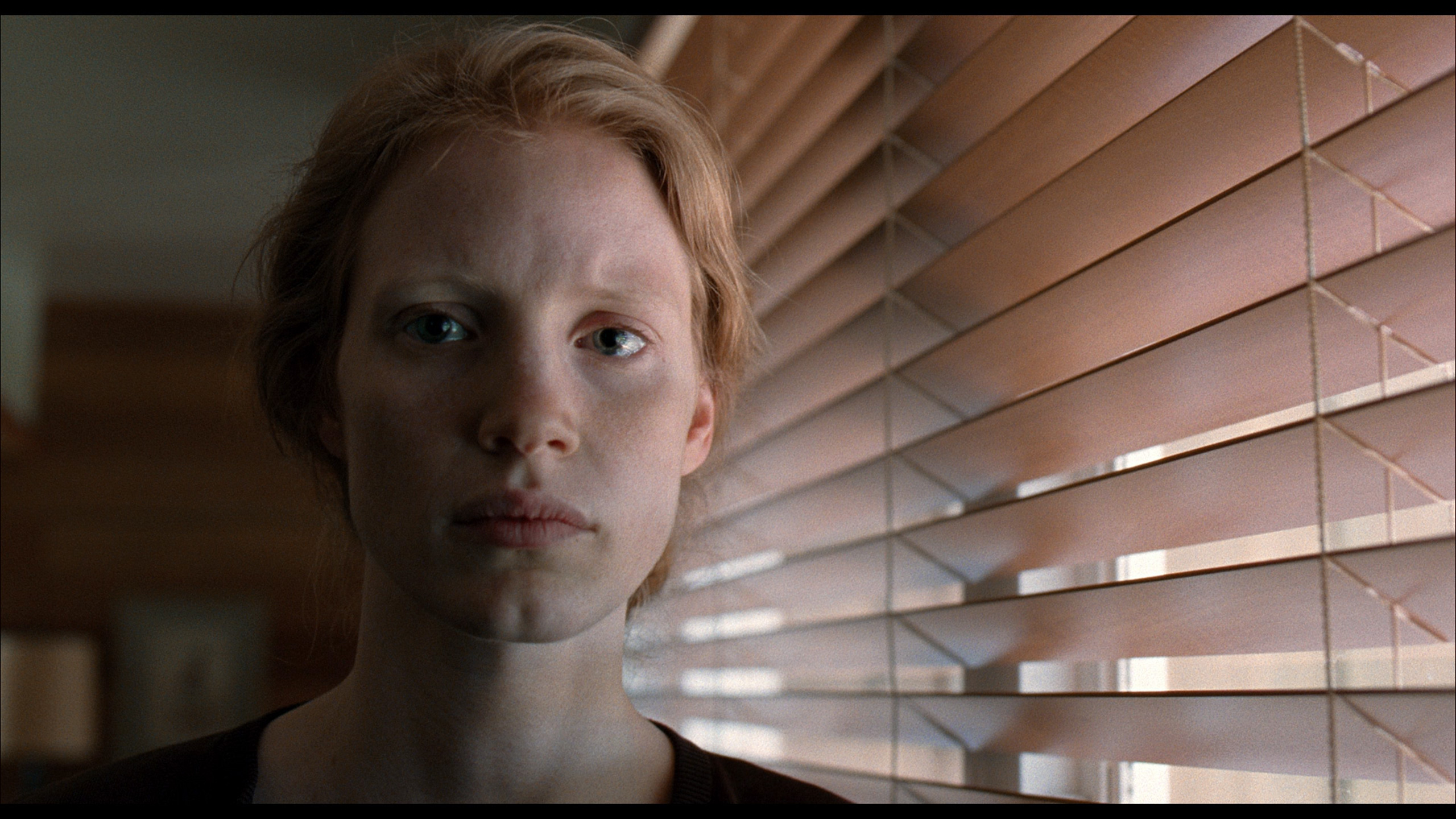
Factory Mode
After calibration


Factory Mode
After calibration
We tested the U7Q in the best possible picture mode, which is Filmmaker Mode. This mode is supposed to provide the most "cinematic" experience that aligns with the creators' intentions – straight out of the box. Unfortunately… even this professionally sounding name doesn’t guarantee a perfect image.
In our unit, the problem lay in the poorly set white balance. In both HD and 4K content, the image had too much blue and red, resulting in a slightly pinkish hue on the screen. It didn’t look terrible, but it was noticeable – especially in bright scenes and on white backgrounds. That alone could have been forgiven, but the biggest issue is managing brightness in HDR content. The EOTF curve from the measurements confirms what we saw earlier during scene tests: the television can overly dim the smallest bright elements, causing them to nearly disappear, or conversely – excessively brighten the brightest parts, which affects the naturalness of the image.
The reproduction of factory colours in the Samsung Q7F is definitely not one of its strong points. In Filmmaker mode, which theoretically should be closest to neutral, the white balance issue is immediately noticeable. There’s too much red on the screen, while blue is lacking. The effects are very easy to notice – white, instead of being neutral, takes on warm, almost slightly orange tones. In the long run, this makes the entire image appear a bit unnatural, while bright areas of the scene can seem unrealistic. The problems are even more evident in HDR content. The charts show that the TV has significant errors in the Color Checker palette, which results in visible inaccuracies in the real image. In practice, this means that colours are not presented as they should be. The Q7F also heavily manipulates brightness; darker elements are overly boosted, causing them to lose their cinematic feel, while bright parts can be dimmed. This makes the image seem flattened, and contrast, instead of helping to bring out details, only highlights its own limitations. In HDR materials, this is particularly frustrating because every detail matters. In scenes where a subtle play of light and shadow should be felt, the Q7F either overdoes the lighting or, conversely, suppresses elements that should attract the eye. This causes the image to lose its depth, and instead of cinematic realism, we have a rather simplified effect.
Color reproduction after calibration
7.4/10
7.6/10
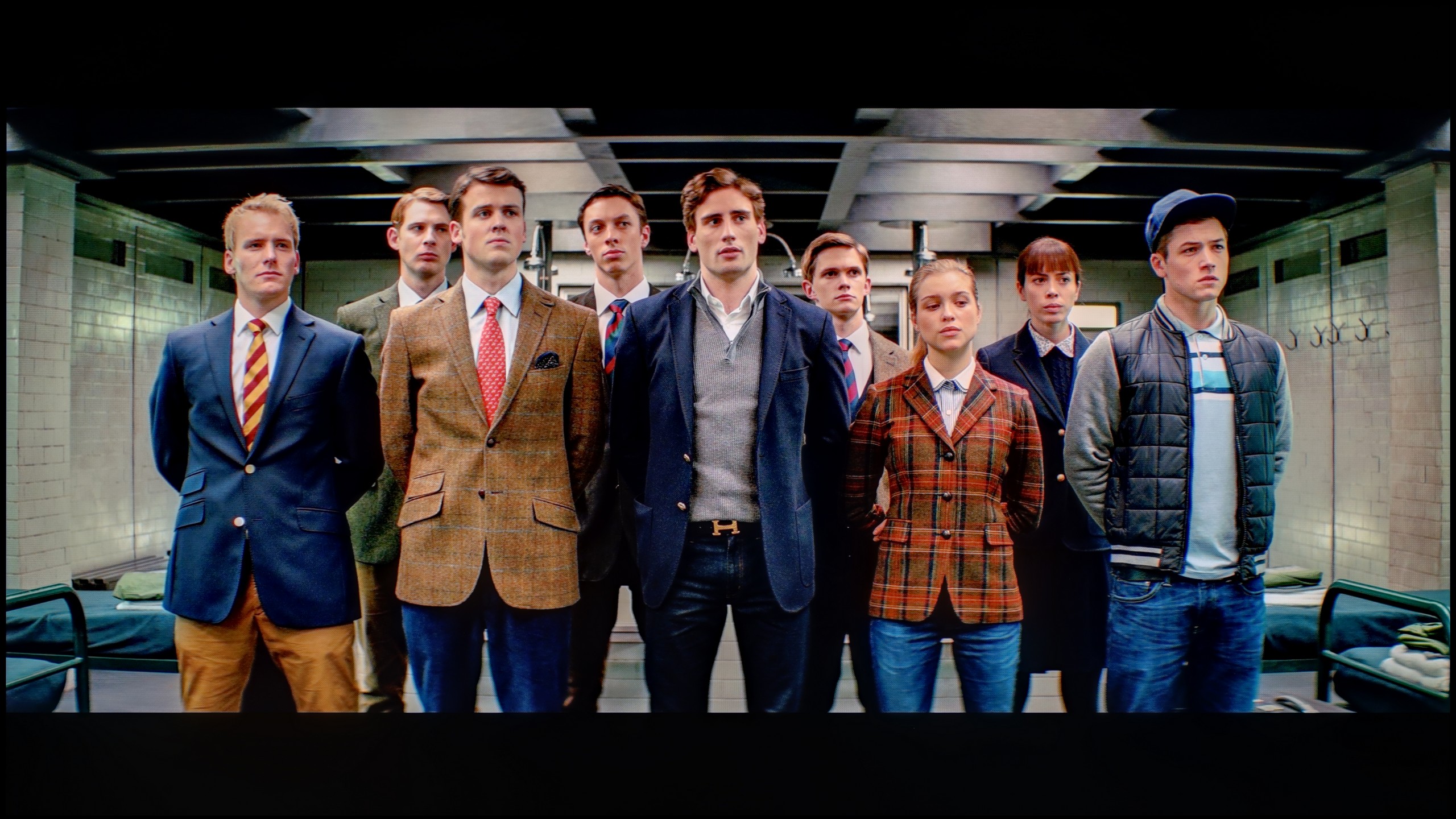
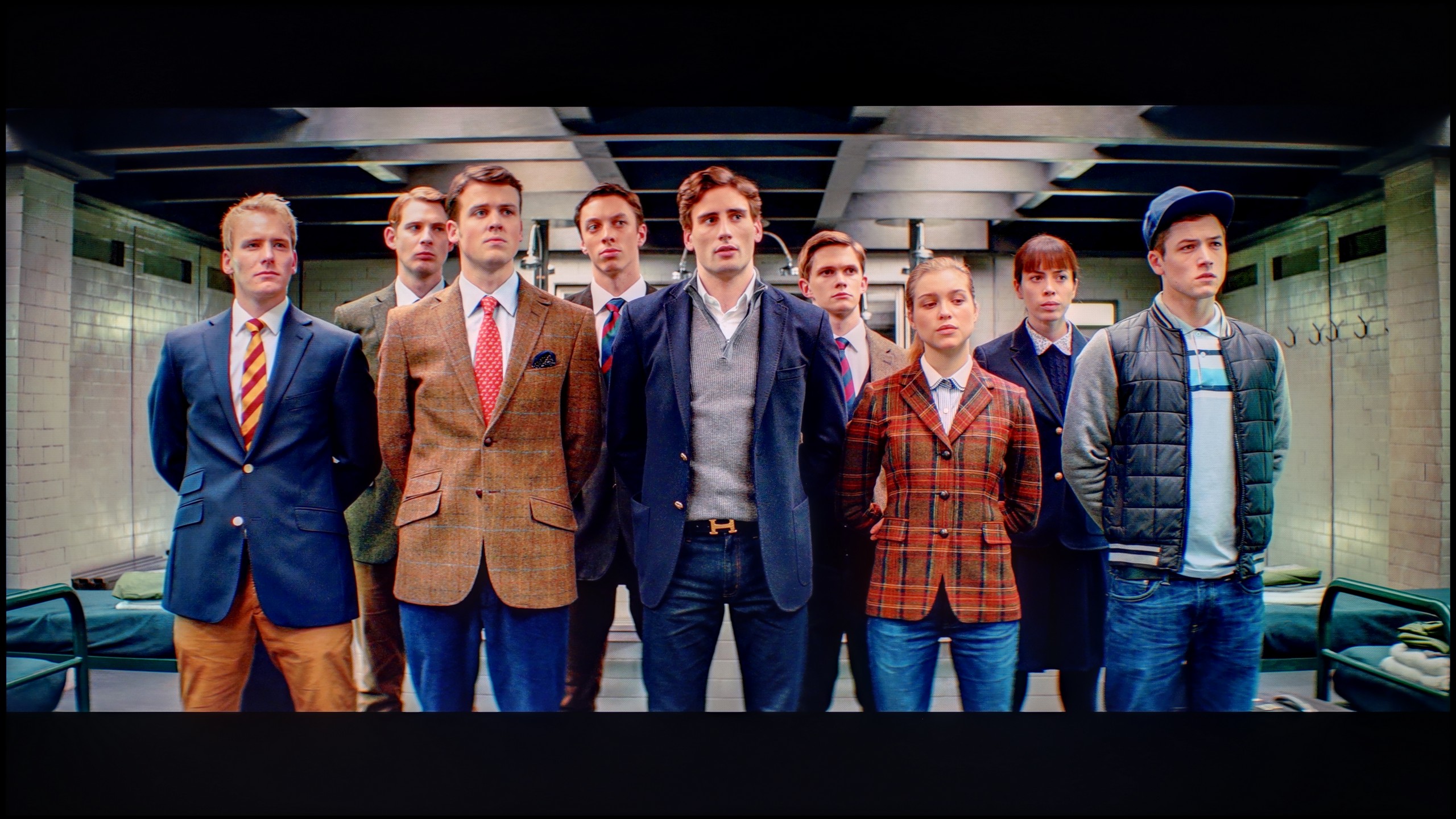


Thanks to specialist tools, we managed to correct the colour quality in SDR content to almost perfection. In materials with lower dynamics, delta E errors dropped below 0.5, which can be considered an almost reference result. The picture on television, YouTube, or classic Full HD looks really good after calibration. Well then – but where was it not so easy to improve the image? Primarily it concerns HDR quality content. Although we managed to somewhat "tame" the white balance and eliminate pink tints in most scenes, unfortunately, we did not have full control over brightness management. We set the local dimming settings according to the best observations – SDR: Medium, HDR: High – but the U7Q still did everything a bit its own way. There were still cases of overly strong dimming or brightening of details that calibration simply could not eliminate. And although the overall reception of content is much better, one must reckon that the U7Q will always have something to say at the end with "but".
After professional calibration, we managed to bring the Q7F to order – at least in terms of SDR content. The image in this mode looks really good: the white balance has been set correctly, the colours appear natural, and the errors in the colour palette have dropped to levels practically invisible to the eye. Gamma behaves exemplary, and the only minor flaw remains a slight lightening of smaller elements, which stems from the lack of local dimming. For everyday watching of television or films in standard quality, the Q7F performs surprisingly well.
It was significantly more challenging to tame HDR content. Despite adjusting the white balance, the television still heavily manipulates brightness, causing scenes to appear unnatural – what was meant to be subtly darker can sometimes be overly bright, and the bright parts of the image can occasionally be dimmed. The final effect is better than in factory settings, but it’s clear that the construction limitations of the Q7F do not allow for fully utilising the potential of HDR materials.
Smoothness of tonal transitions
9.9/10
9/10




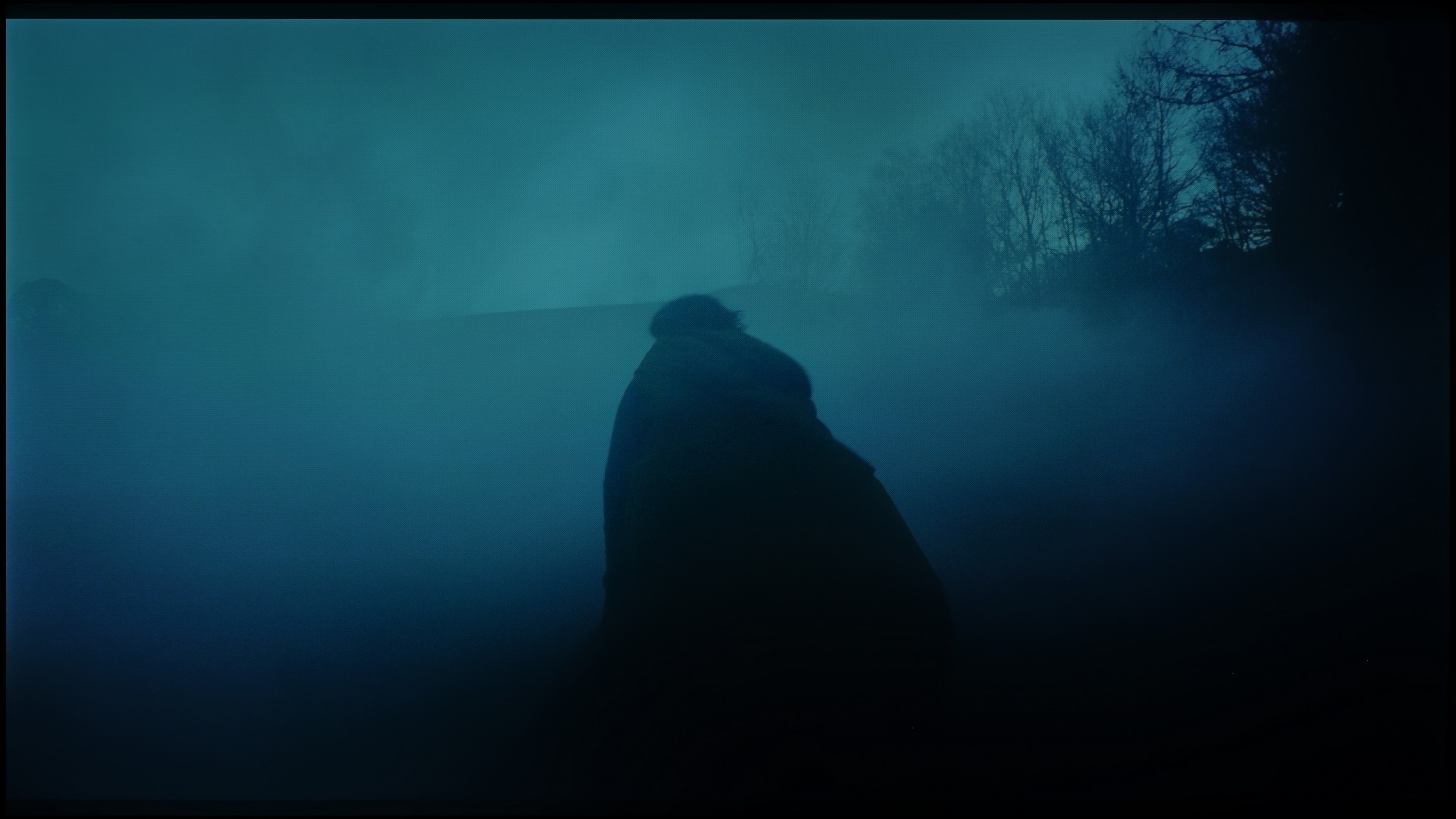
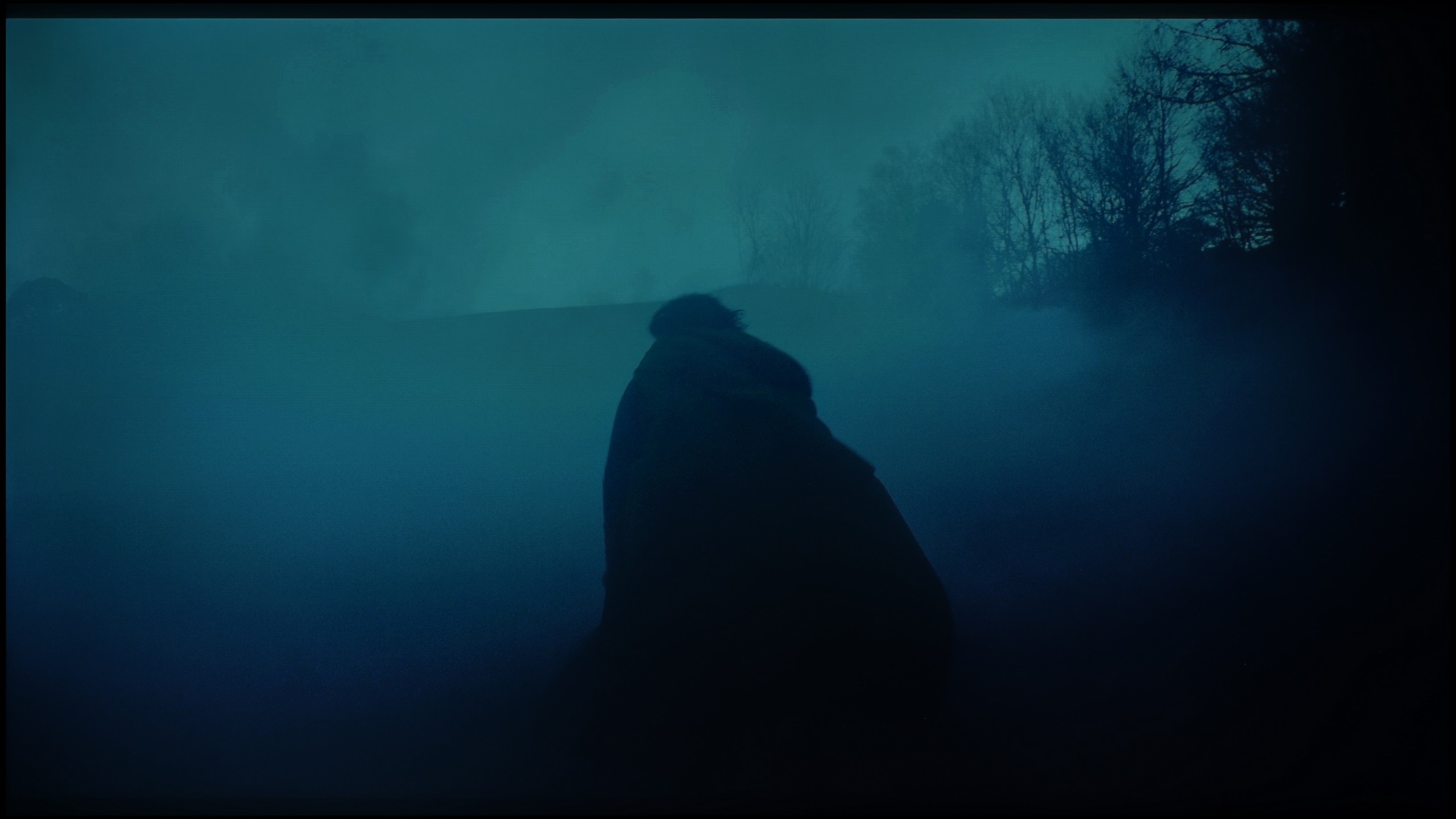
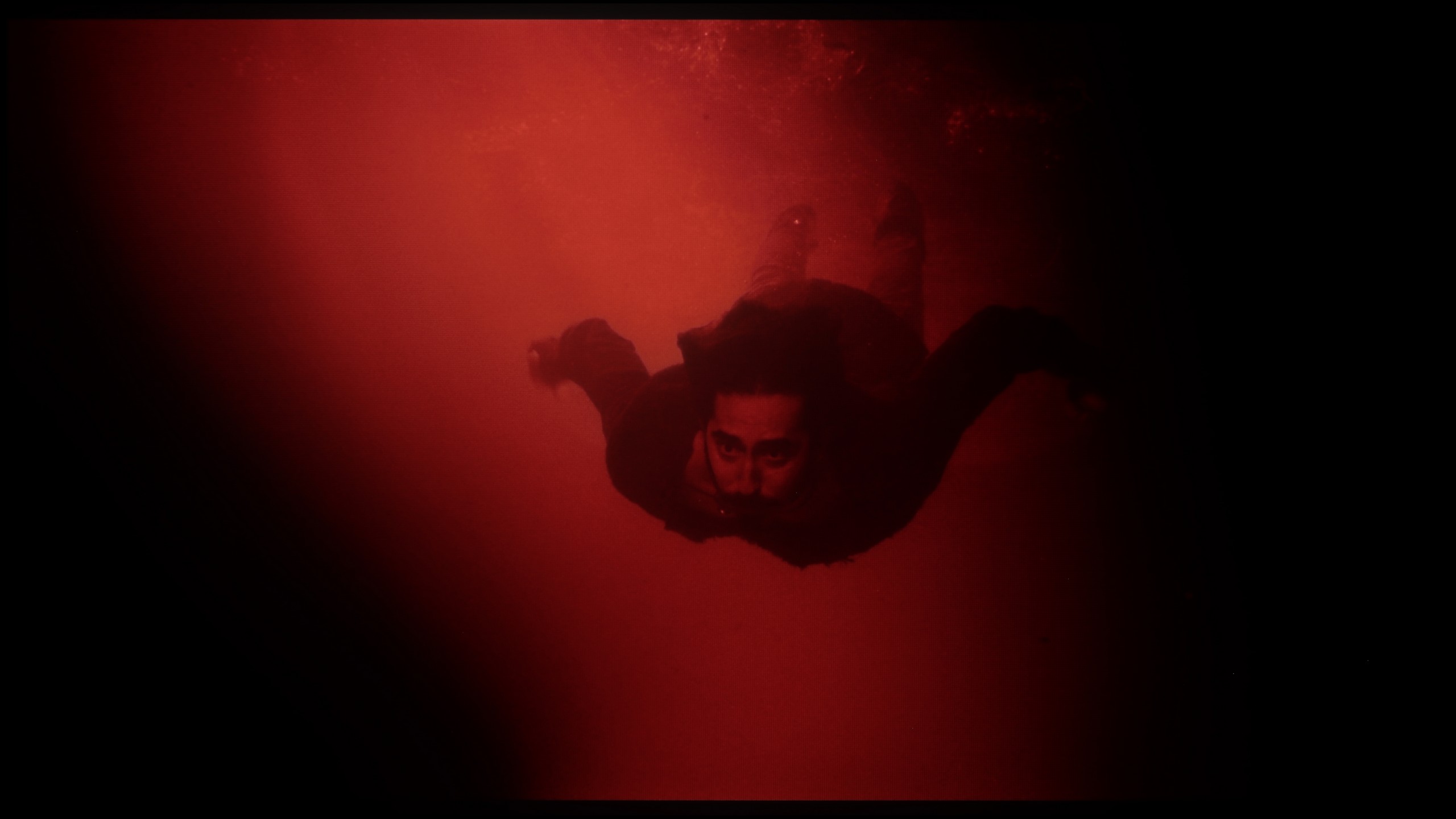
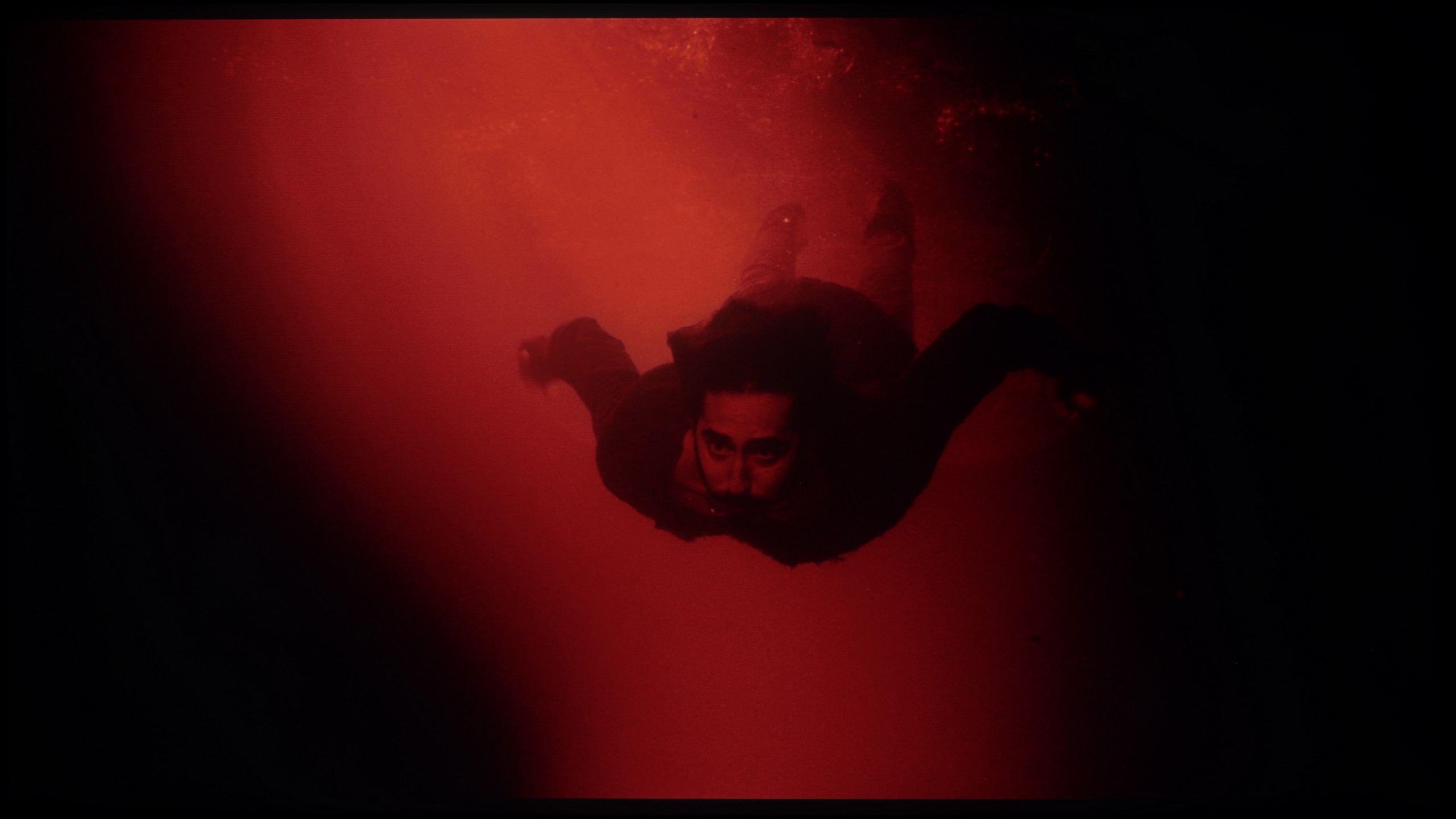




U7Q performs exceptionally when it comes to tonal transitions – we can confidently say that it’s nearly at a reference level, which is why this television receives one of the highest possible ratings from us in this category. The colour blends are smooth, clear, without any noticeable banding. In most scenes, everything looks just perfect, and any minor imperfections may only appear in very specific shots – though we hardly noticed them during testing.
The fluidity of tonal transitions in the Q7F is really quite good. The gradients are smooth, without harsh steps or artificial divisions that can be quite noticeable in cheaper TVs. Even in more challenging scenes, like the one from The Revenant or the red shot with the actor swimming in water, the picture maintained its quality and simply looked good. If someone is looking very closely, they might notice slight imperfections in extremely demanding moments, but they are subtle enough that most people won’t even notice them. Given this price range, the Q7F performs surprisingly well in terms of gradation, and it's hard to find anything serious to complain about.
Image scaling and smoothness of tonal transitions
6/10
4.5/10
Smooth transition function
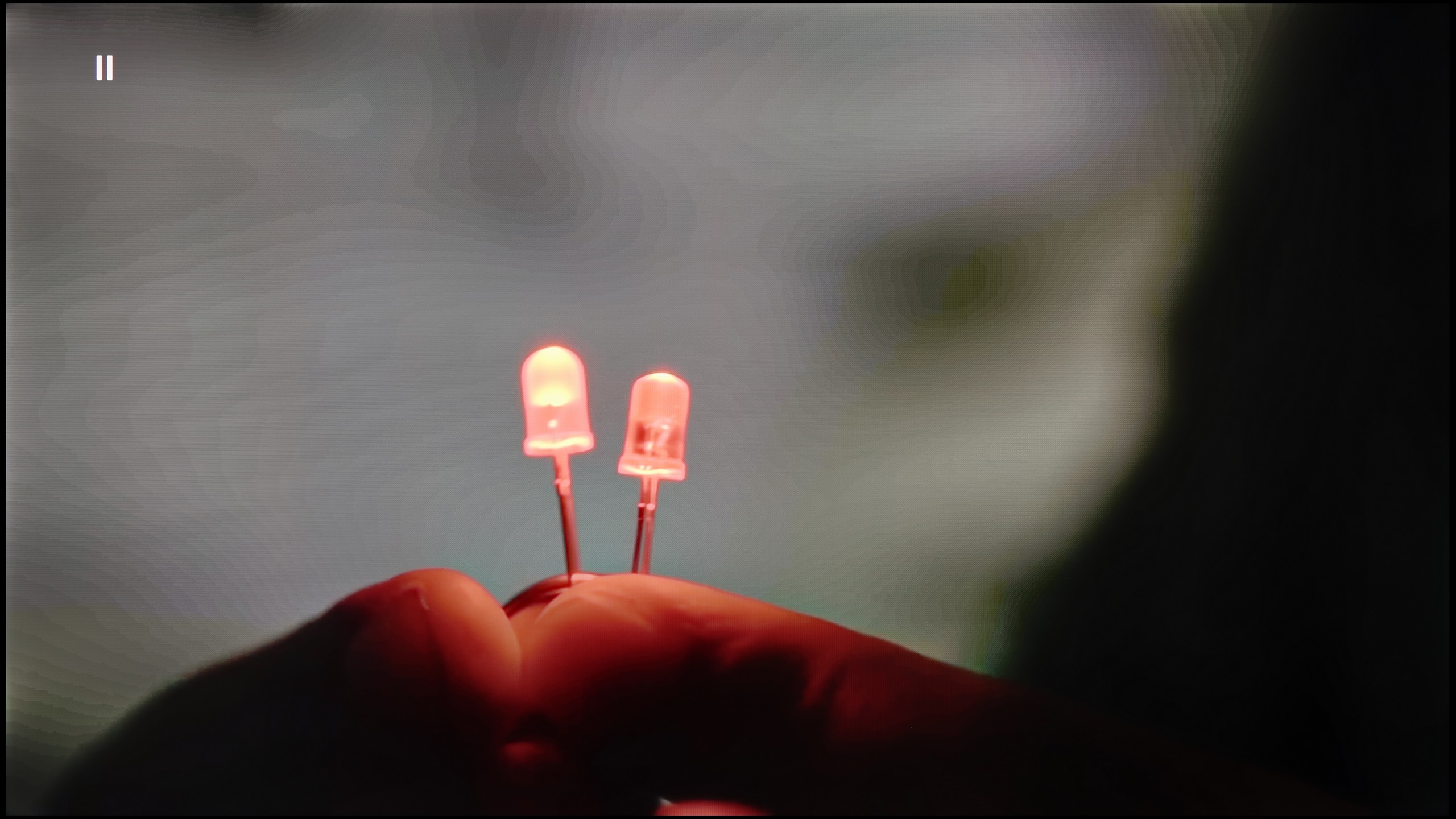
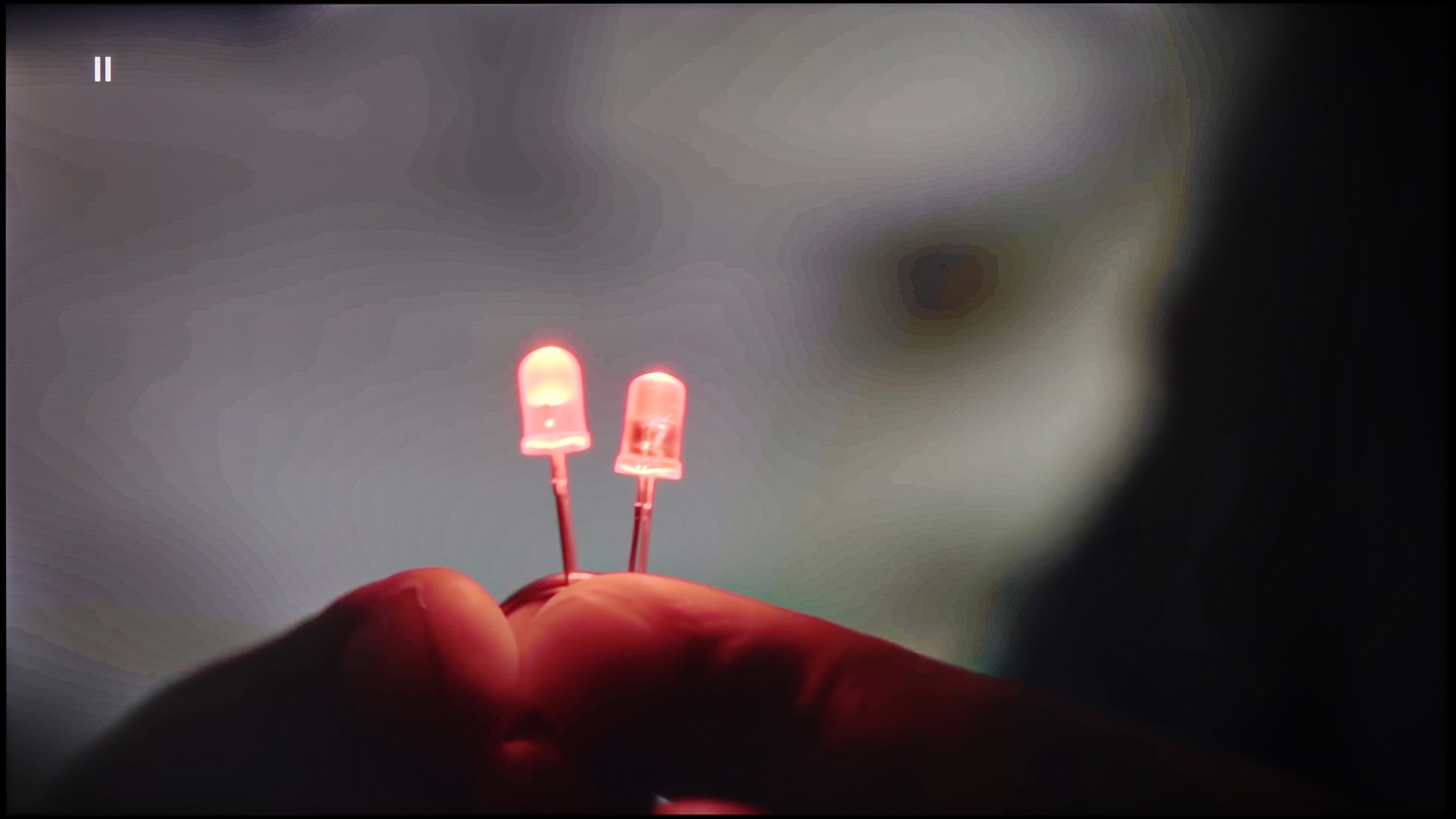
Image without overscan on the SD signal


There are situations where we would like to smooth out tonal transitions a bit, especially in older materials – those with limited source quality. The U7Q has been equipped with a feature called “Smooth and Gradient Image,” but unfortunately… it works very poorly. In the “Low” option, the effects are practically unnoticeable, and other settings smooth out the details but don’t improve tonal transitions. The only positive thing is that the feature doesn’t interfere with the film grain, so it doesn’t ruin the natural structure of the image.
Fortunately, content scaling performs quite well. The image is not overly sharpened, there is no artificial clarity – and while it’s known that this isn’t the level of high-end TVs, the U7Q has no problem displaying really old content in a completely acceptable manner.
Upscaling and digital image processing in the Q7F is a bit of a rollercoaster. On one hand, we have really nice upscaling – weaker sources look better than you might expect. The image becomes clearer, sharper, and even older films or free-to-air TV hold up well. Samsung has been strong in this area for years, and the Q7F confirms that. On the other hand… things start to get tricky. The TV has a problem with overscan – part of the image is simply cut off, and it doesn't look very elegant. Additionally, we were let down by a feature called "noise reduction," which should improve the smoothness of tonal transitions in weaker materials. In other Samsungs, it works relatively well, but here it practically makes no difference – the banding in gradients is still there. It's a bit of a shame because we expected more from a model that is aimed at users looking for a display for SDR content.
Blur and motion smoothness
7.5/10
5.5/10
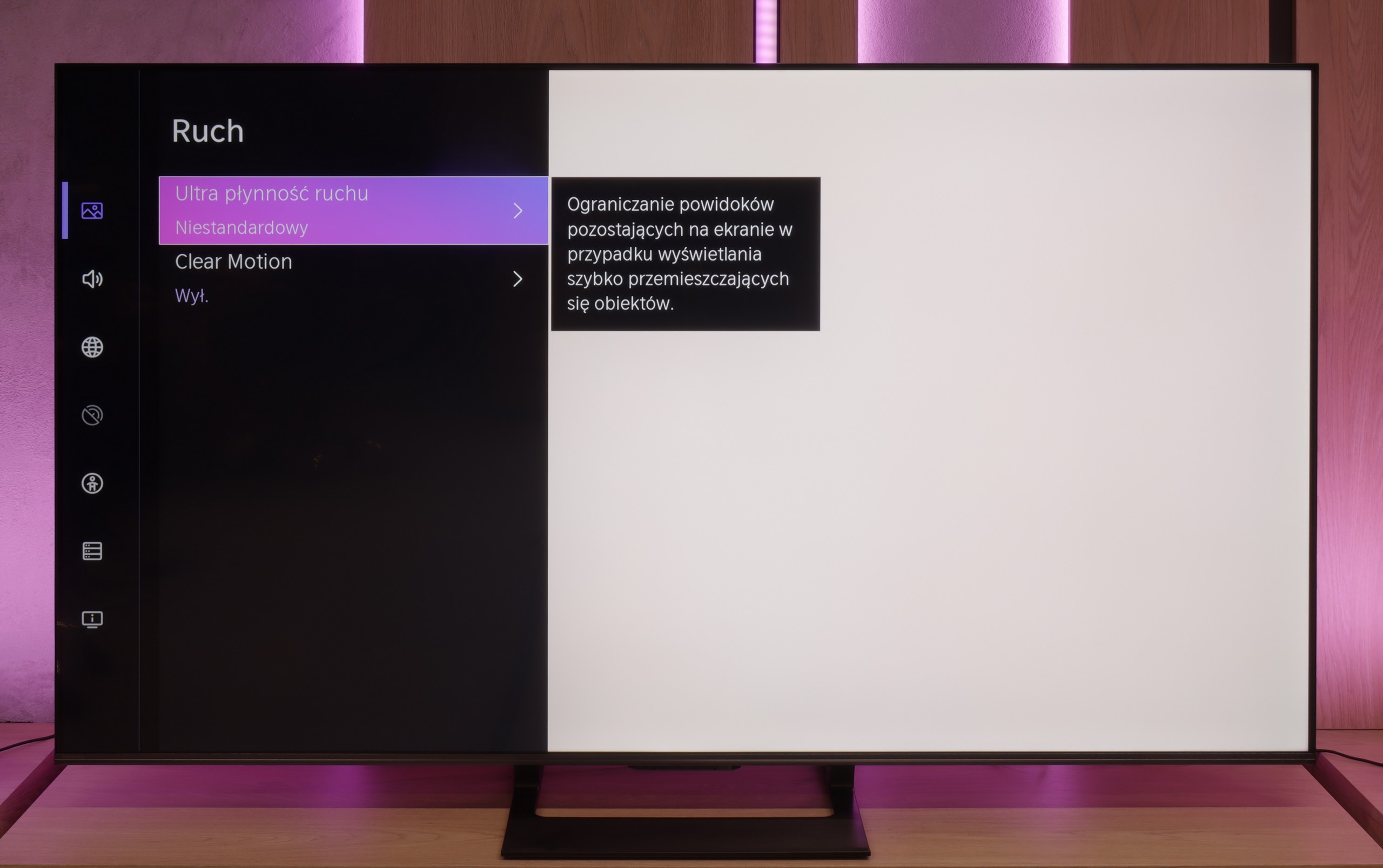
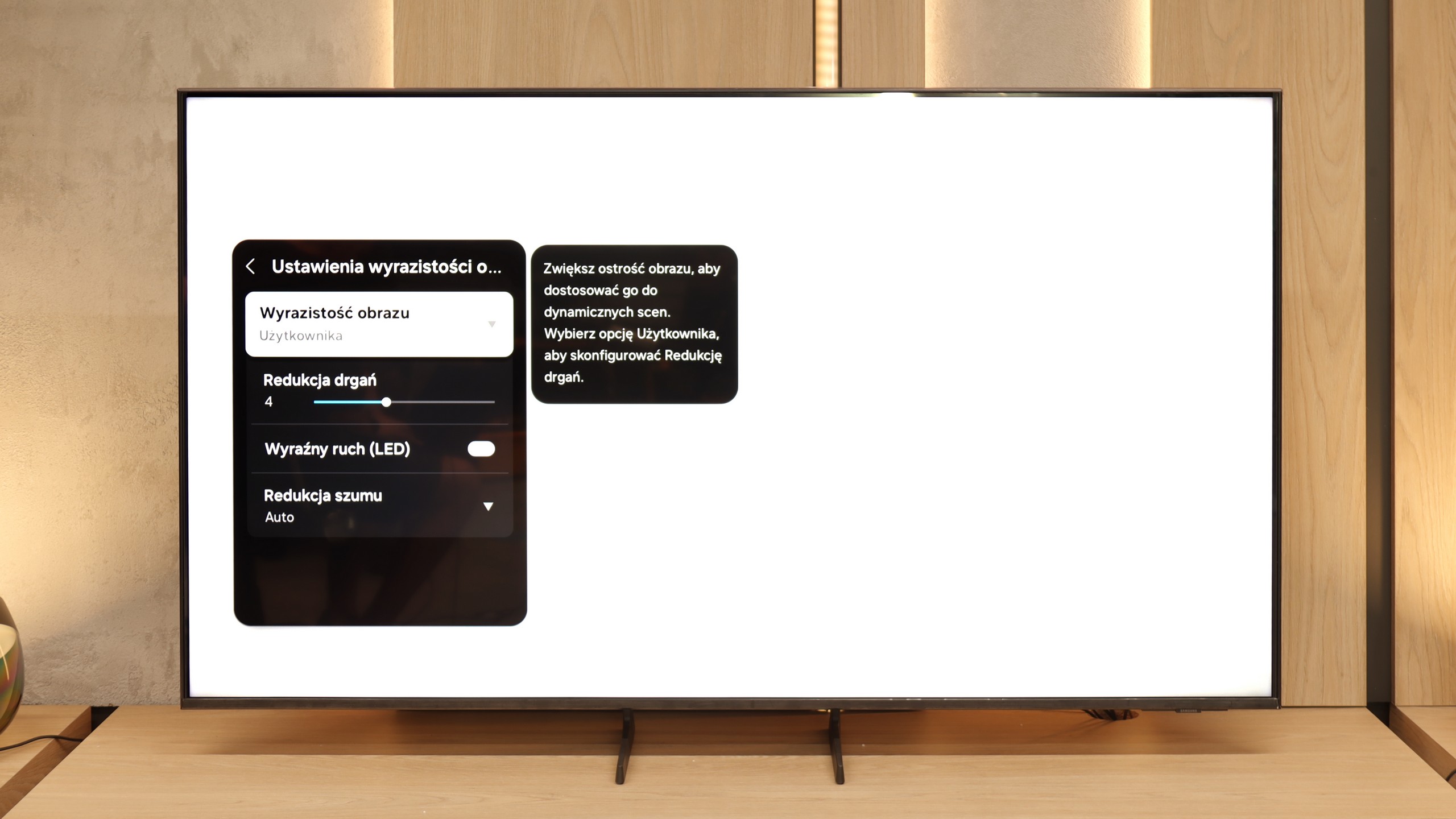
Blur (native resolution, maximum refresh rate):

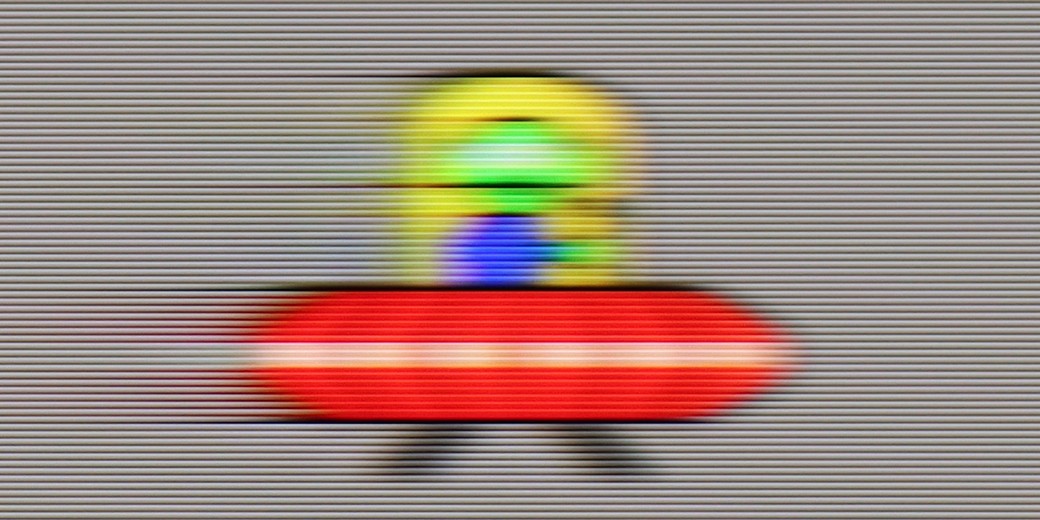
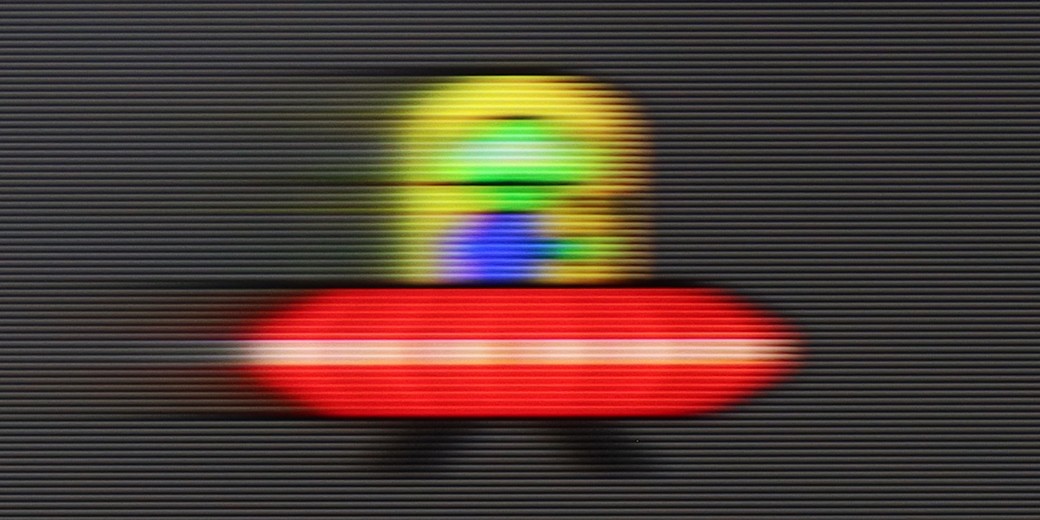
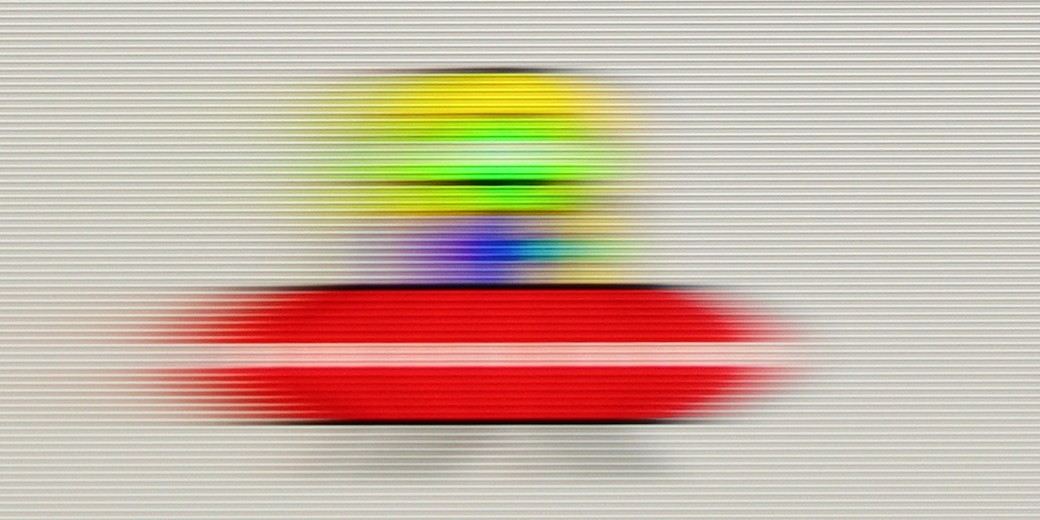
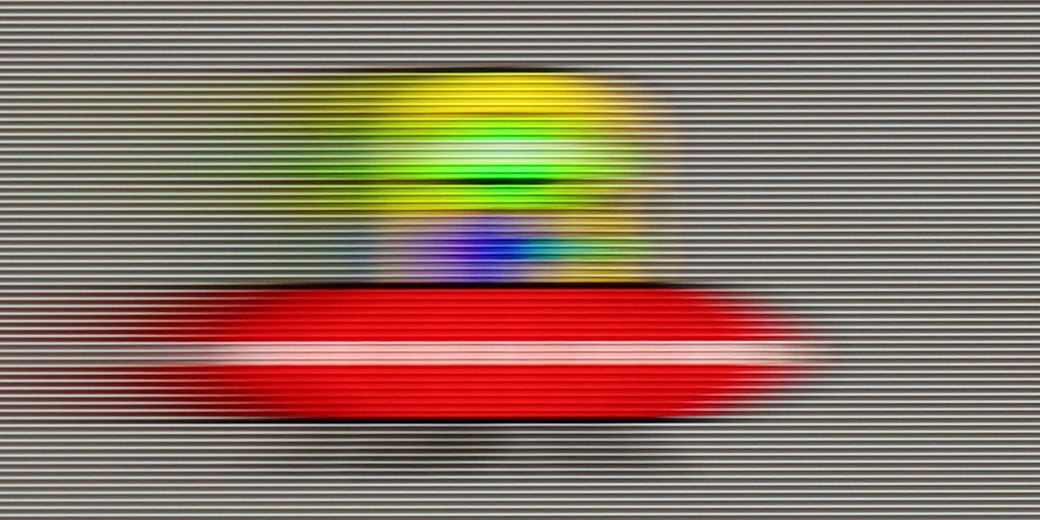
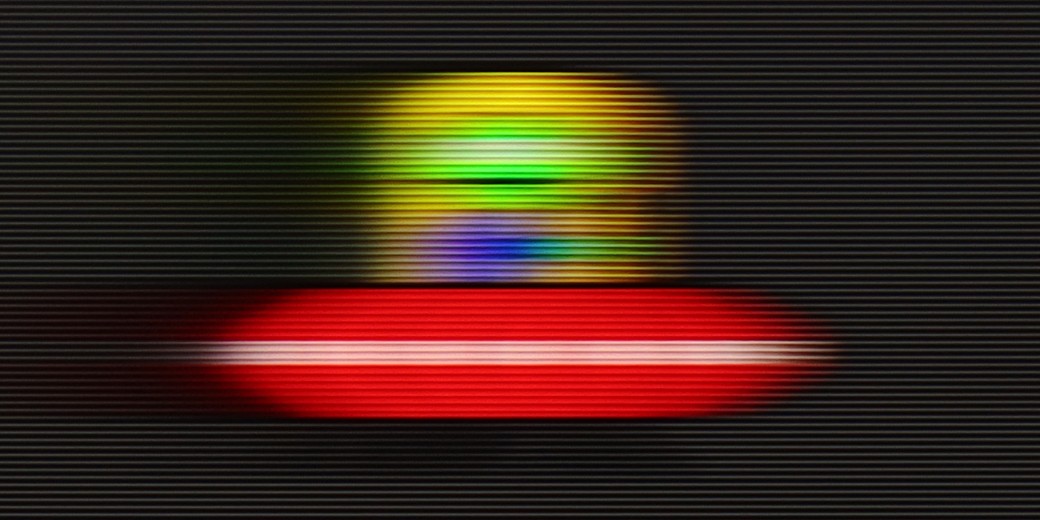
Blur (BFI function enabled):



Image flickers in this mode



Smużenie (1080p 240Hz):

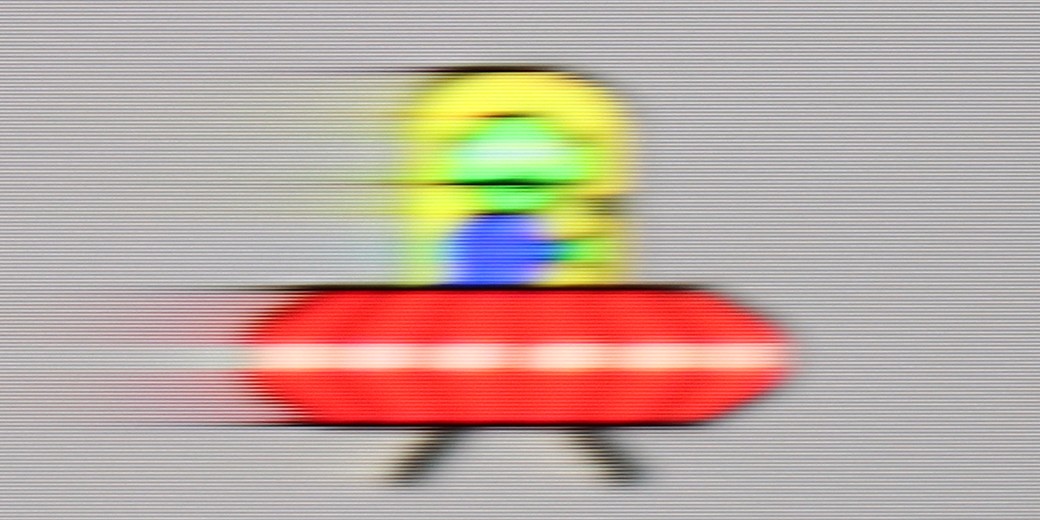
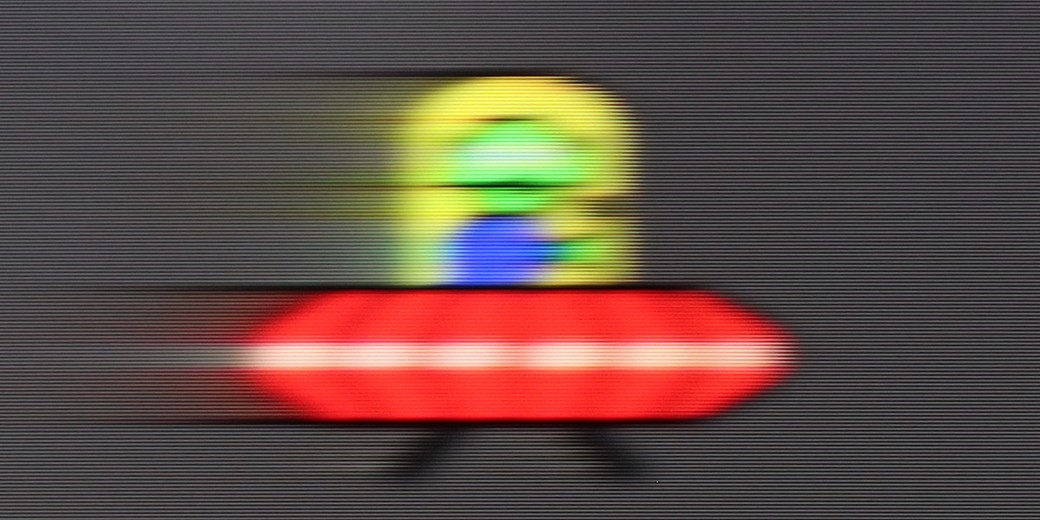
Smużenie ():
U7Q is a truly fast TV, much like its more powerful version “PRO”. At 4K resolution, it supports up to 144 Hz refresh rate, and if someone wants even more – in Full HD, you can achieve up to 240 Hz! This will mainly benefit PC gamers, but it’s worth appreciating – it’s a rare feature in this price segment. Right from the start, it’s clear that the U7Q has been designed with dynamic content in mind, such as games or sports. In films, we’re not left “out in the cold” either – the U7Q offers an “Ultra Motion Smoothness” feature, where with two sliders, you can adjust whether you want a smoother, theatrical picture, or something closer to cinematic style with a visible frame. It’s good that, like most manufacturers, we have a choice here and can customise it to our own preferences.
Motion blur and motion fluidity in the Q7F is probably the most budget-friendly aspect of this television. The 60 Hz panel makes the motion blur quite noticeable, especially in dynamic scenes, and it's rather hard to consider this model as equipment designed for watching sports or playing fast-paced games. In tests with the little green man, there was a long trail, similarly, the ball in a football match would leave behind streaks.
On the positive side, the presence of motion smoothing is worth noting. In films, it really makes a difference – especially since most materials are recorded in 24 frames. Here we can decide whether we prefer a more "cinematic" image, with a slight judder typically found in cinema, or a smoother, more “TV-like” one. This actually works quite well and helps improve the viewing comfort for series or movies.
Console compatibility and gaming features
8.5/10
3.3/10
- ALLM
- VRR
- VRR range48 - 240Hz
- Dolby Vision Game Mode
- Correct implementation of HGIG
- 1080p@120Hz
- 1440p@120Hz
- 4K@120Hz
- Game bar
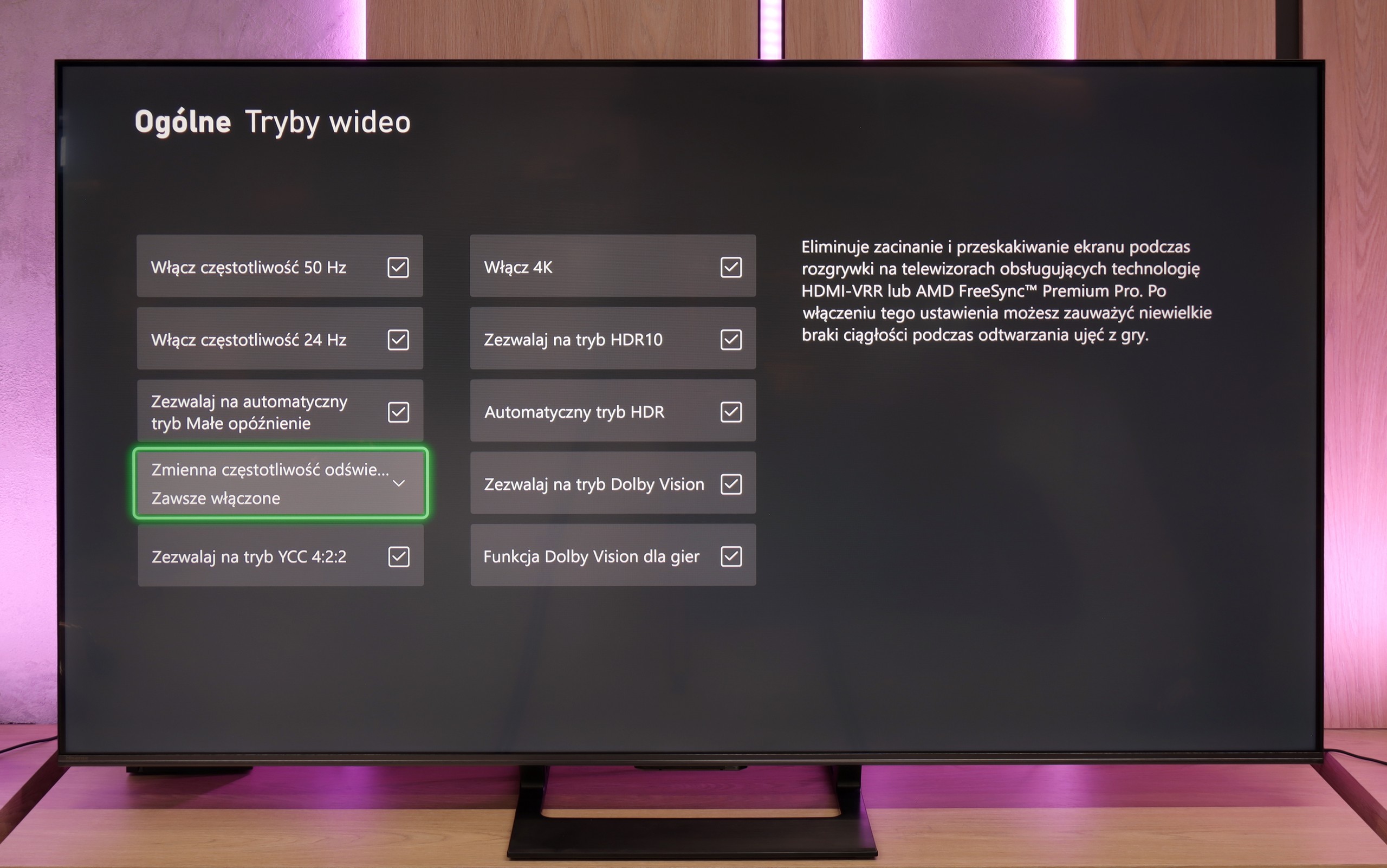
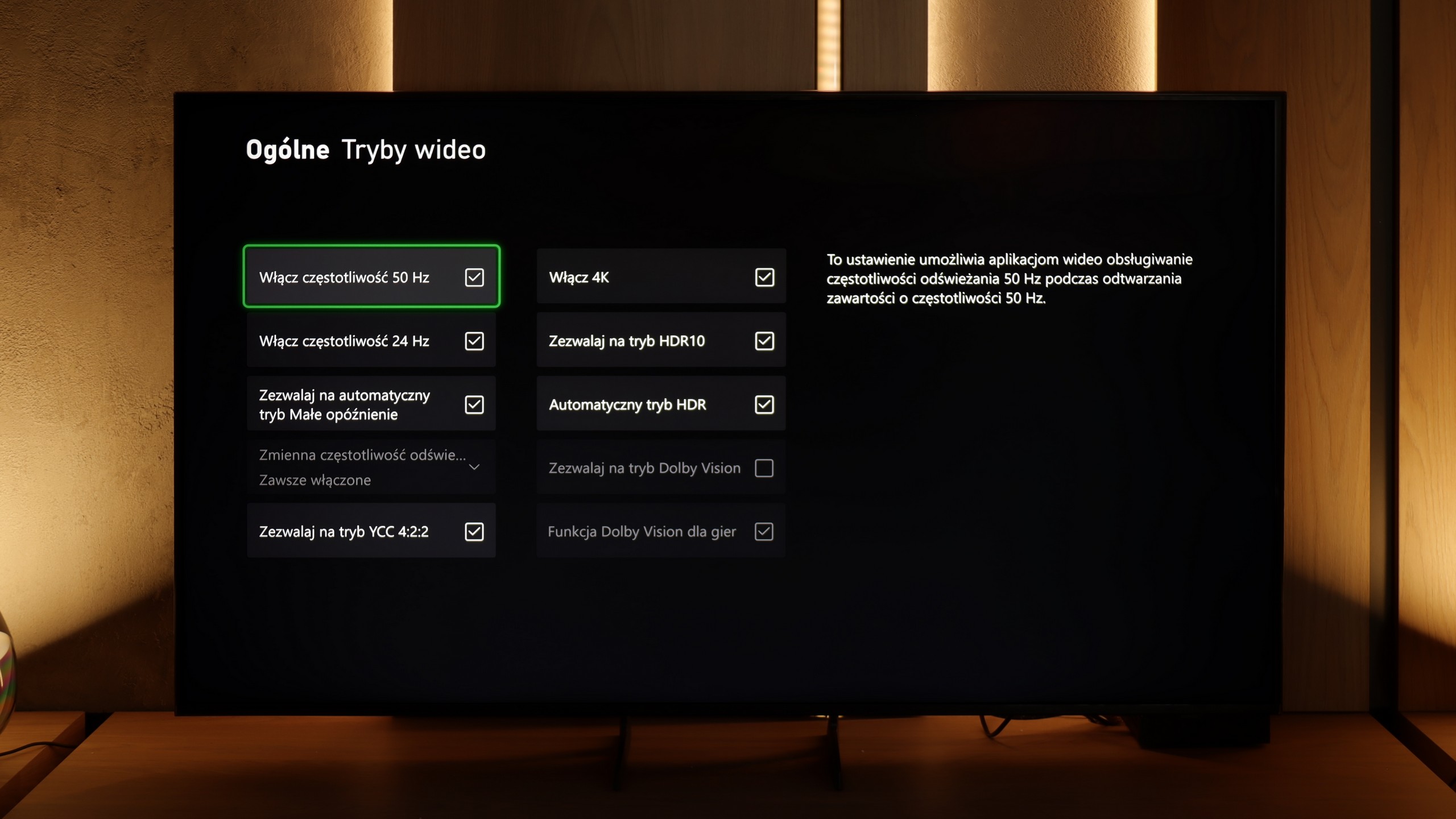
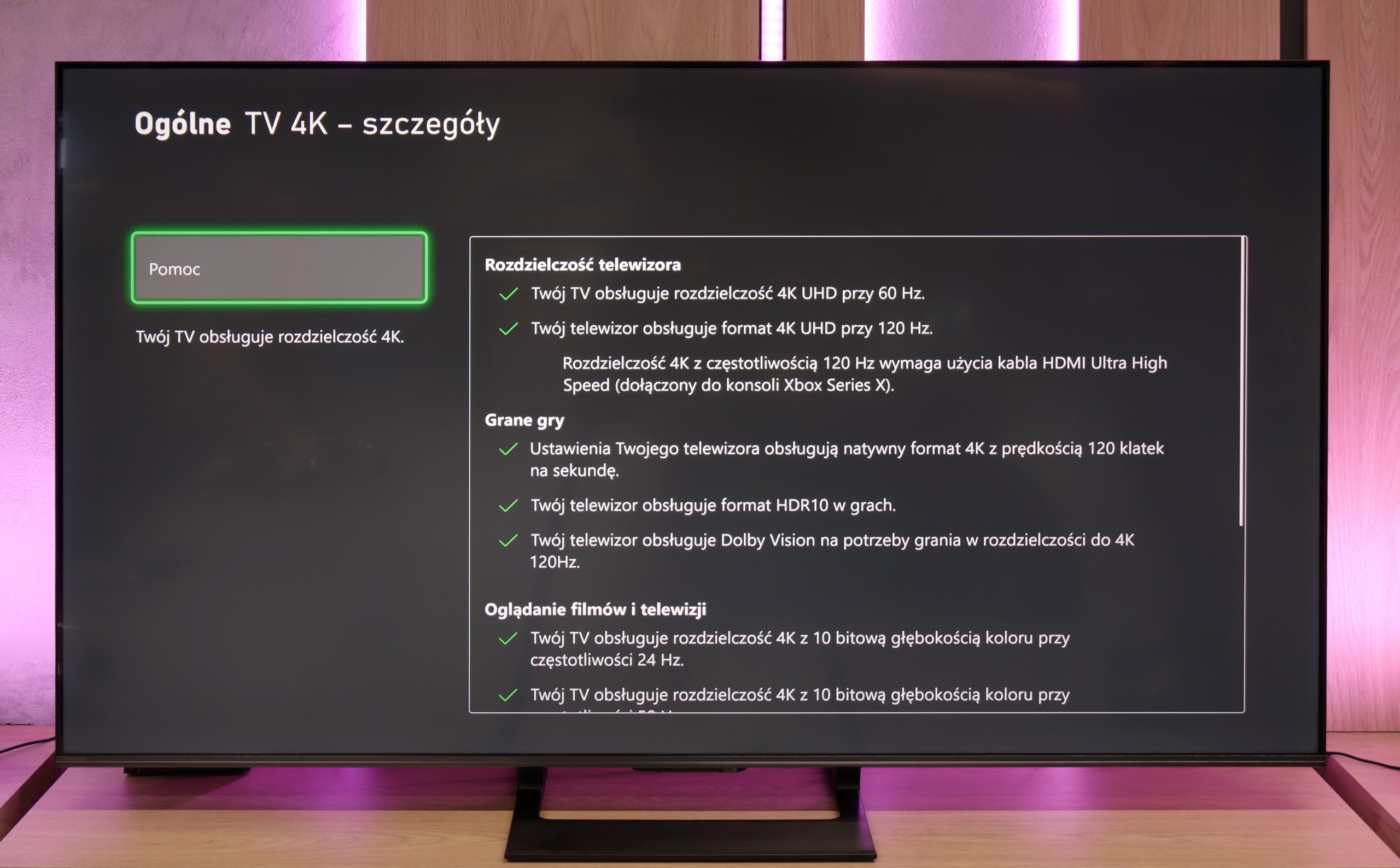
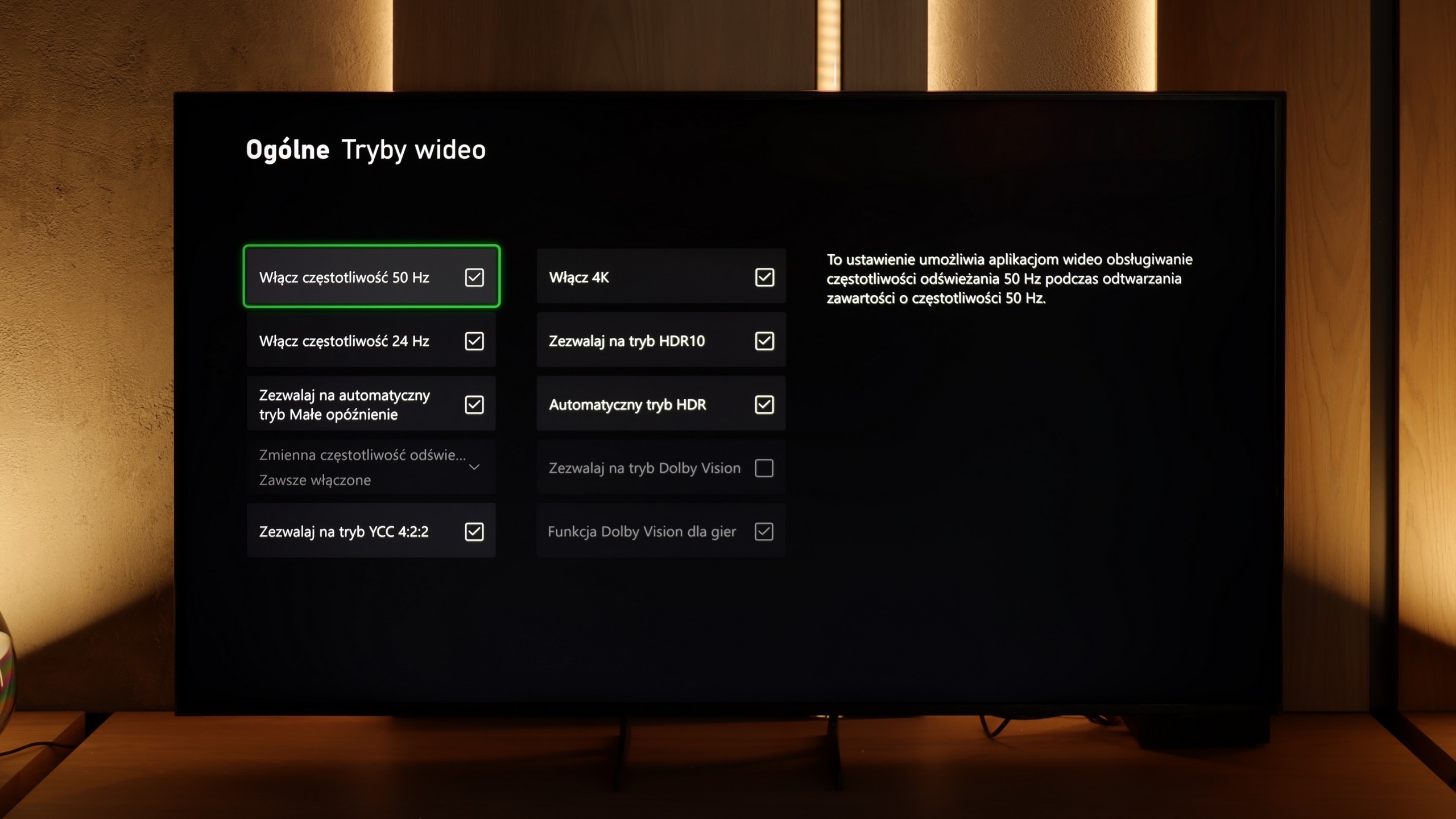
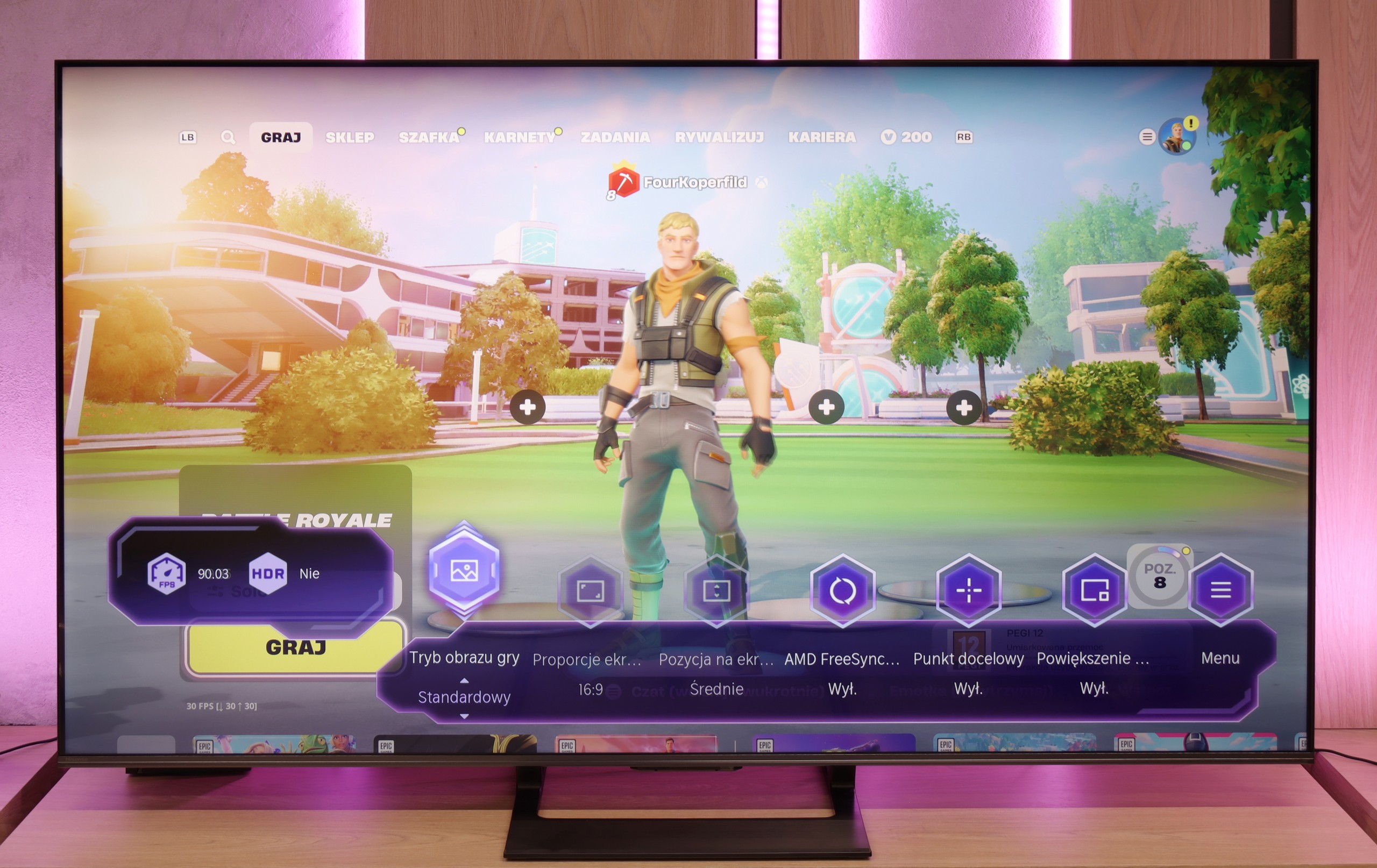
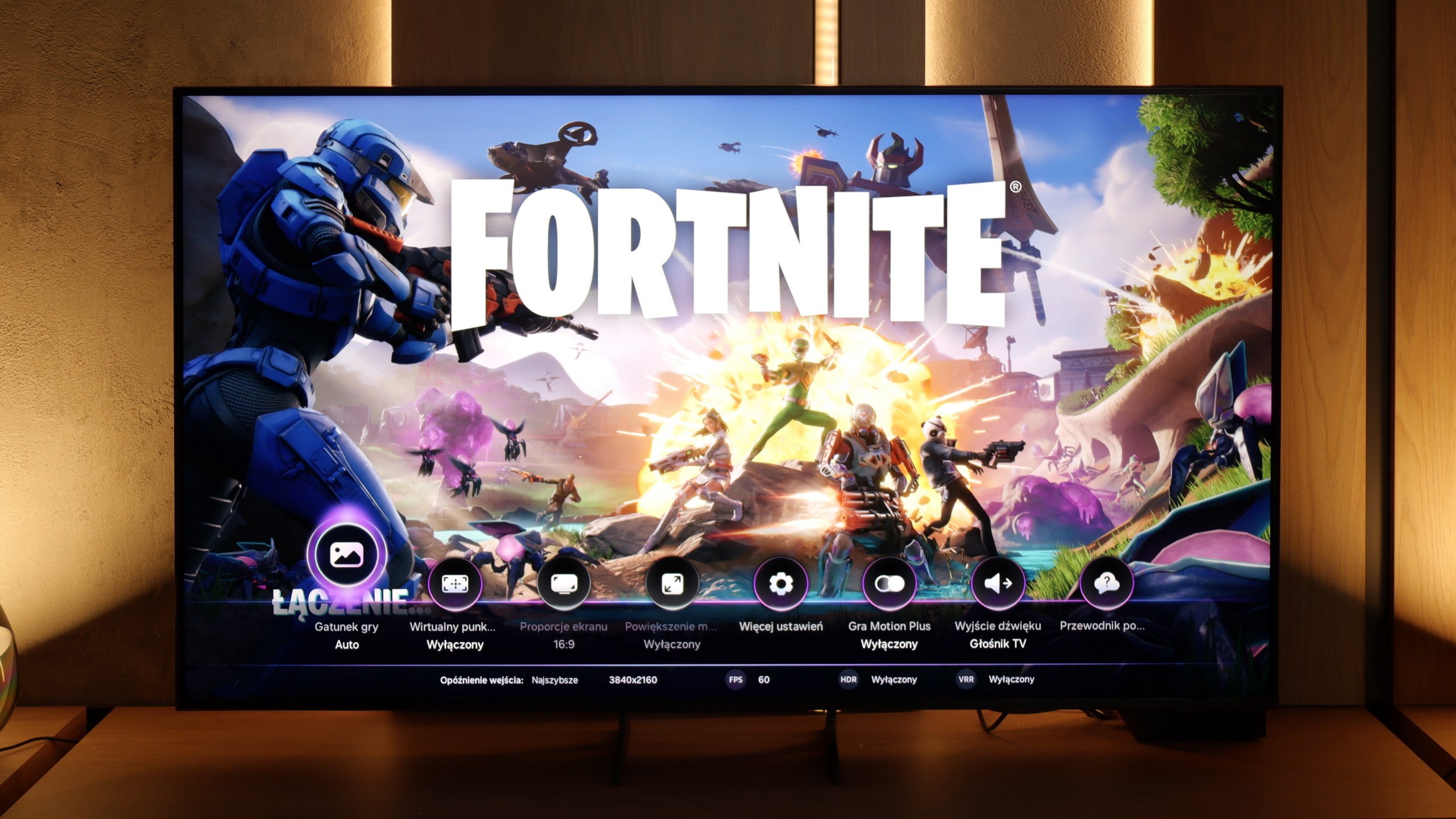
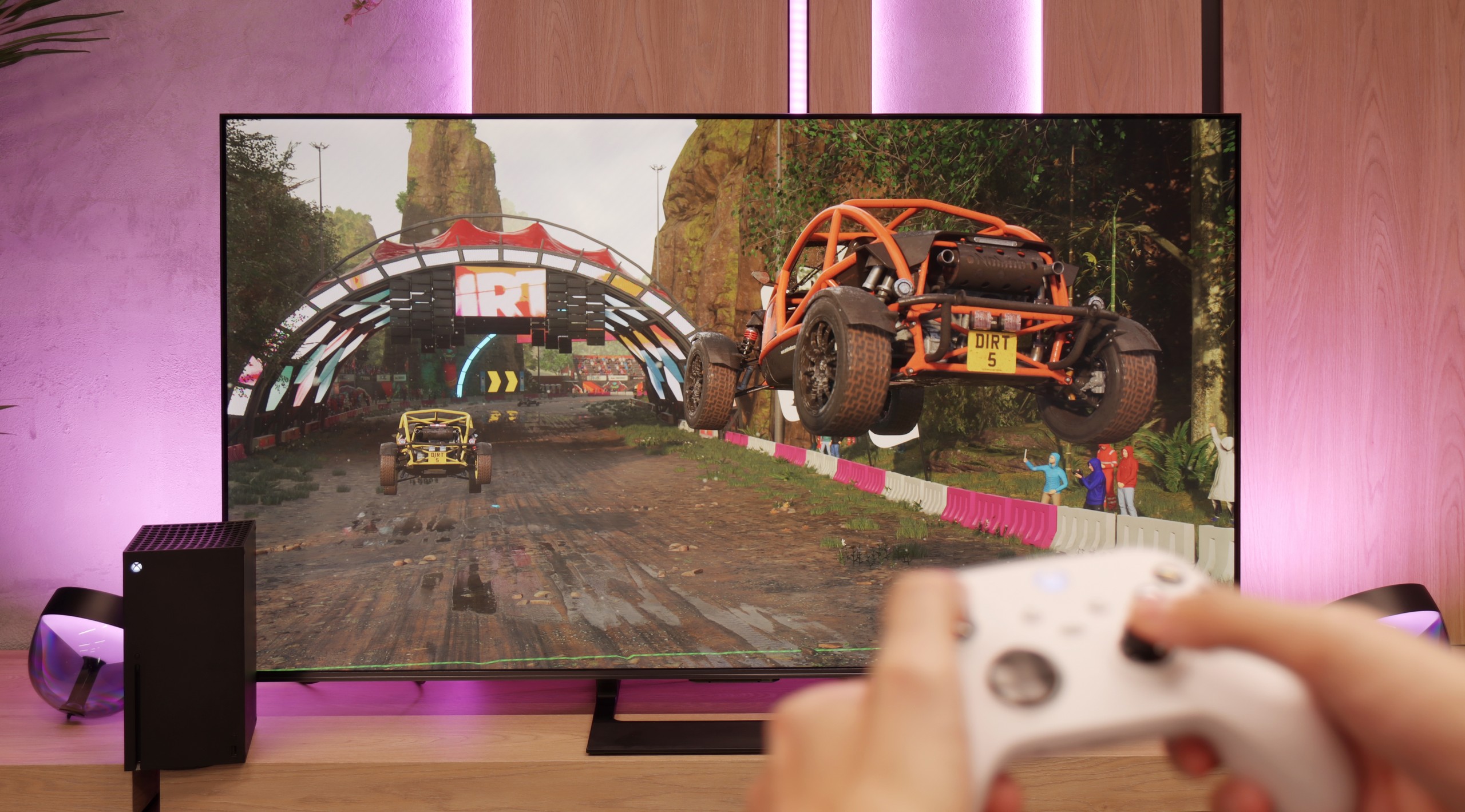
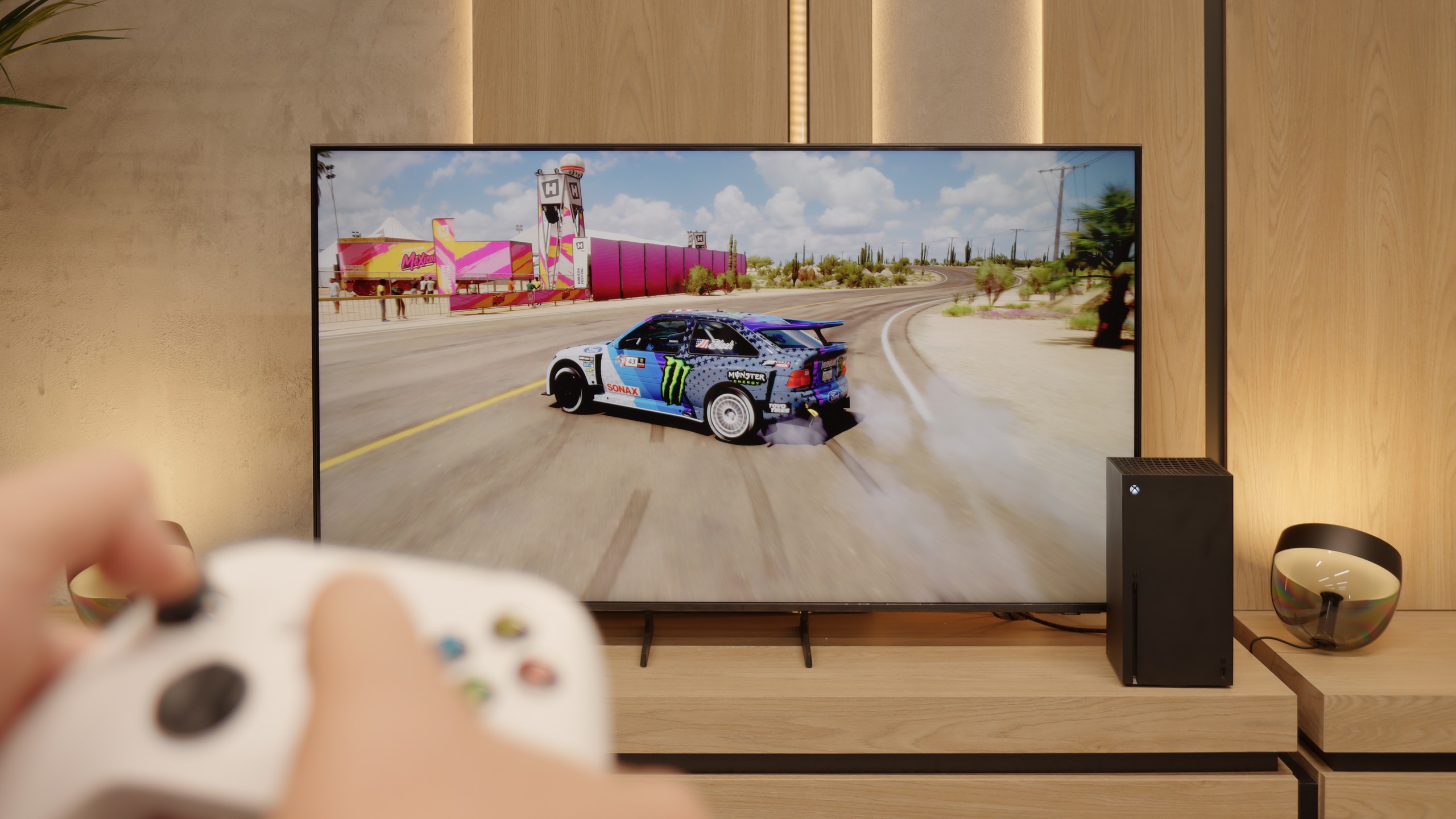
The Hisense U7Q is a TV designed with gamers in mind – and you can see that straight away with its gaming capabilities. It has practically everything you could wish for: Variable Refresh Rate (VRR) – check, Auto Low Latency Mode (ALLM) – check, and high refresh rates of up to 240 Hz in Full HD, along with support for various resolutions, not just 4K. It’s truly an impressive set of features that makes the U7Q perform well with both fast-paced shooters on consoles and more demanding titles on PC. Of course – like most Hisense models – it lacks a proper implementation of the HGiG feature. It’s a shame because HGiG allows the console's brightness to be adjusted to the specific TV, which in practice makes it easier to display HDR games according to the creators' intentions. Without this, you just have to deal with some limitations in the final HDR image in games.
The features for gamers on the Samsung Q7F is a topic that stirs up quite a few mixed emotions. On one hand – no reasonable person was expecting miracles here, after all, it’s a 60 Hz television and it was clear from the get-go that this wouldn’t be equipment to squeeze the maximum from a console or PC. On the other hand, since the manufacturer promised specific solutions in promotional materials, it is only natural that we wanted to see them in practice. At the start, it’s looking pretty good. The automatic game mode (ALLM) works, so there’s no need to manually fiddle with the settings; the console switches the TV to low latency mode by itself. Plus, we have the Game Bar, which looks impressive and allows you to check a few basic parameters without leaving the game. And this is where the good news ends.
The biggest problem with the Q7F is VRR, or rather its absence. Indeed, the appropriate icon appears in the menu, you can even see it in the Game Bar, but throughout the entire test, the function remained dead and could not be activated in any way. Even more disappointing is the matter of HGiG; this option was actually available in the beginning, but after a software update, it disappeared completely, which is just unprofessional. Therefore, the Q7F is only suitable for absolute basics. Sure, you can turn on the console, play calmer titles, and enjoy low input lag, but if someone is counting on more advanced features that the manufacturer promised, they will be disappointed. This is not a television one buys with gaming in mind, and it’s better to be aware of this before purchasing.
Input lag
9.7/10
10/10
SDR
HDR
Dolby Vision
The input lag on the U7Q is really impressive. With 120 Hz content, we achieved around 9 ms, and with 60 Hz – around 17 ms. These are fantastic results that make the TV great for even dynamic games requiring quick responses. It’s hard to fault anything here. Of course, as is often the case, the Dolby Vision mode in games seems a bit slower compared to standard SDR or HDR. This will be mainly noticeable for Xbox Series X/S console users, who are the only ones supporting Dolby Vision Gaming. Fortunately, the input lag still remains below 30 ms, so in practice, this is still an acceptable level even for more demanding gamers.
Input lag on the Samsung Q7F is really good for a 60 Hz TV. Measurements showed values below 12 ms, which means this model is more than sufficient for regular gaming on a console. Of course, it doesn't compare to the top-tier 120 Hz screens that can drop below 6–7 ms, but in everyday use, it's hard to talk about noticeable delay. In this regard, the Q7F doesn't fall behind its competitors in its segment and can easily be considered a safe choice for casual or sports gaming. At least in this respect.
Compatibility with PC
8.6/10
6/10
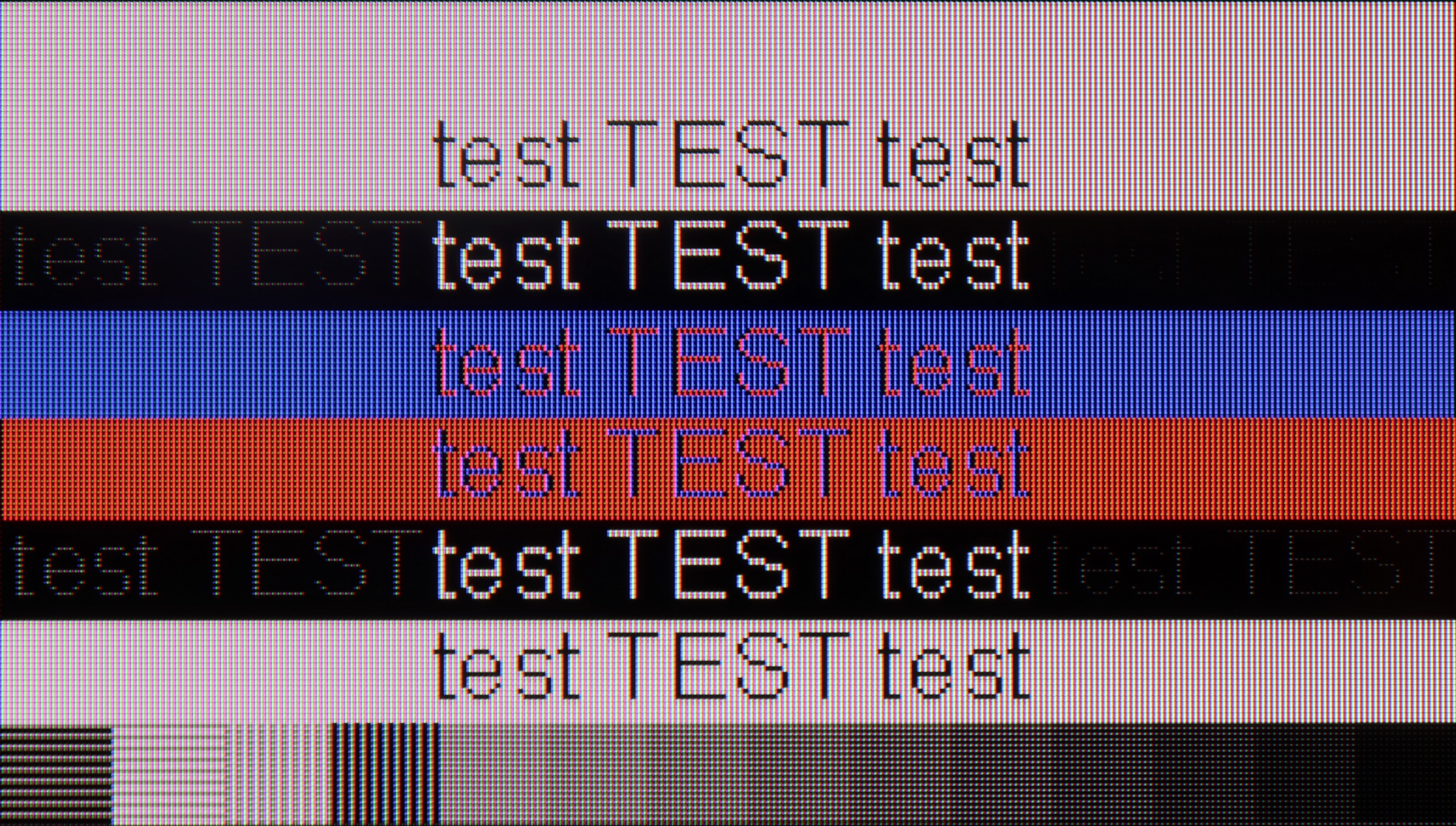
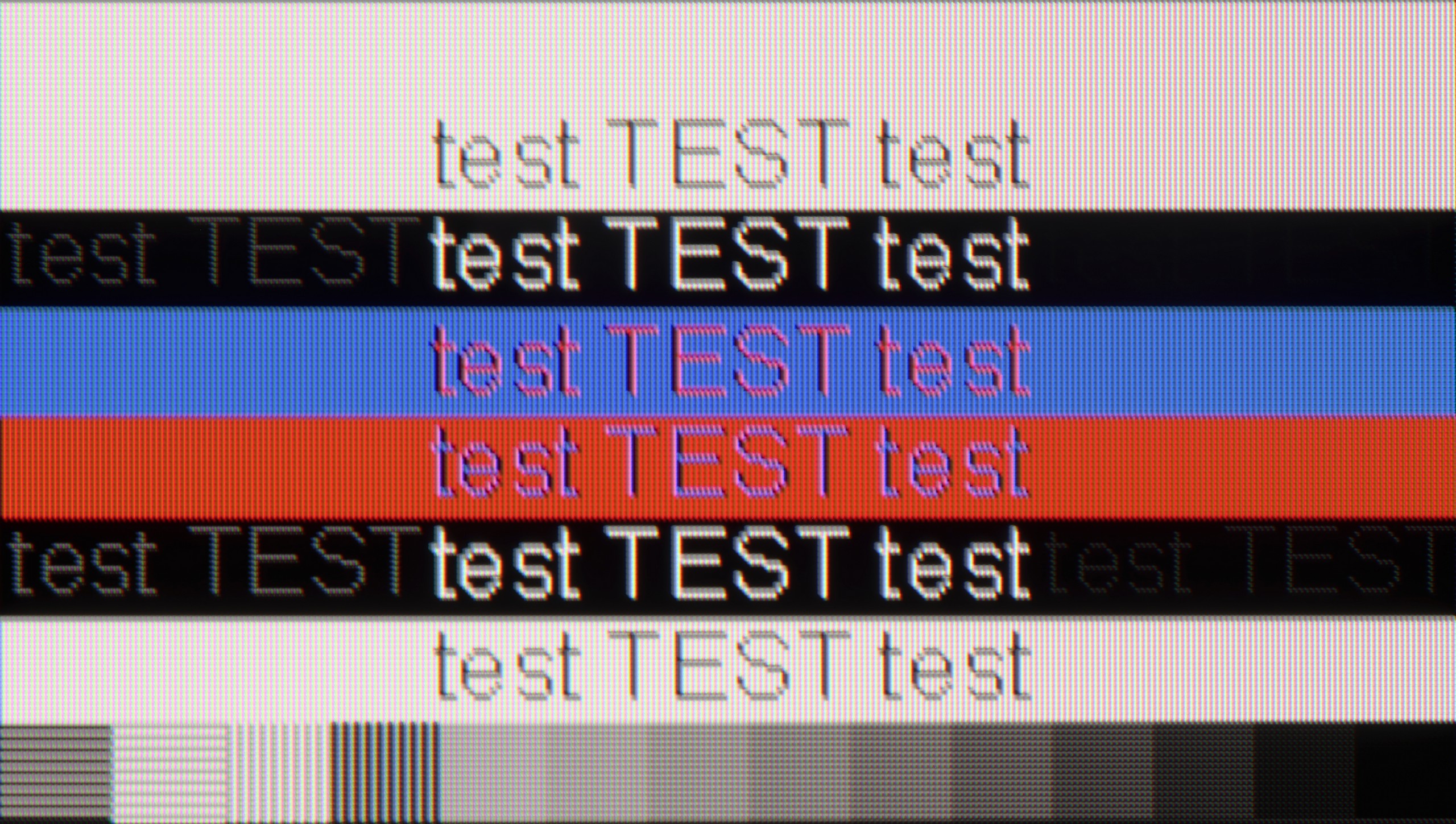
The U7Q communicates great with the computer. For gamers, this is fantastic news – we have high refresh rates, low input lag, and G-SYNC support, making gaming from a PC an absolute pleasure. But the U7Q also performs well in everyday tasks. If someone uses a computer for text, web browsing, or office work – there’s nothing to nitpick about. The TV correctly handles chroma 4:4:4, so fonts look sharp and clear, without blurring or strange outlines. Both small and capital letters are simply legible – just as they should be.
Collaboration with a PC on the Q7F is decent, though it's not a television that will satisfy the most demanding users. Fonts are displayed clearly and sharply, so you can comfortably work on it – especially for everyday office tasks or browsing the internet. With thin letters, you can notice slight shading, but it's not something that hinders normal use. In a smaller size, the Q7F can indeed serve as a computer screen, although you have to keep its limitations in mind. The lack of variable refresh rate means we won't benefit from G-Sync or FreeSync, and the 60 Hz effectively limits more demanding PC gaming. It will be fine for work and light use, but for serious gaming, it's definitely better to look for something higher up in Samsung's range.
Viewing angles
3/10
3.5/10
The viewing angles on the U7Q are rather weak – that's just typical for VA panel characteristics. Directly in front, everything looks very good: blacks are deep, colours are saturated, and the contrast is high. But just moving slightly to the side is enough for the picture to start losing quality – colours become paler, and blacks begin to resemble dark grey. Compared to TVs with IPS panels, the U7Q performs worse, although on the other hand, it compensates with better contrast and deeper blacks.
The viewing angles on the Q7F are simply poor – typical for a VA panel. Just sitting slightly off to the side immediately shows that the picture loses quality. Colours fade, contrast noticeably drops, and blacks start to resemble grey more than anything deep. This is a television that is definitely best viewed head-on, and any larger viewing angle involves compromises.
TV efficiency during daytime
6.2/10
3.9/10
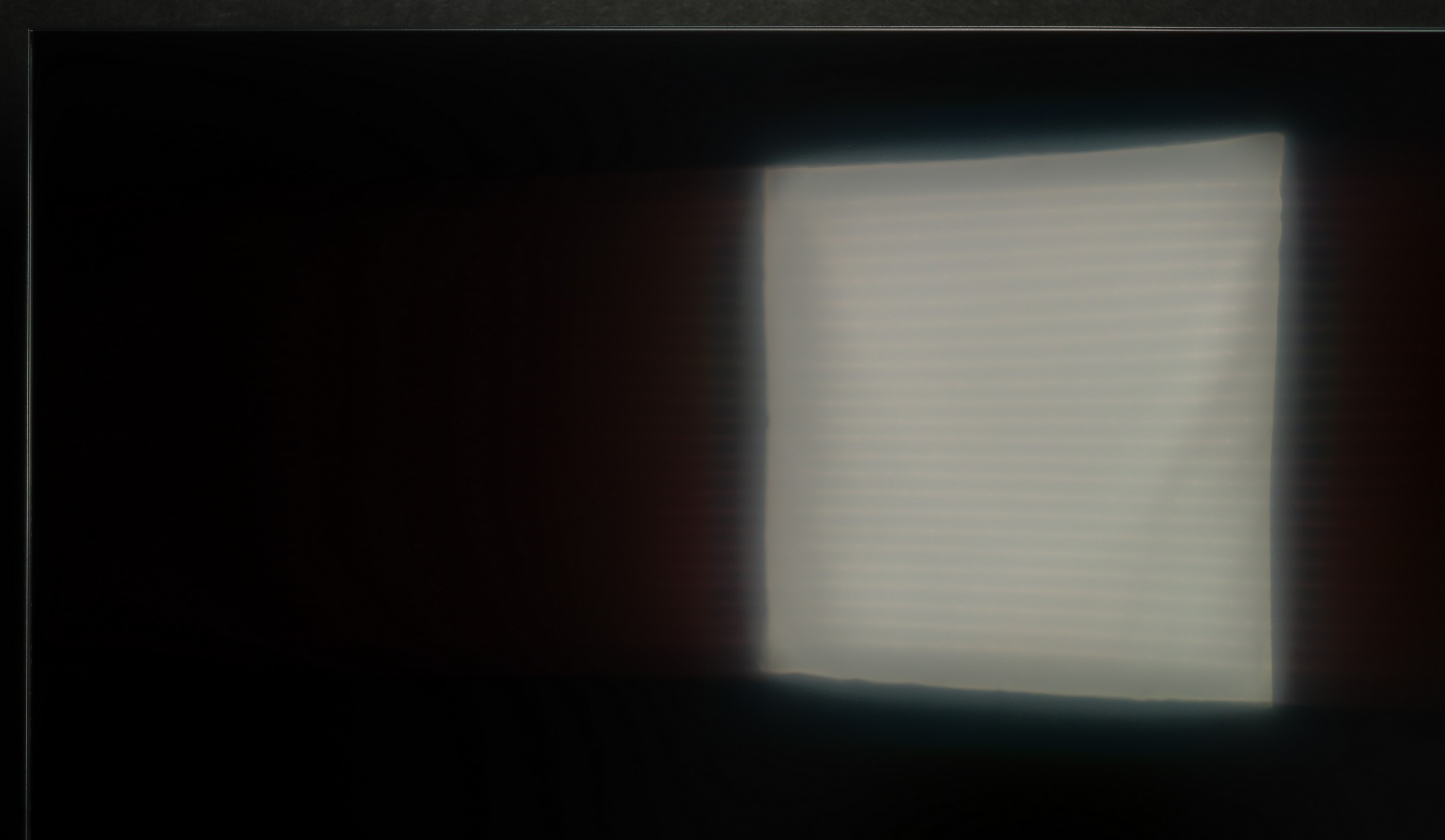
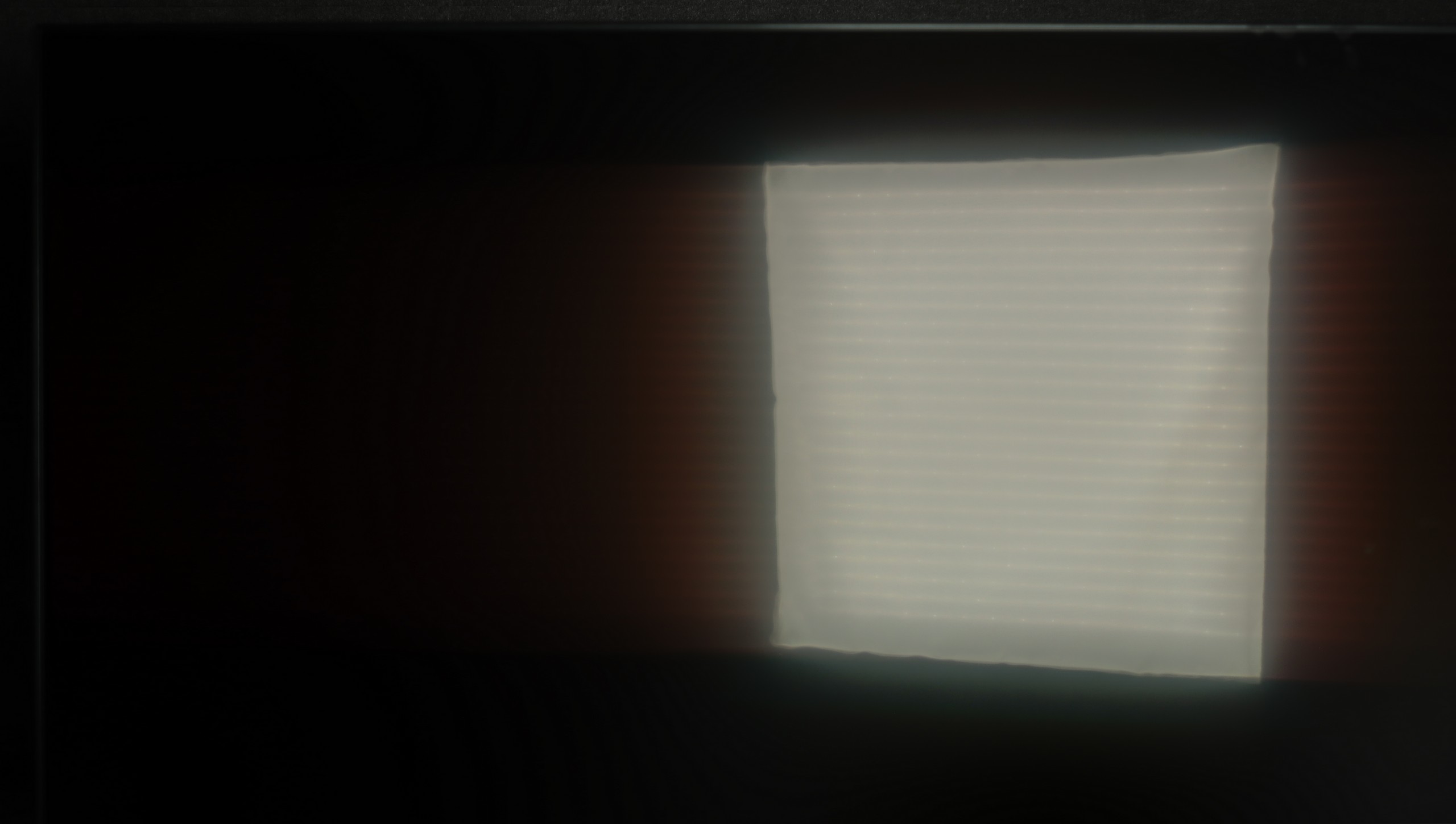
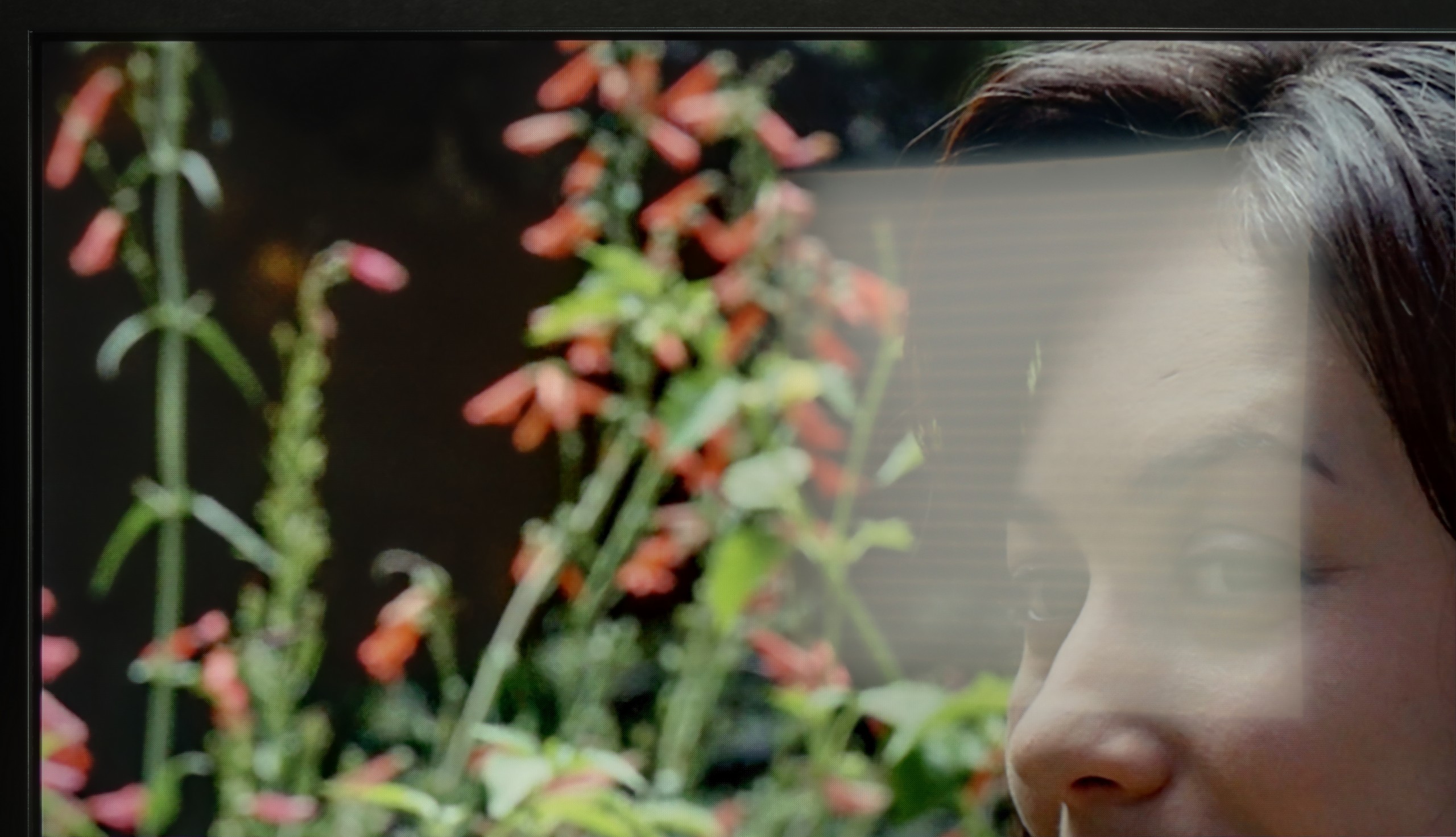
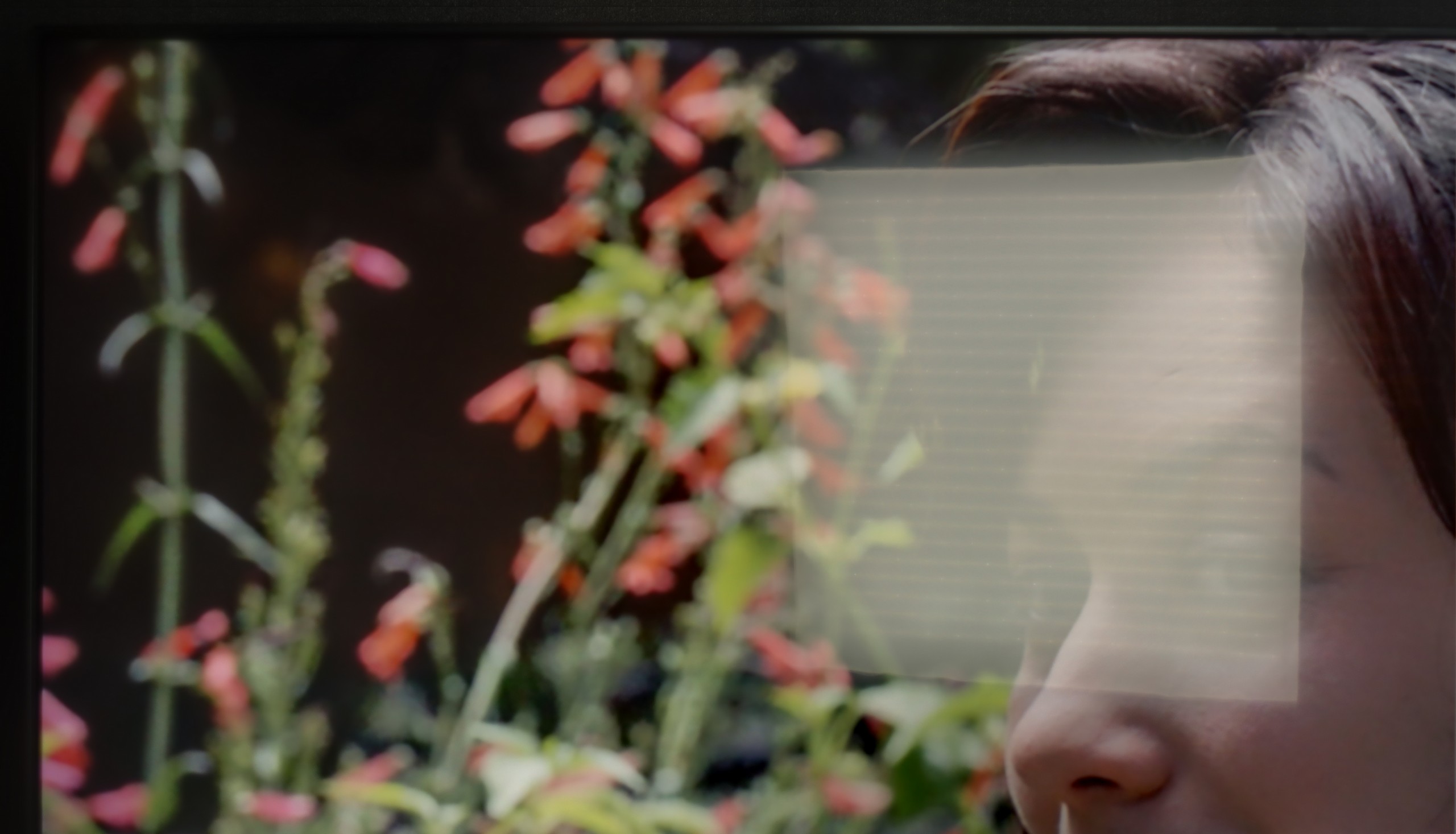
Matrix brightness
Average luminance SDR
Samsung Q7F: 237 cd/m2
Hisense U7Q: 519 cd/m2
The U7Q performs quite well in sunny rooms. Brightness in SDR mode averages around 520 nits, which practically means that even on a sunny day, you can comfortably watch television without the feeling that everything is drowning in reflections. Additionally, thanks to the satin coating on the panel, the television handles reflections well.
The performance of the Q7F during the day unfortunately doesn't impress. Due to its low brightness, the screen quickly capitulates in very sunny rooms. Therefore, it’s hard to recommend it to those who plan to watch television in a bright living room with large windows. In moderately lit rooms, it manages reasonably well, but in bright light, the image loses clarity. Additionally, the fact that the panel doesn’t always effectively handle reflections means that glares can be bothersome during the day. This is rather a screen for evening viewing than for daily sessions in full sunlight.
Details about the matrix
Subpixel Structure:
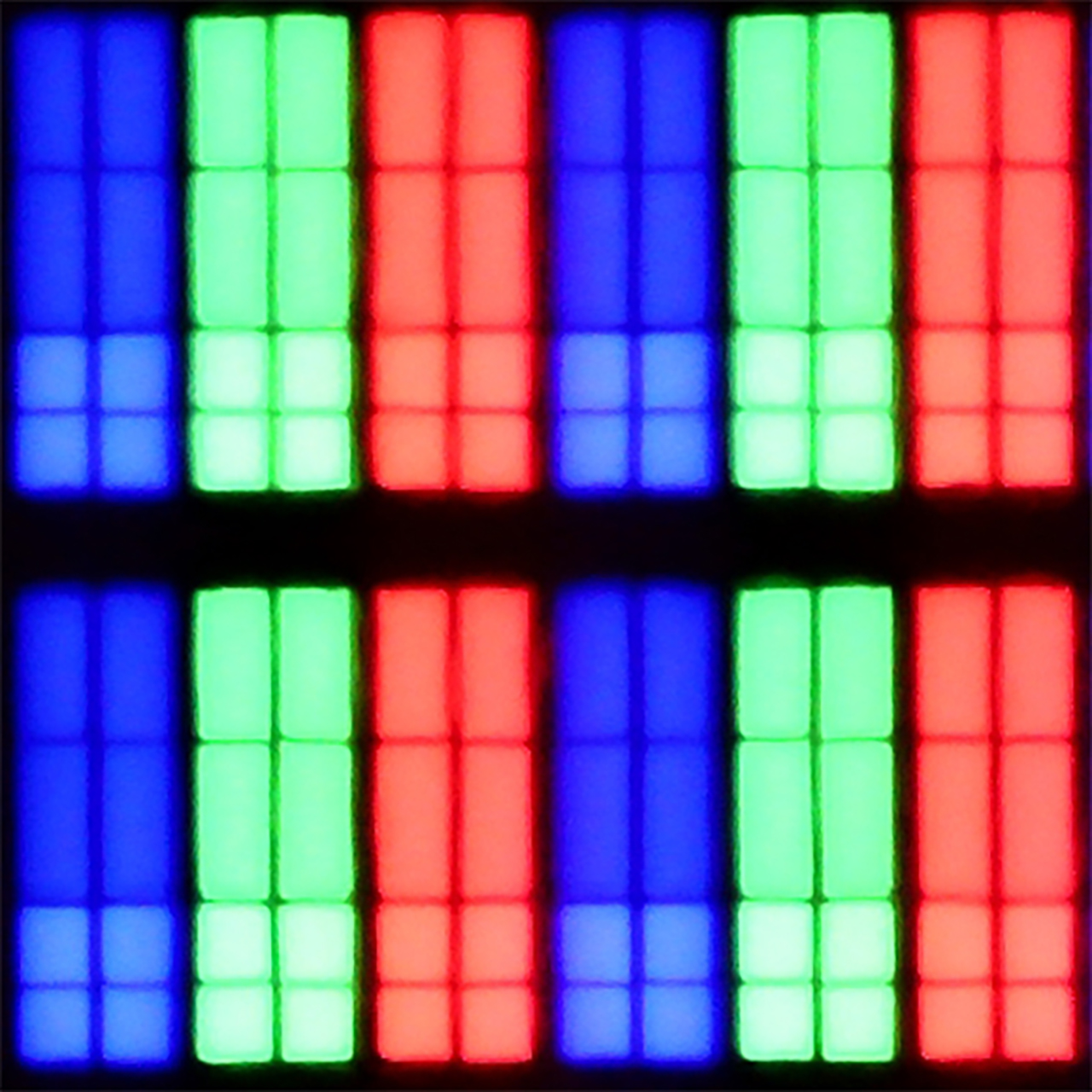
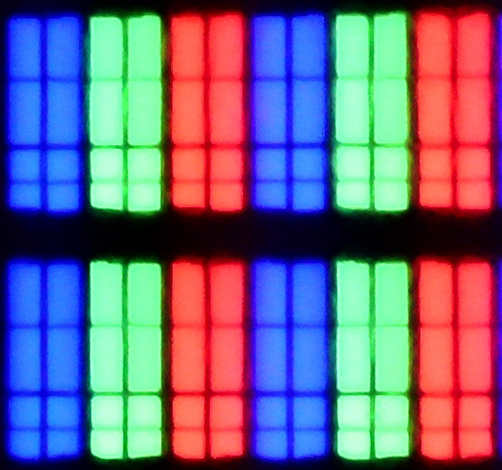
Panel uniformity and thermal imaging:
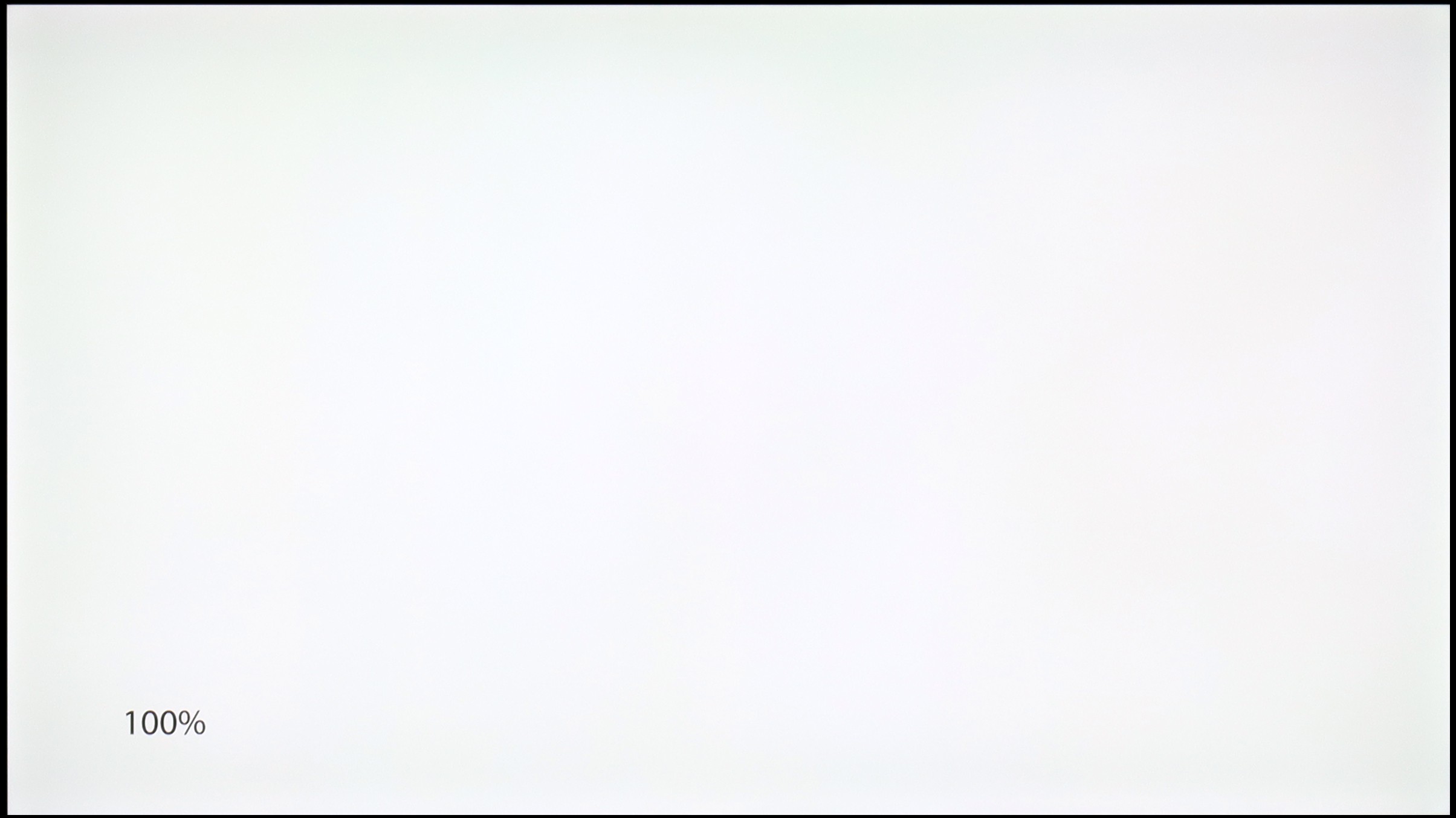
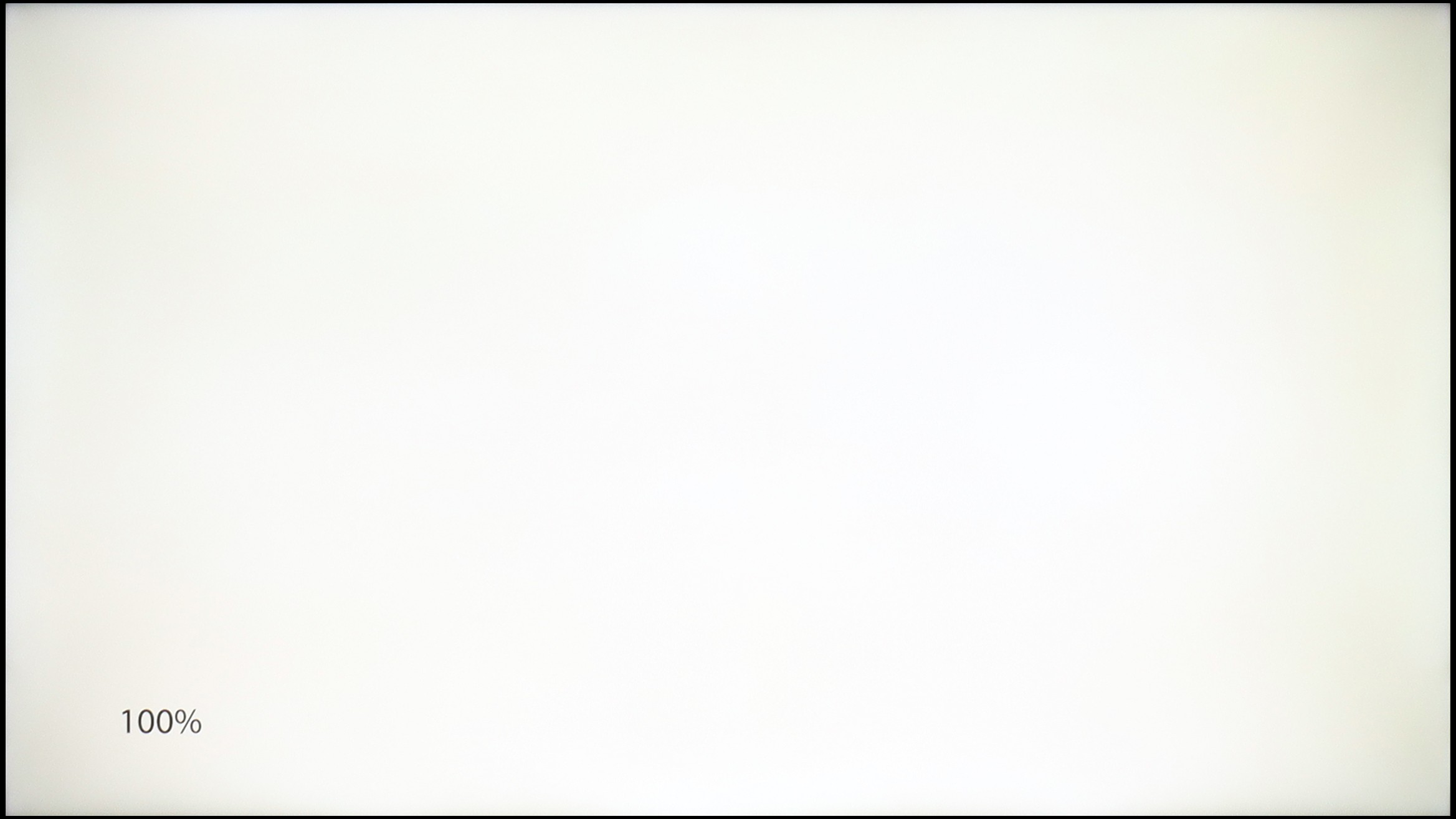
Hisense U7Q
Samsung Q7F
TV features
8.9/10
6.6/10
- HDMI inputs2 x HDMI 2.0, 2 x HDMI 2.1 48Gbps3 x HDMI 2.0, 0 x HDMI 2.1
- Other inputsRCA (Chinch)
- OutputsToslink (Optical audio), eARC (HDMI), ARC (HDMI), Mini-Jack (Headphones)Toslink (Optical audio), eARC (HDMI), ARC (HDMI)
- Network InterfacesWi-Fi 2.4GHz, Wi-Fi 5GHz, Ethernet (LAN) 100MbpsWi-Fi 2.4GHz, Wi-Fi 5GHz, Ethernet (LAN) 100Mbps
- TV receptionDVB-T, DVB-T2, DVB-S, DVB-S2DVB-T, DVB-T2, DVB-S, DVB-S2, DVB-C
Classic features:
- Recording to USB (terrestrial TV)
- Recording programming
- Picture in Picture (PiP)
- RF remote control (no need to aim at the screen)
- Backlit remote control
- Teletext
- Audio only mode
- Bluetooth headphones support
- Simultaneous Bluetooth headphones & TV audio
Smart features:
- AirPlay
- Screen mirroring (Windows Miracast)
- Voice search
- Voice search in native language
- Ability to connect a keyboard and mouse
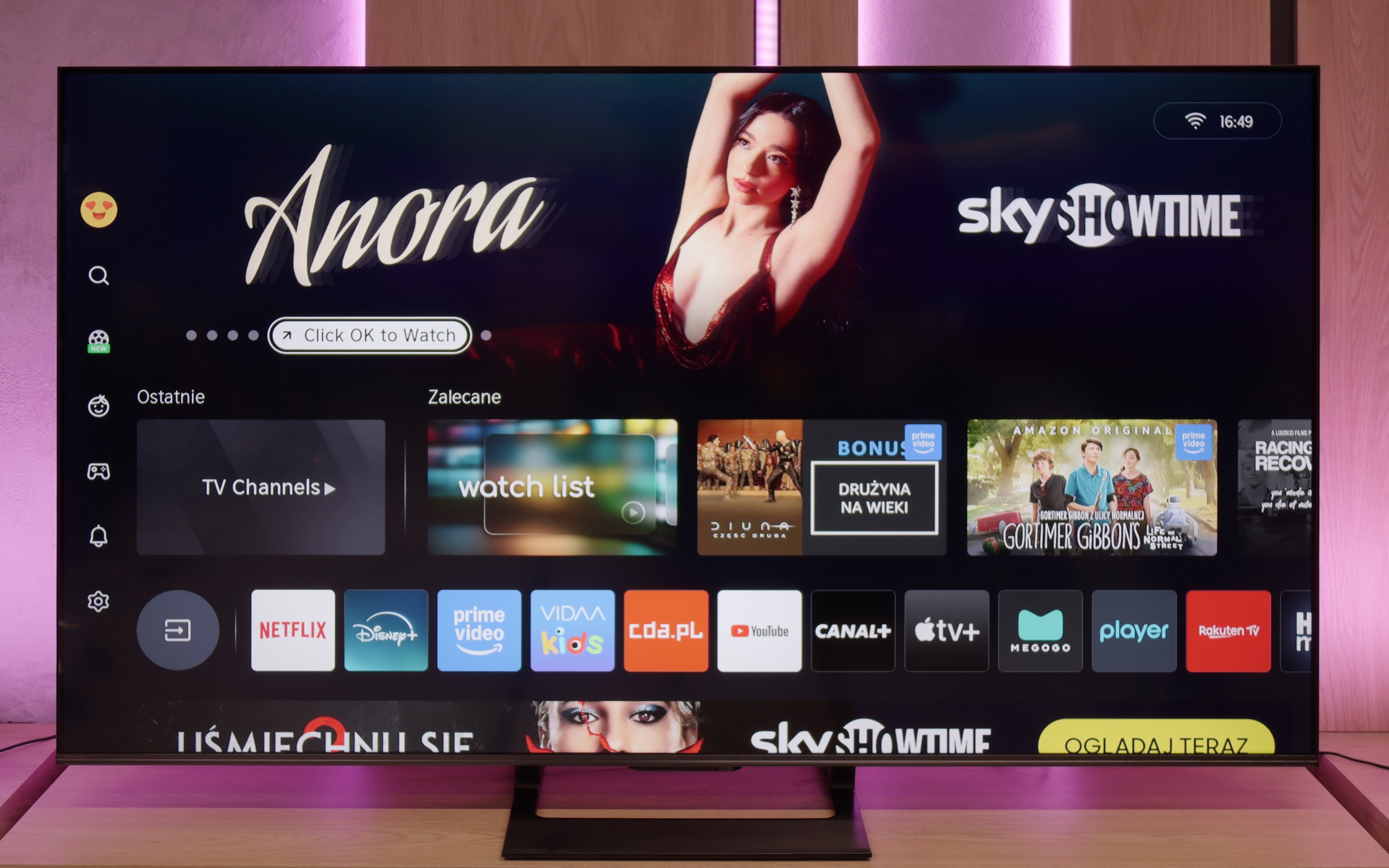
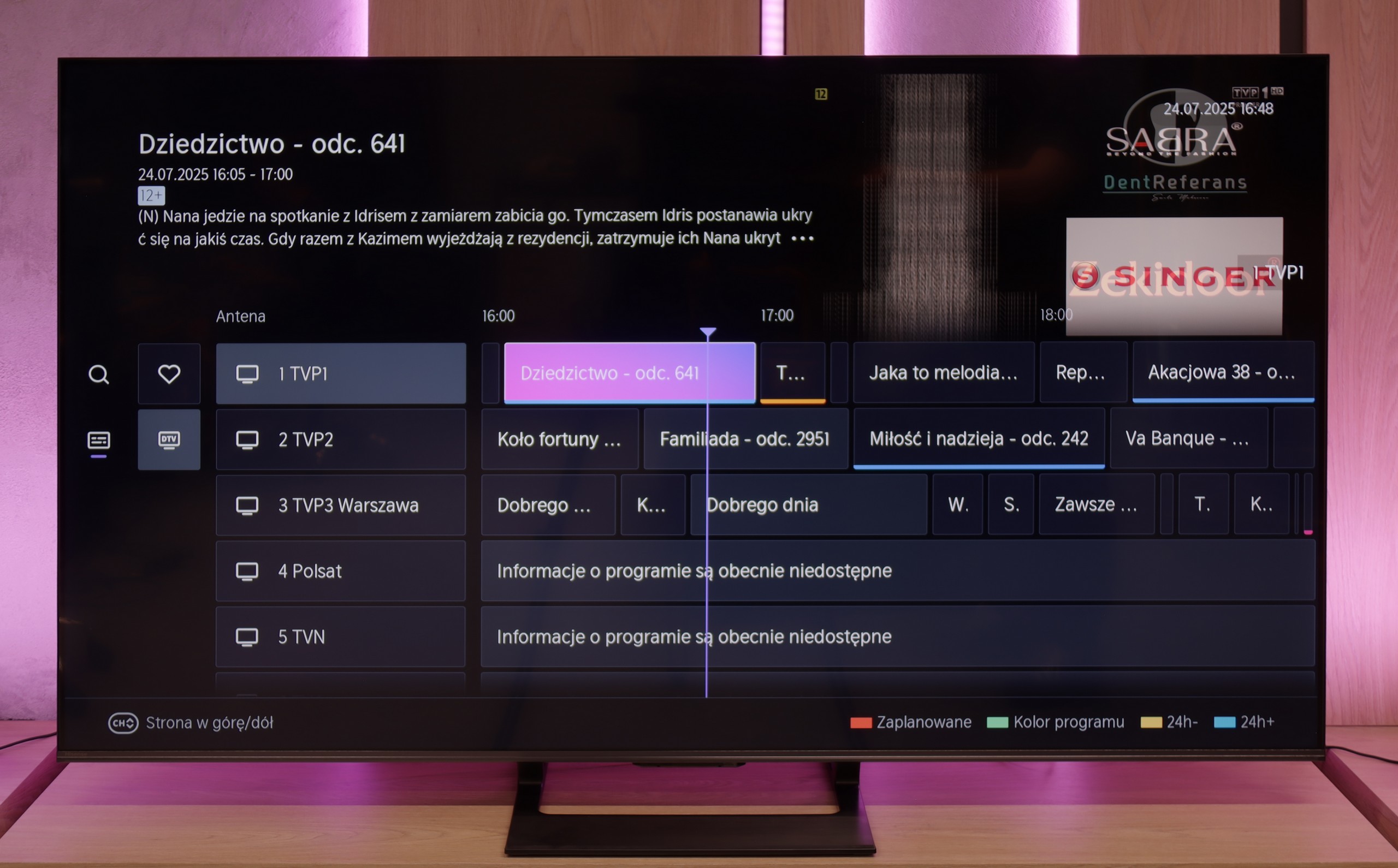
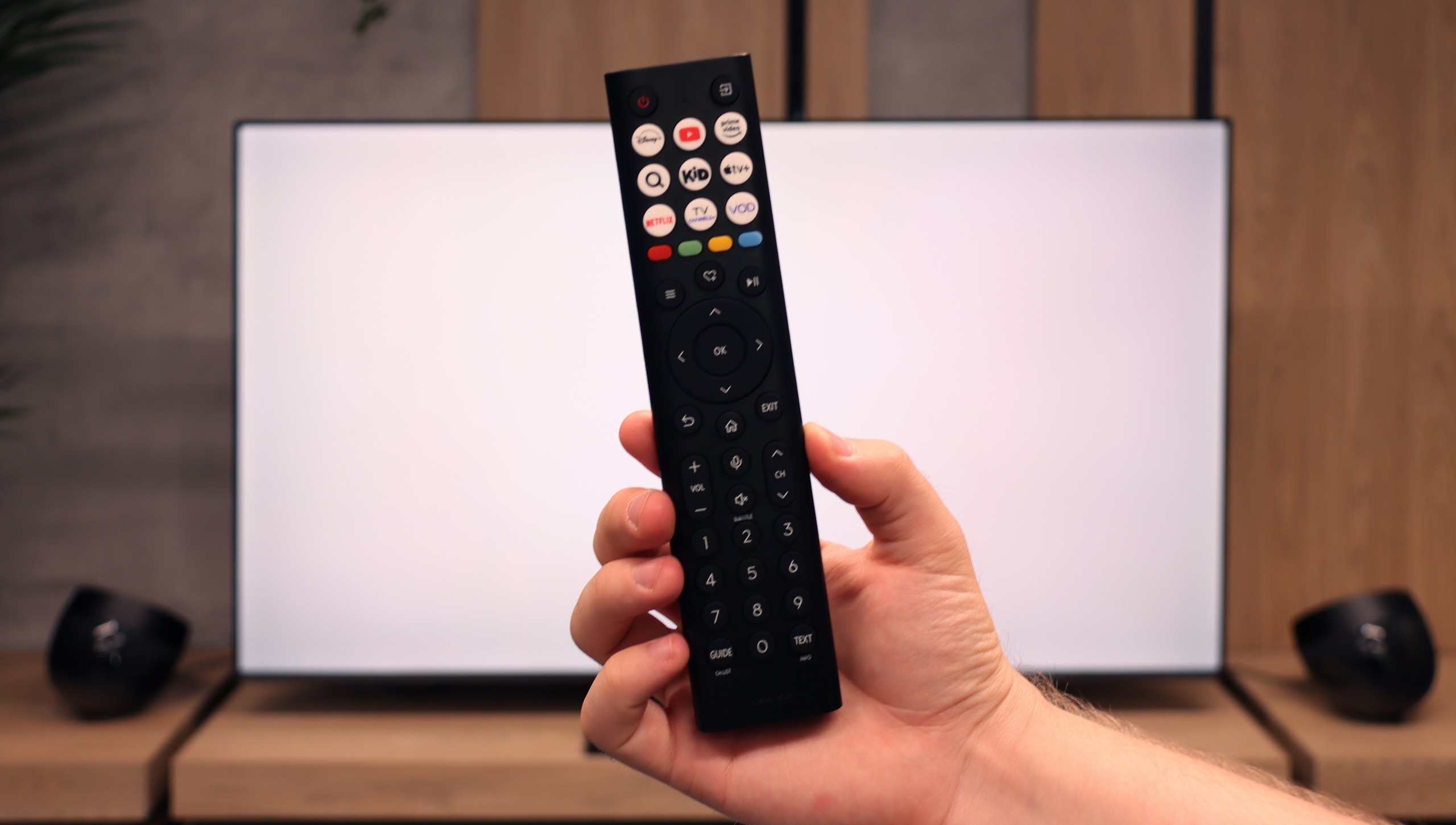
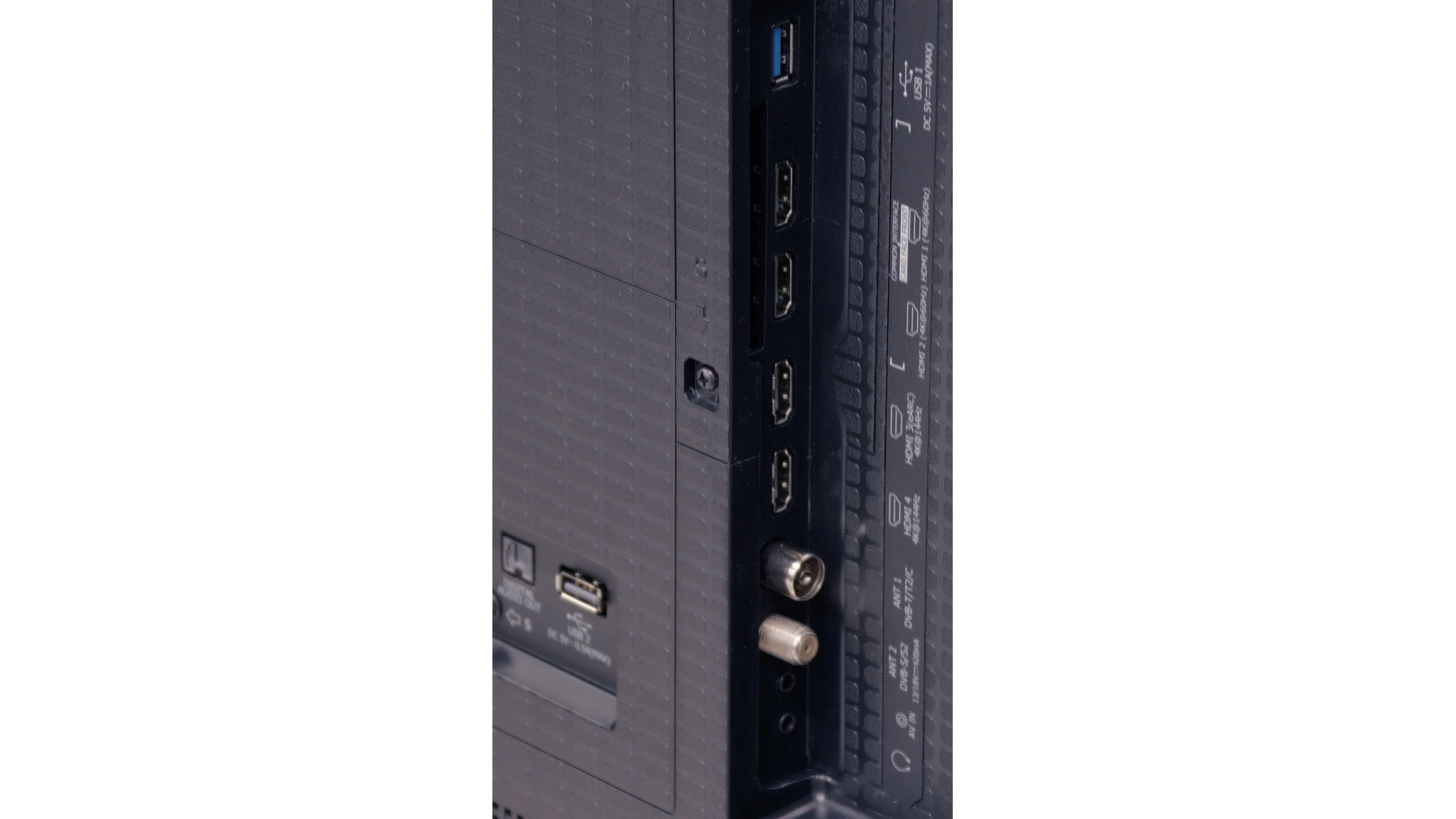
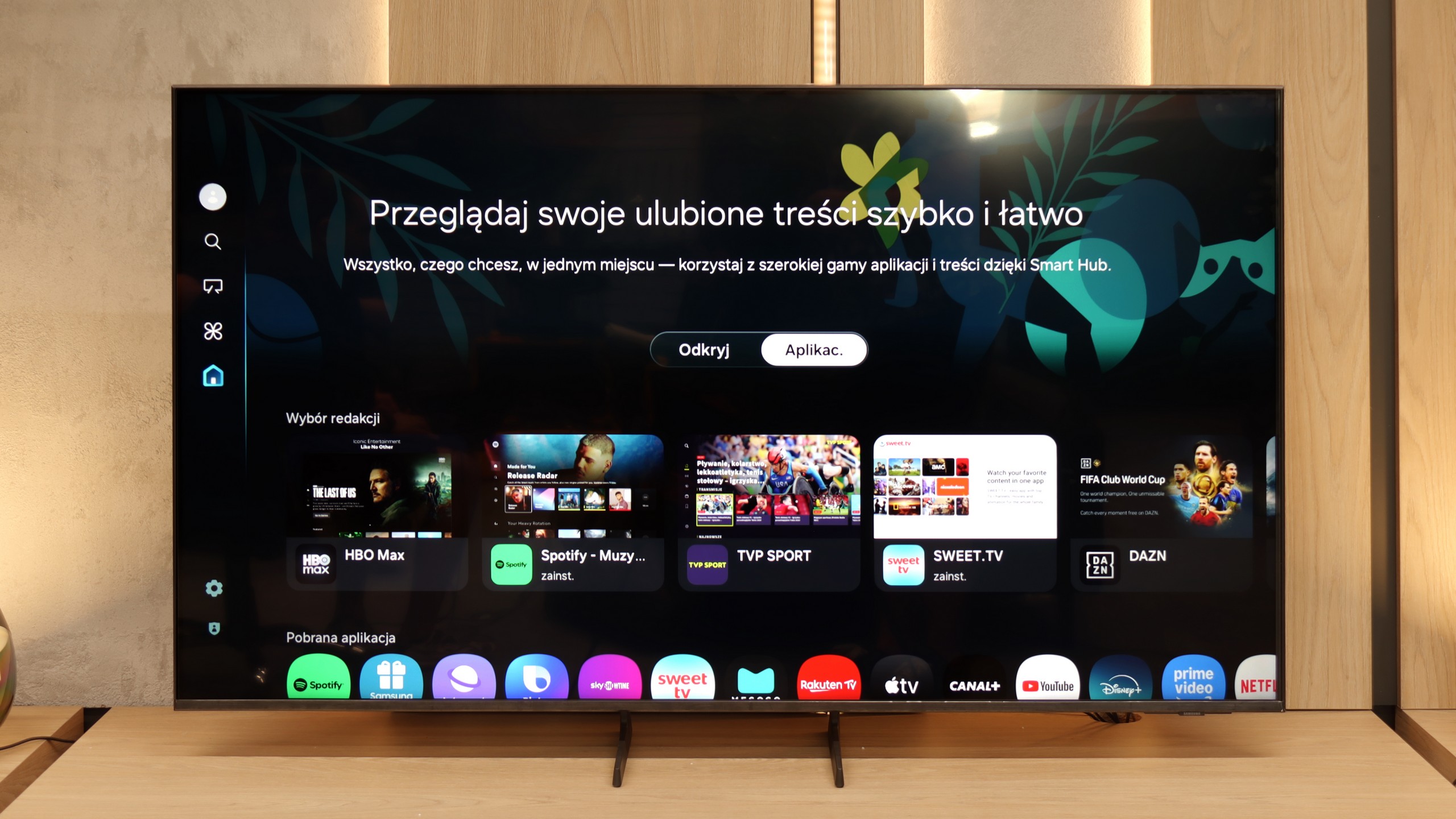
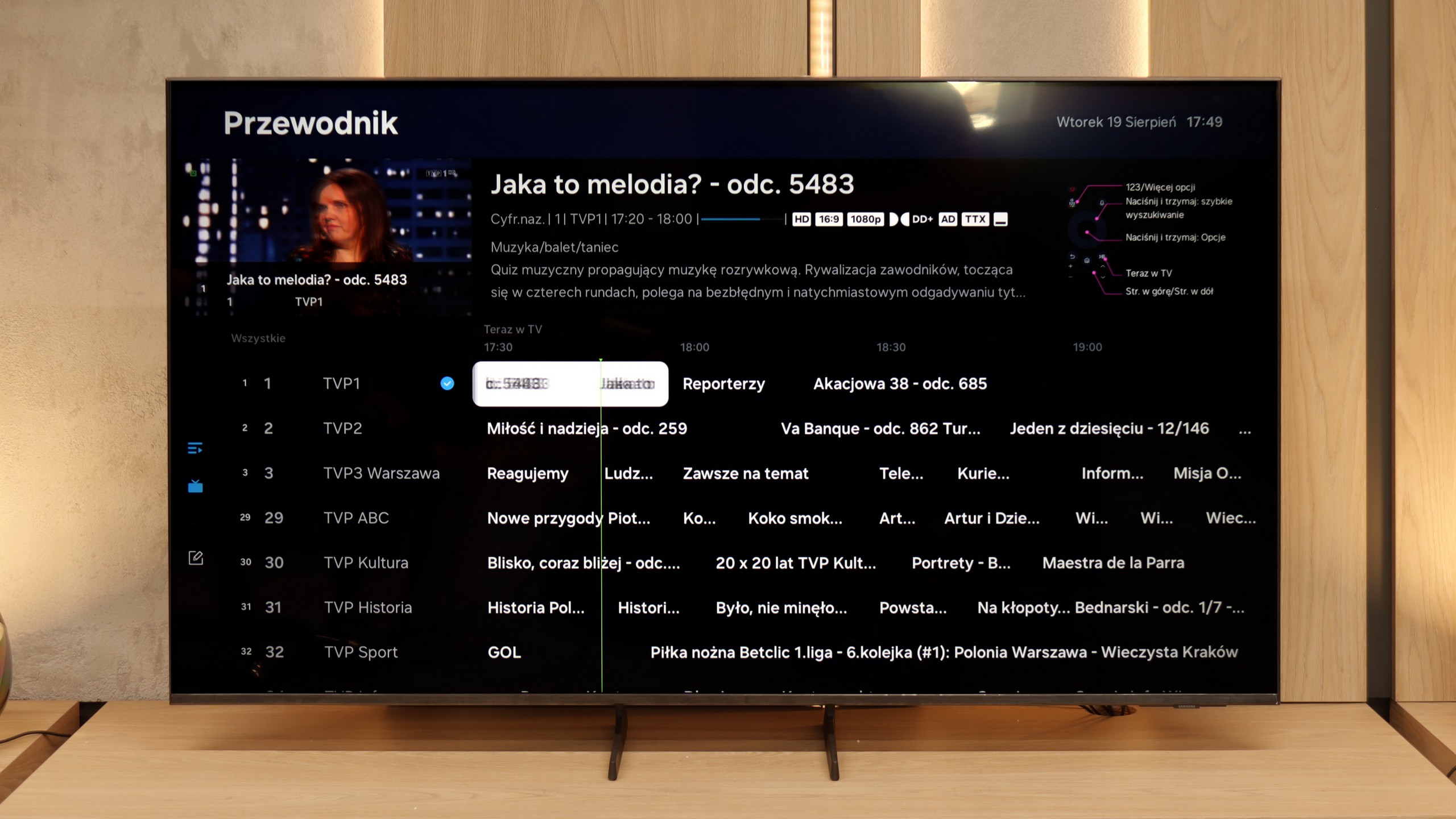
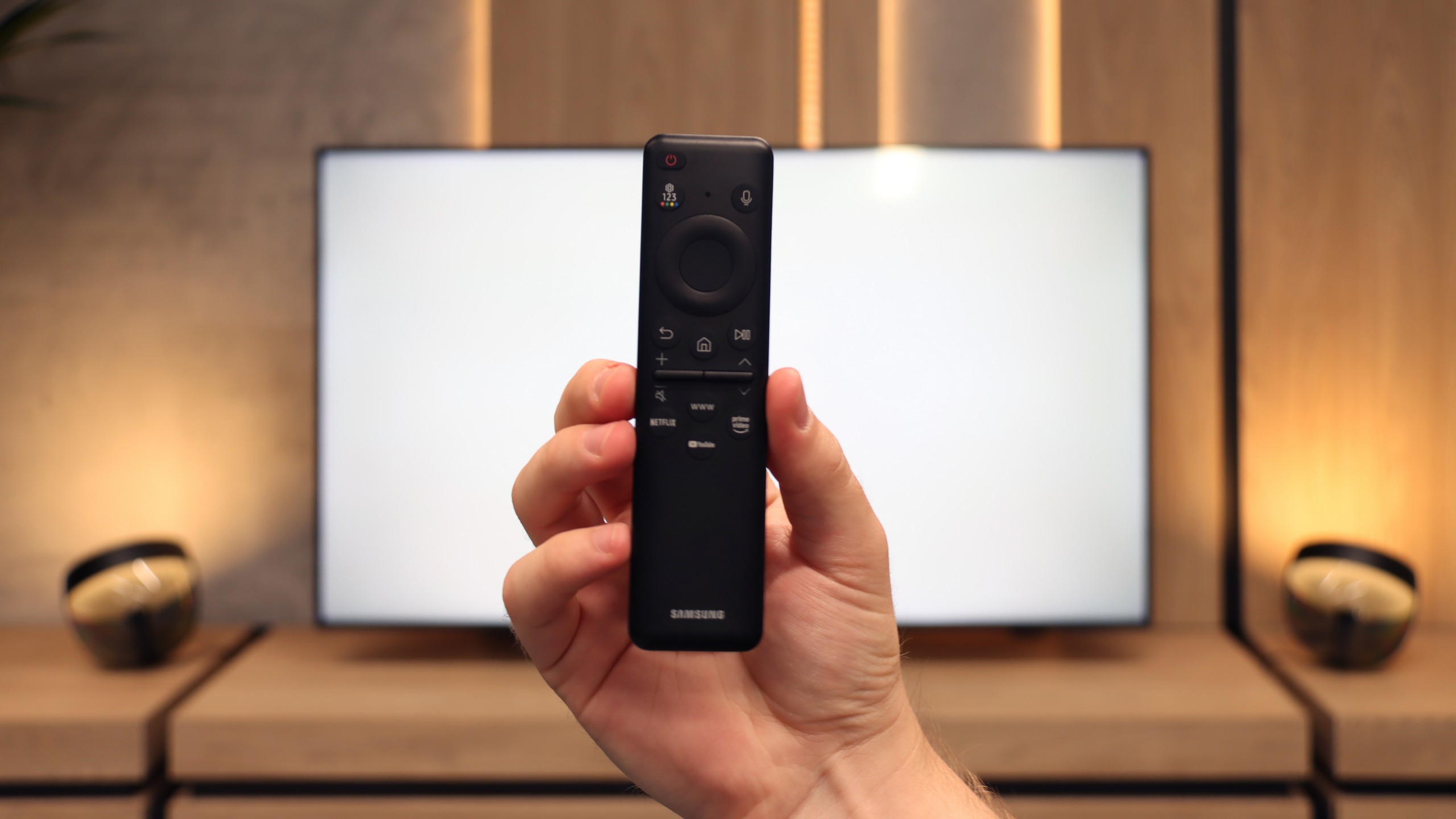
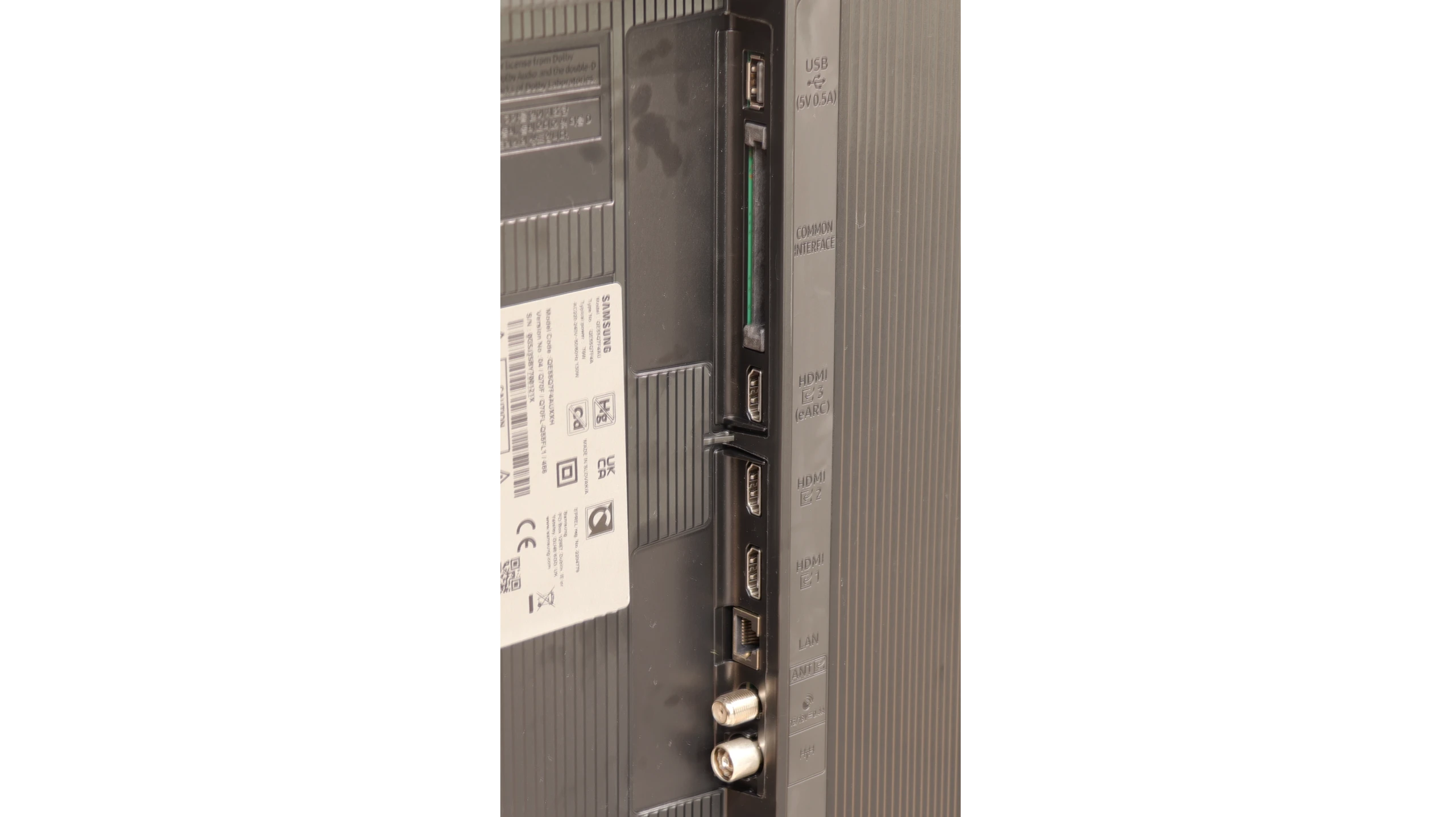
Classic features of U7Q
Hisense U7Q really has a lot to offer when it comes to classic TV features. You can record shows onto USB, easily connect external devices via Bluetooth, and the interface – such as the EPG – is clear and readable. It may sound like something that mainly seniors would appreciate, but the truth is that U7Q has practically everything needed for watching classic television. The only thing missing here is the PiP (picture-in-picture) feature.
Smart TV U7Q: Vidaa
When it comes to smart features, U7Q runs on the proprietary VIDAA system. And I must say – it runs really smoothly. Voice search in Polish? No issues at all. AirPlay and screen mirroring? They also work without a hitch. Of course, one must be aware that VIDAA is a closed system, so – as is often the case – it lacks a few popular apps, especially those related to music. Therefore, it’s worth checking before purchasing to see if all the apps you use daily are available.
Smart TV – Tizen System
Here the Q7F shows its strongest side. Samsung has been developing the Tizen system for years, and it's clear that we are dealing with a mature, refined platform. Everything runs smoothly, the menu doesn’t lag even when switching between heavier applications, and installing additional programs from the library is quick and hassle-free. Additionally, there’s full support for AirPlay, integration with voice assistants, as well as a wide range of add-ons – from cooperation with devices in the SmartThings ecosystem to the ability to control Philips Hue smart lighting or other smart gadgets. Samsung strongly emphasises expanded network features, and it's evident – in terms of Smart TV, the Q7F has absolutely nothing to be ashamed of; on the contrary, it can put to shame more expensive competitors.
Classic Features
On the side of classic, “television” solutions, it’s clear that the manufacturer has put everything on the smart card. We won’t find USB recording or PiP mode here, which were once standards. It’s apparent that the Q7F is meant to be primarily a multimedia centre, rather than a device for those accustomed to more traditional solutions. Fortunately, there are a few practical additions – we have Bluetooth for pairing headphones or speakers and an option to change the font size in the menu, which users with weaker eyesight will appreciate.
Playing files from USB
8.2/10
9/10
Supported photo formats:
Maximum photo resolution:
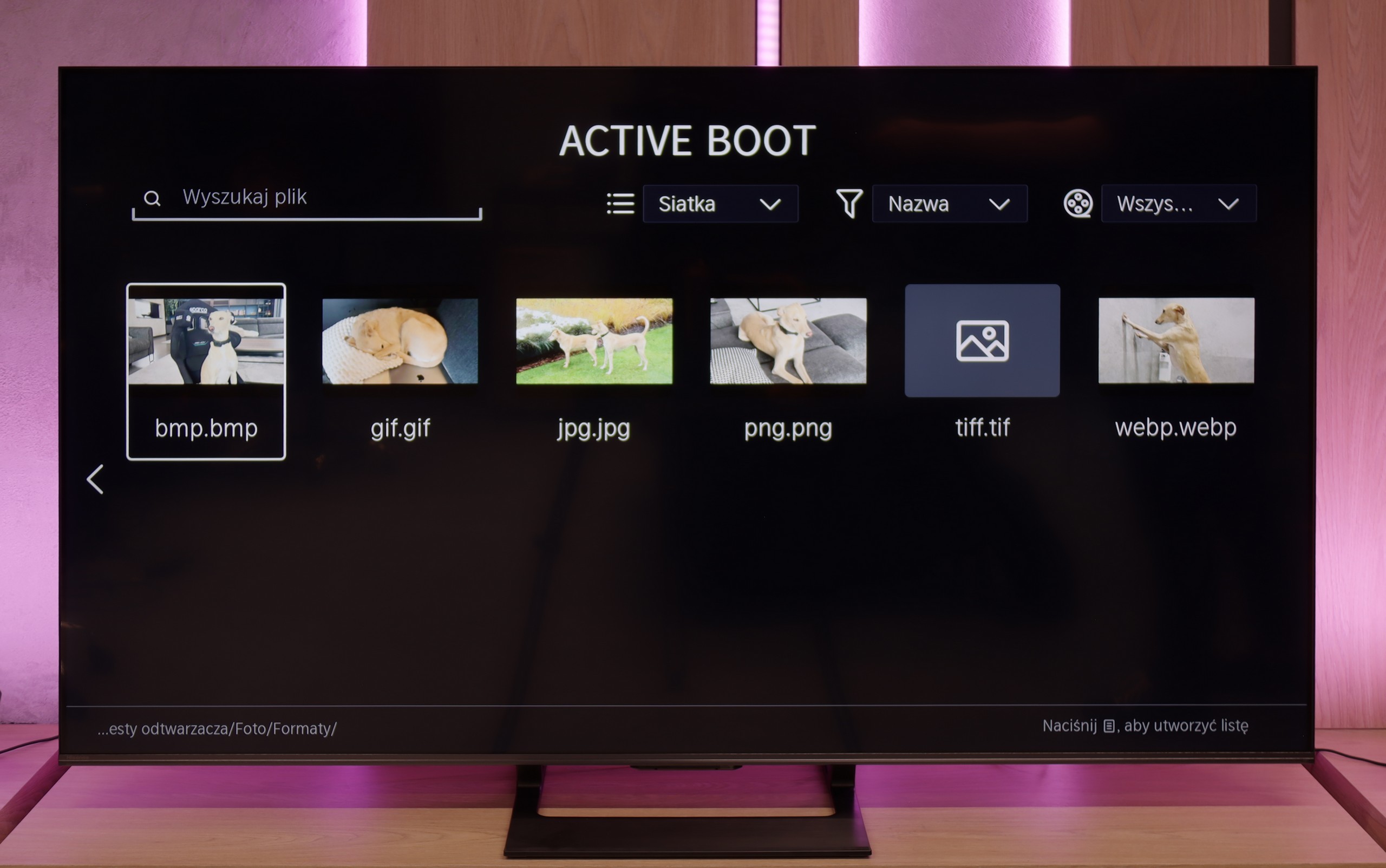
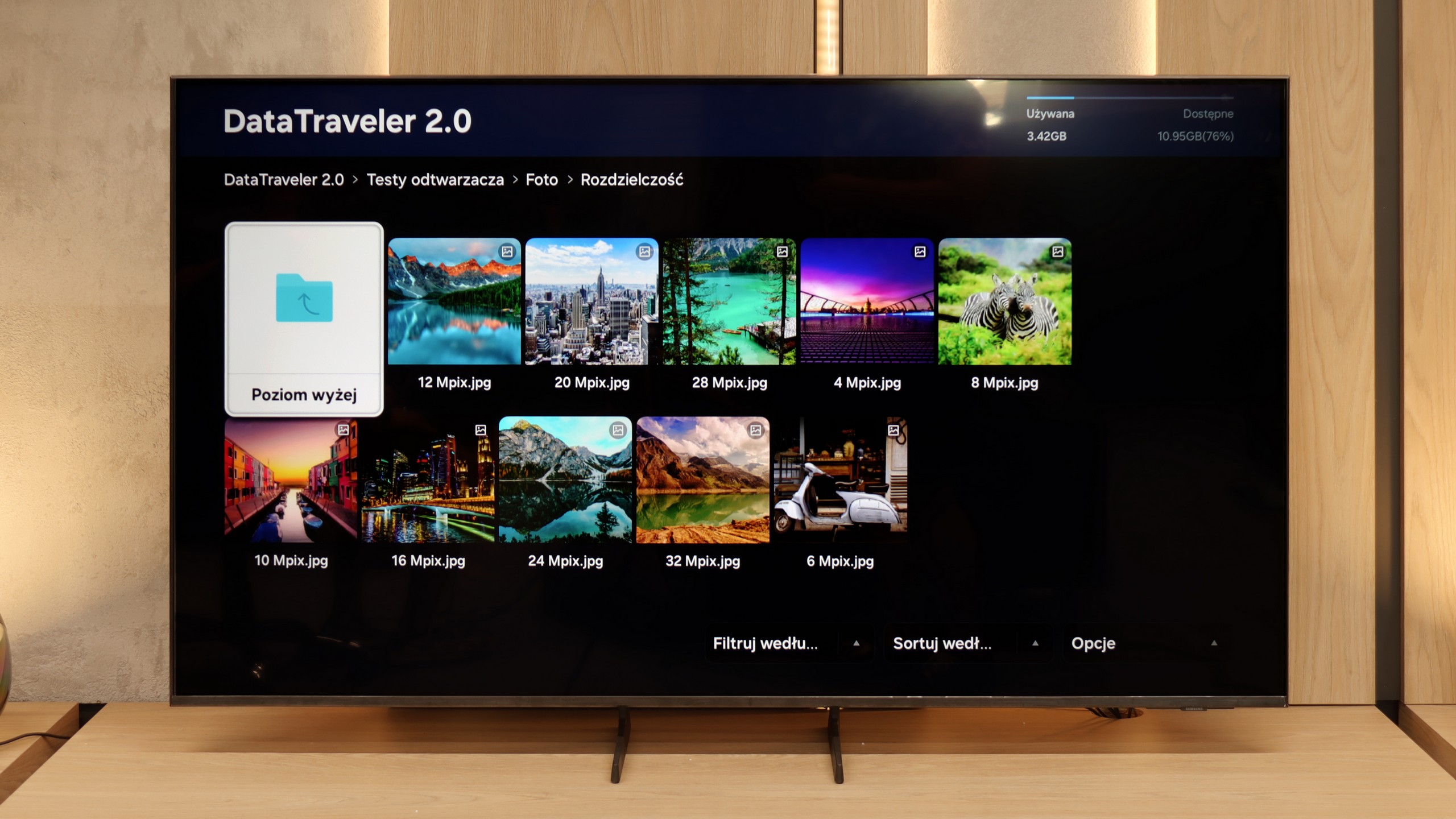
The built-in player in the U7Q completely meets the needs of most future users. The television effortlessly supports Polish characters and most popular video, audio, and photo formats. If we had to nitpick, it would only be the limited support for certain photo resolutions – there are times when files from the camera are not displayed correctly. So it’s worth keeping this in mind if you plan to show photos straight from a DSLR or phone.
In the Q7F, we have a built-in file player and, as is usually the case with Samsung TVs, it works quite well – most popular movies or music play without any fuss. For basic use, it’s sufficient and you probably won’t need to reach for external solutions like connecting a laptop. It’s a different story if someone wants to upload photos – it can struggle here, especially with Apple’s HEIC or PNG, which are visible in the player menu but don’t necessarily want to work.
Apps
7.7/10
8.7/10














































Sound
7.2/10
5.8/10
- Maximum volume82dB80dB
- Dolby Digital Plus 7.1
- Dolby True HD 7.1
- Dolby Atmos in Dolby Digital Plus (JOC)
- Dolby Atmos in Dolby True HD
- DTS:X in DTS-HD MA
- DTS-HD Master Audio
Sound is one of the biggest advantages of the U7Q. The TV plays really nicely – there's a slight discernible bass, good tonal balance, and it's definitely more than just for "casual news watching." You can easily play music on it and just sit back and enjoy the sound – of course, in an entertainment sense, not an audiophile one 😉. A big plus is also the full support for the most important audio codecs, which worked flawlessly. The only exception is Dolby Atmos in TrueHD format, which didn’t fully work when connected to the home theatre, so if someone uses that format – it's worth keeping in mind - perhaps it's a software glitch.
Samsung Q7F has a speaker set with a power of 20 W and… well, let's not kid ourselves, it's not a revelation. The TV itself sounds quite decent, meaning series, news, or daily programs are clearly audible, dialogues are not lost, but there's a significant lack of depth or sound space. There's practically no bass; something thuds, but it resembles tapping on a box more than real low frequencies. Music sounds flat, films also don't leave a strong impression – you won't feel like you're in a cinema. It's a sound in the "acceptable" category, just to have something built-in, but if someone is hoping for a stronger experience, they'll end up reaching for a soundbar sooner or later. And to be honest – even the simplest model will make a noticeable difference, and Samsung has quite a few of those on offer.
Acoustic Measurements
82dBC (Max)
75dBC
80dBC (Max)
75dBC


